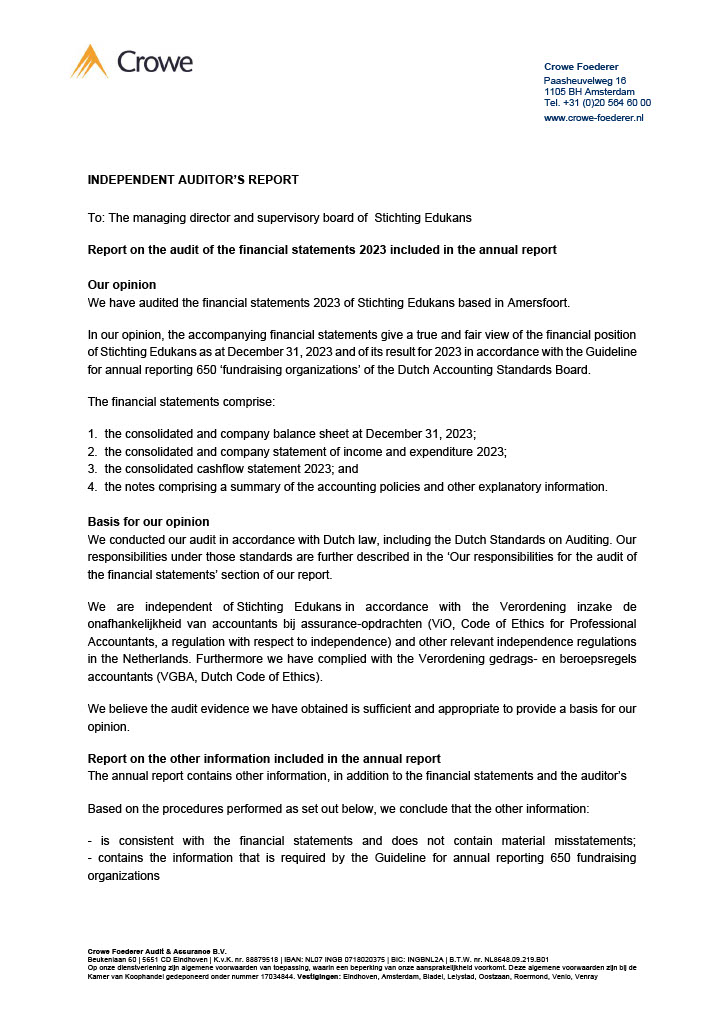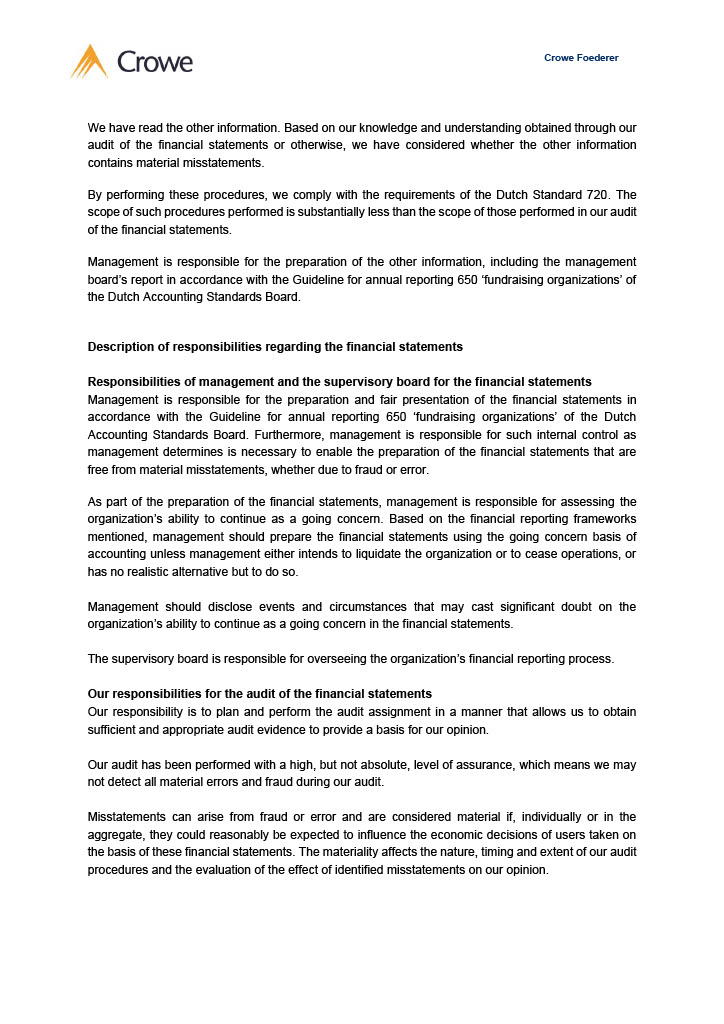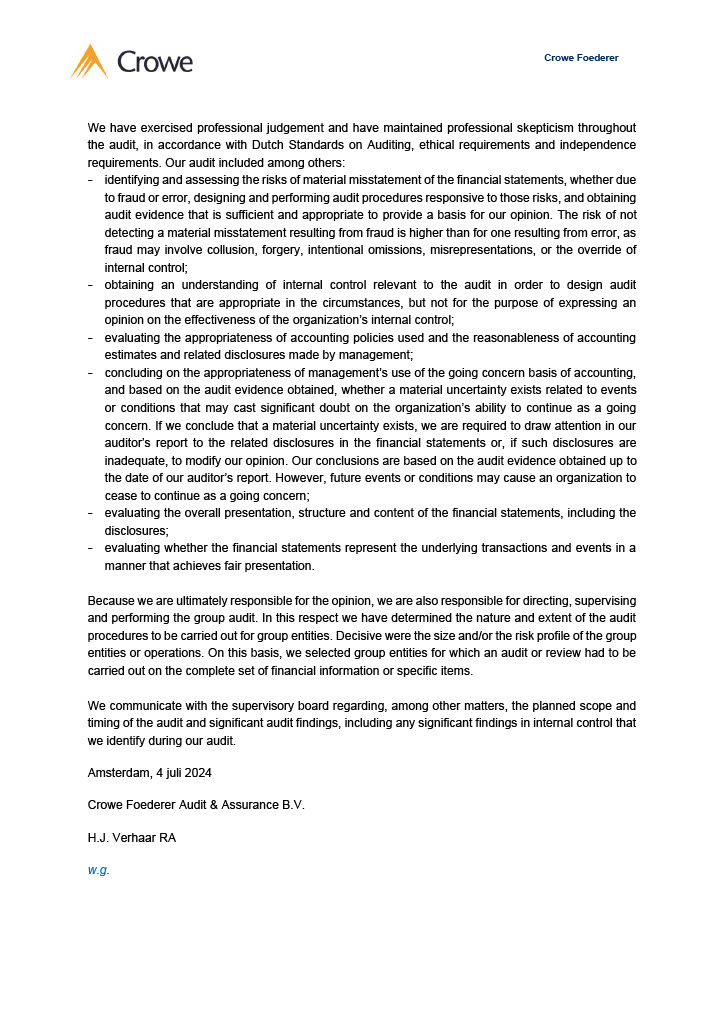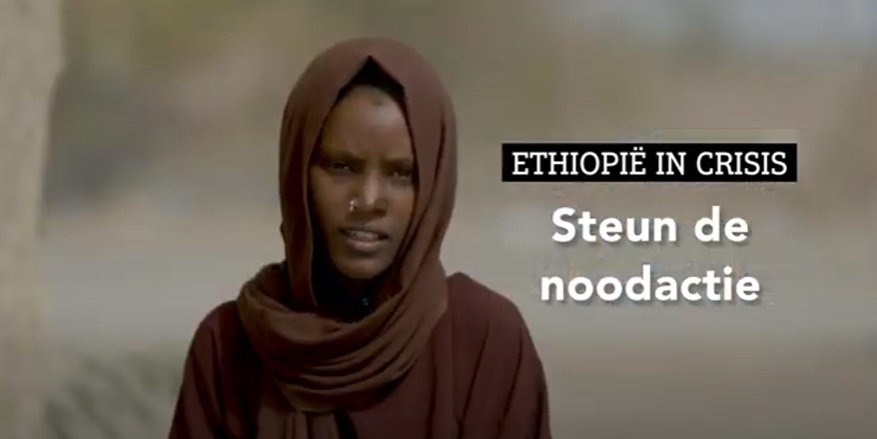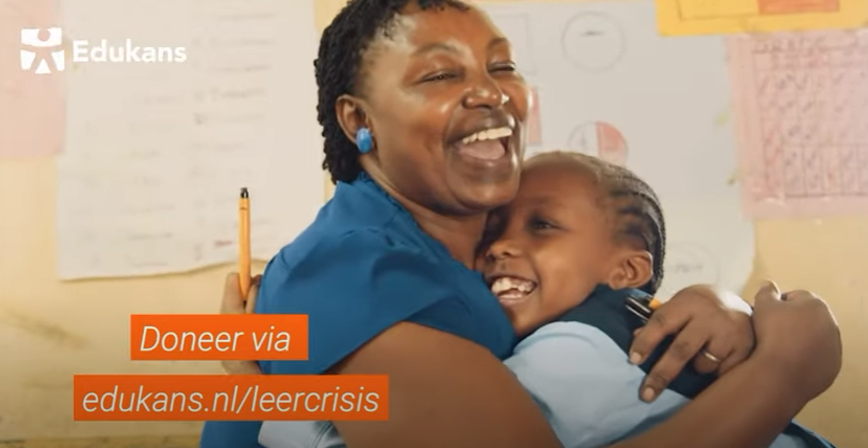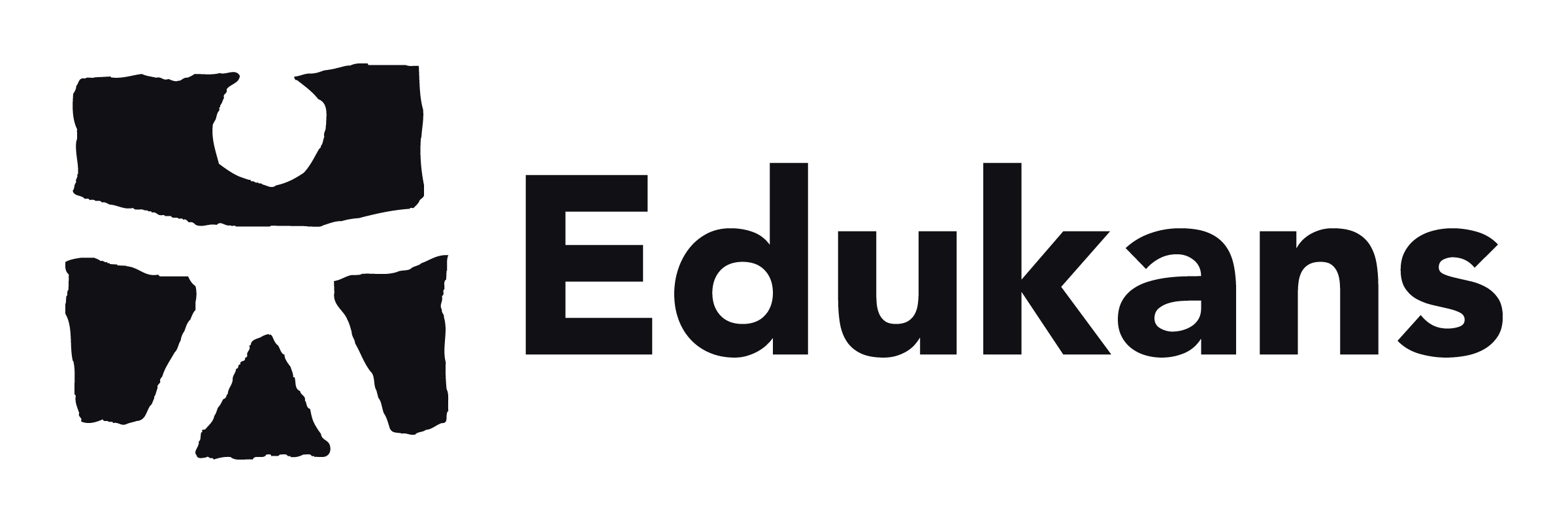Annual Report Edukans 2023
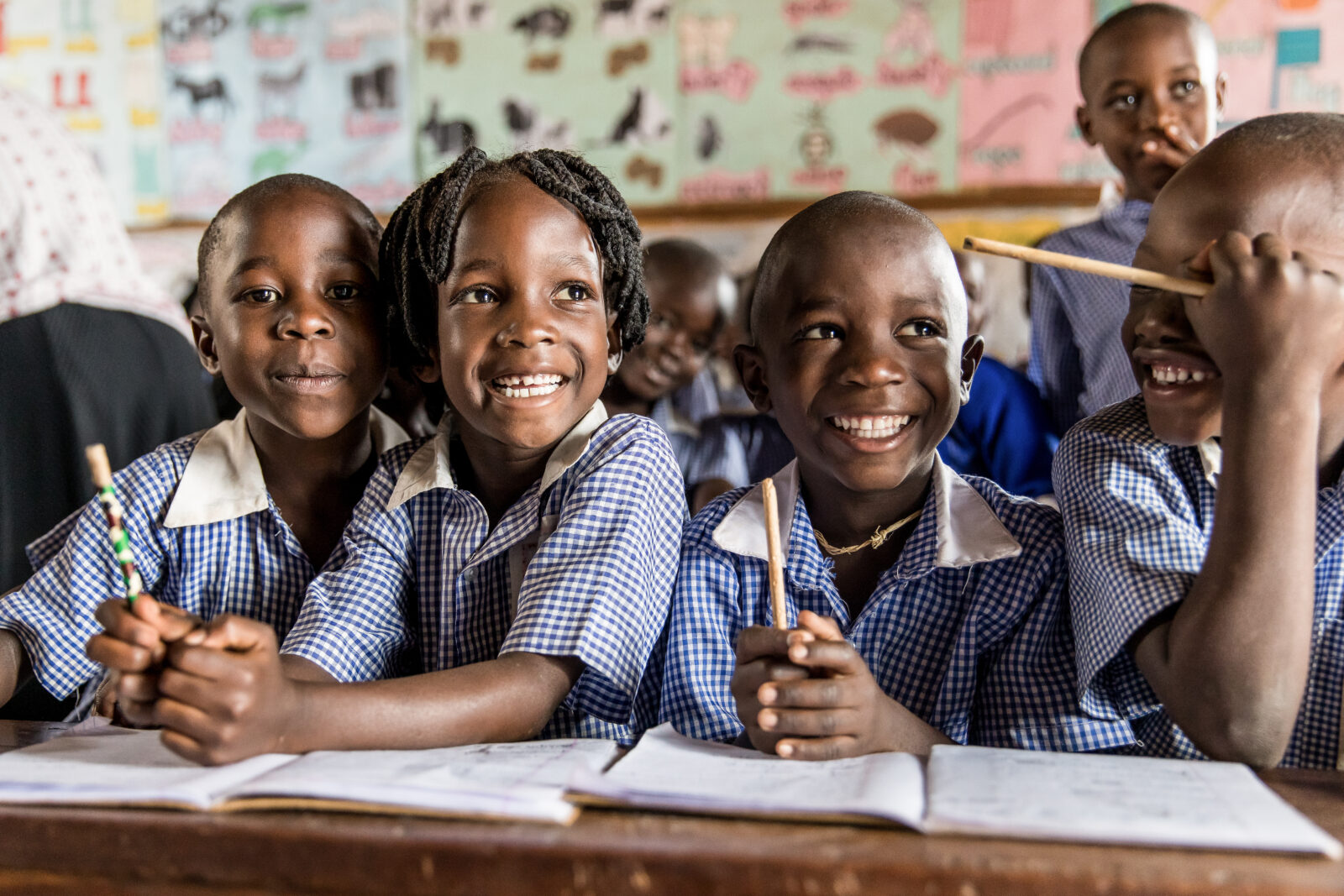

Message from our executive director
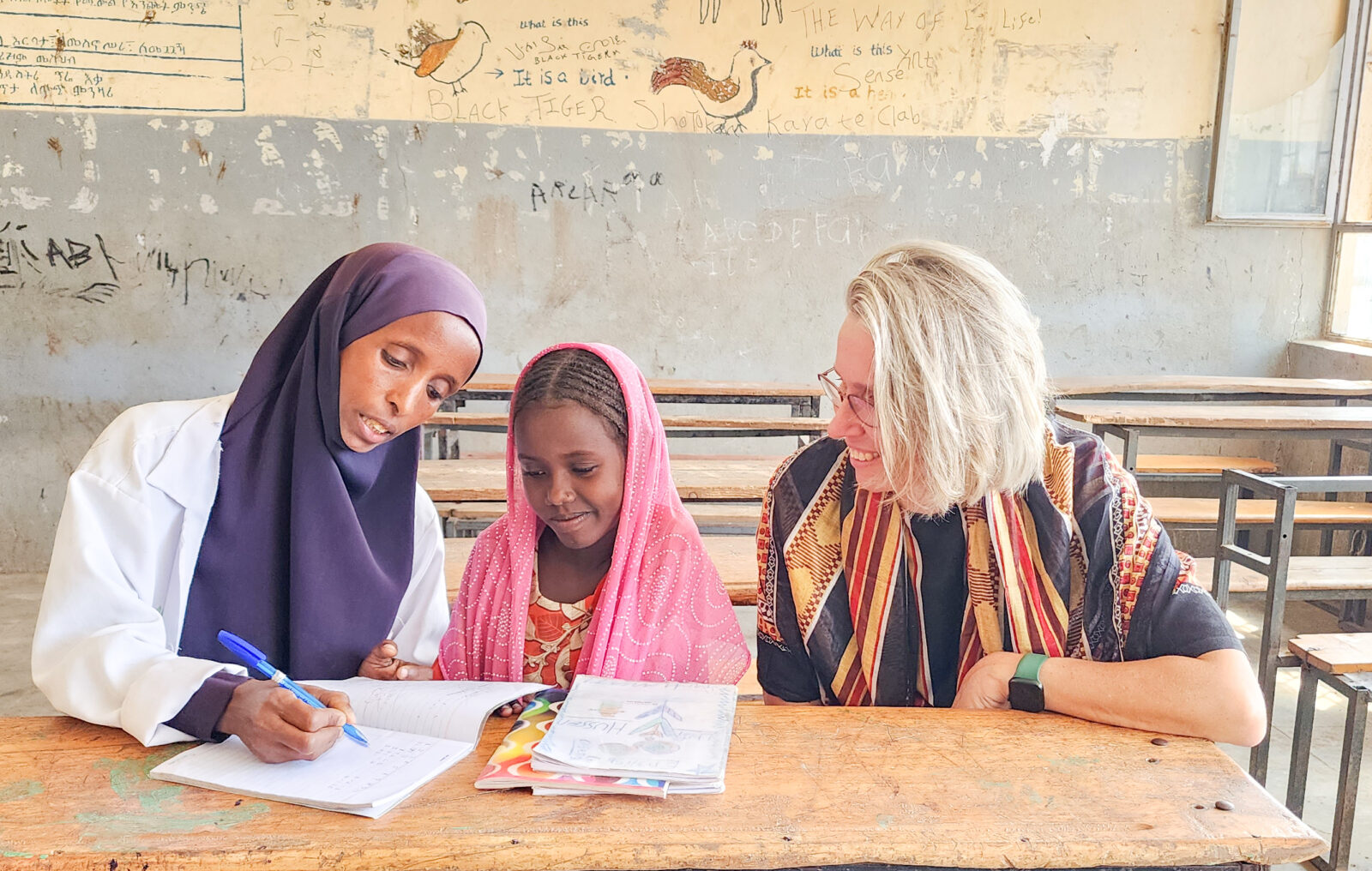
Message from our executive director
Message from our executive director

Education is the powerful key that unlocks the door to freedom and peace
Education is key to accessing other human rights and helps lift people out of poverty. It empowers children and young people with the necessary knowledge, values, attitudes and skills to become agents of peace and to shape their future with confidence.
2023 has been a year full of complex challenges affecting the lives and freedom of many people, including children and young people. No matter what happens, every child has the right to good quality education.
Worldwide 250 million children still do not go to school and there is a shortage of 44 million teachers. Many young people suffer from prolonged and systemic unemployment and the prevailing mismatch between education, skills and labour market demand. If we continue at this pace SDG Quality Education (4) and Decent Work and Economic Growth (8) will probably not be achieved for another half a century, and certainly not by the target date of 2030. For young people to thrive in this new era quality education will play a key role.
Edukans and partners take on the challenge to turn the tide. We will continue advocating worldwide and at national level to put quality education (higher) on the agenda.
Education is the most powerful engine for progress. Edukans is committed to Unleash the Power of Education. Our worldwide mission is to create opportunities, enabling children and young people* to shape their futures with confidence. When living in Uganda, I had the privilege of experiencing how powerful education can be for children, adolescents and their families. Going to school is so much more than learning how to read, write or do mathematics. It is also about forgetting your daily worries and learning to make friends. And about young people grasping the opportunity to learn technical and life skills, so that they can start a small business, giving them the opportunity to take their future into their own hands.
We serve children and young people by providing our experience and expertise in the improvement of education on a structural level. Edukans is committed to improving the quality of education through four programmes: Basic Education, Skills for Work and Life, Education in Emergencies and Exchange.
In April 2023 Edukans, together with VSO and Randstad, organised the conference ‘ConnectionWorks!’. The conference was all about establishing social connections that work. Together we want to create impact at scale and close the gap between the potential and aspirations of young people, and the decent jobs and skills training that are needed for the future labour market in African countries.
I strongly believe in collaboration and social connections. We achieve more through collaborations with our partners across the world and by involving governments, donors, international and national partners, and the private sector in Edukans programmes. We strive to create an optimal learning environment by supporting teachers in enhancing their pedagogical skills, assisting school management, and involving parents and the wider community. It is great to see teachers become stable factors and role models for children and young people. We are enabling young people acquire valuable skills and find their voice, with the ambition of helping a new generation to work towards a sustainable and equal future.
* Children in our Basic Education programmes are between 4 – 18 years old.
Young People in our Skills programmes are between 18 – 35 years old.
In 2023 we continued to establish new partnerships and deepened existing relationships. We believe in long term partnerships going beyond projects. It has also been a year of thorough reflection on our role as an INGO working in a turbulent environment due to new geopolitics. To thrive in this new era, Edukans needs to adjust her way of working and strategies, adapting our role as an international organisation. We have adjusted our programmes and funding strategies to align with the rapidly changing global and national environment in which we work. The development of our borderless governance and organisation is taking shape and colleagues are working together on the design and implementation of our education and operational services. This has led to us reaching more children and young people with less projects. It requires patience and perseverance, since these transitions and establishing new partnerships take time.
During my visits to Malawi, Kenya and Ethiopia, the invaluable work of Edukans became clear through meetings with the Ministries of Education and many encounters with partners, school leaders, teachers, and communities in the respective countries. And especially by seeing how children flourish in class as a result of active learning and growing their self-confidence. It was a joy and privilege to see them being a child again and to see them having fun and laughing with each other.
I had the opportunity to work with our colleagues in Afar in Ethiopia, where our staff is working in harsh conditions to provide education and learning support to children and young people in emergency settings. What touched me most was a visit to a small village in a deserted and very hot area. There was no school nearby, and the community had saved together to build their own learning centre to give their children an opportunity to learn.
Through our comprehensive education approaches we ensured that 701,787 children and young people, of which 56,302 are in emergency situations, could embrace their right to learn. I am incredibly proud of all the children who have overcome many challenges to go to school. And I am proud of all the young people who have overcome challenges, developed their skills and have found a way to generate their own income. I am also proud of having reached 19,504 teachers. They were equipped with the competencies to improve the quality of education. Thanks to all the teachers for making the difference in the lives of so many children and young people.
Thanks to the generous donations of our partners and donors, and through our joint efforts, we have made high quality education possible for them. All these results we have achieved together. They were made possible by the contribution of every staff member, through excellent cross-border teamwork.
Warm regards,

Petra van Haren, CEO Edukans
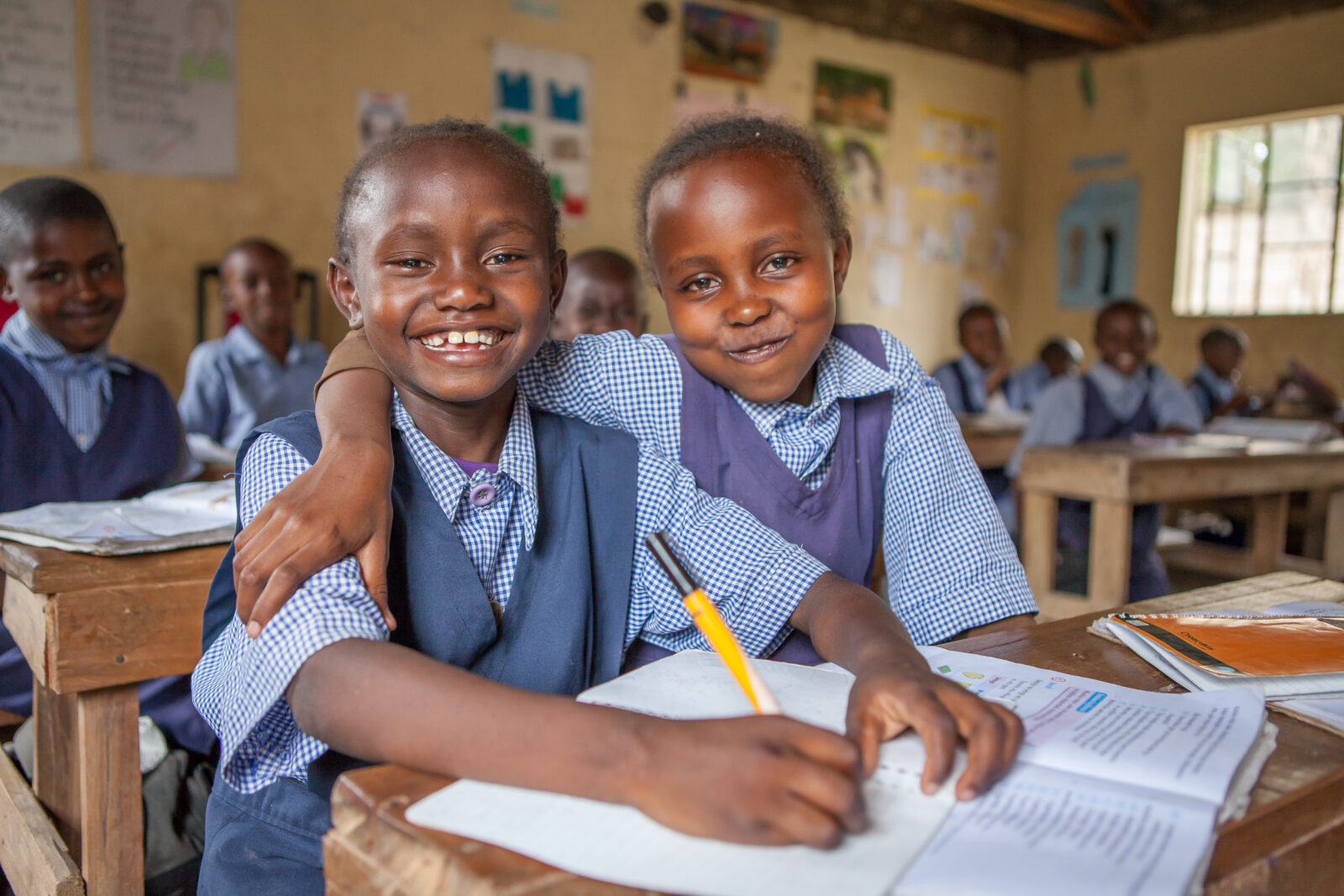
What did Edukans achieve last year?
Our results in 2023

Our results in 2023

Intro
This data reflects only direct results of programming over the past year. By working at the systems strengthening level, working with training institutes and master trainers, our interventions actively enhance teaching capacity that strengthen an active and inclusive learning environment. We aim to support interventions with a strong trickle-down effect that spans multiple years, therefore benefitting institutions and beneficiaries beyond the year of implementation. The data presented demonstrates the number of direct beneficiaries of our programming, meaning those that have directly benefited from programme activities. We reach more children and young people as a result of the trickle-down and multiplier effect.

Total reach:
701,787 children & young people
received improved quality education
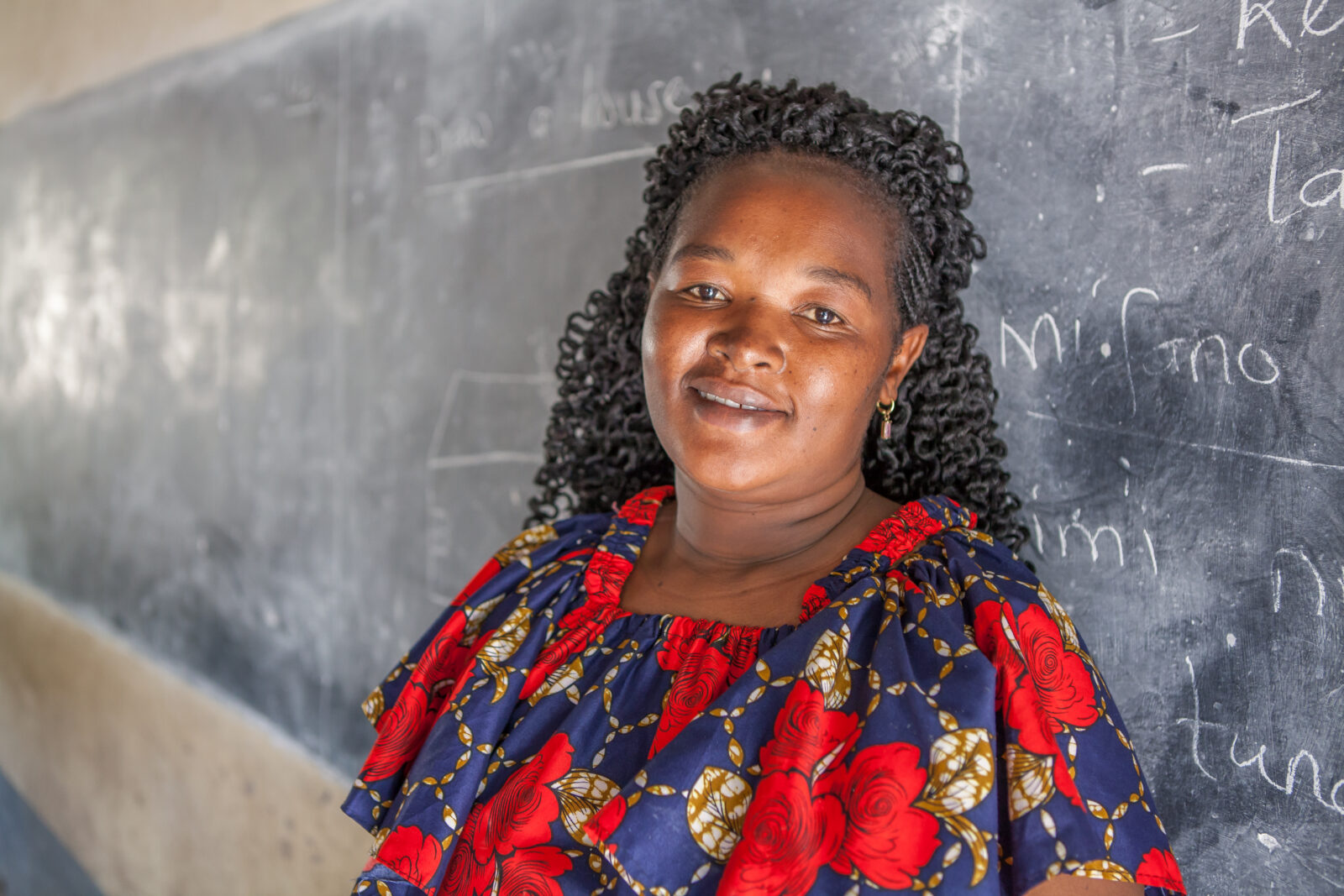

Total reach:
19,504 teachers
were equipped with the competencies to improve the quality of education
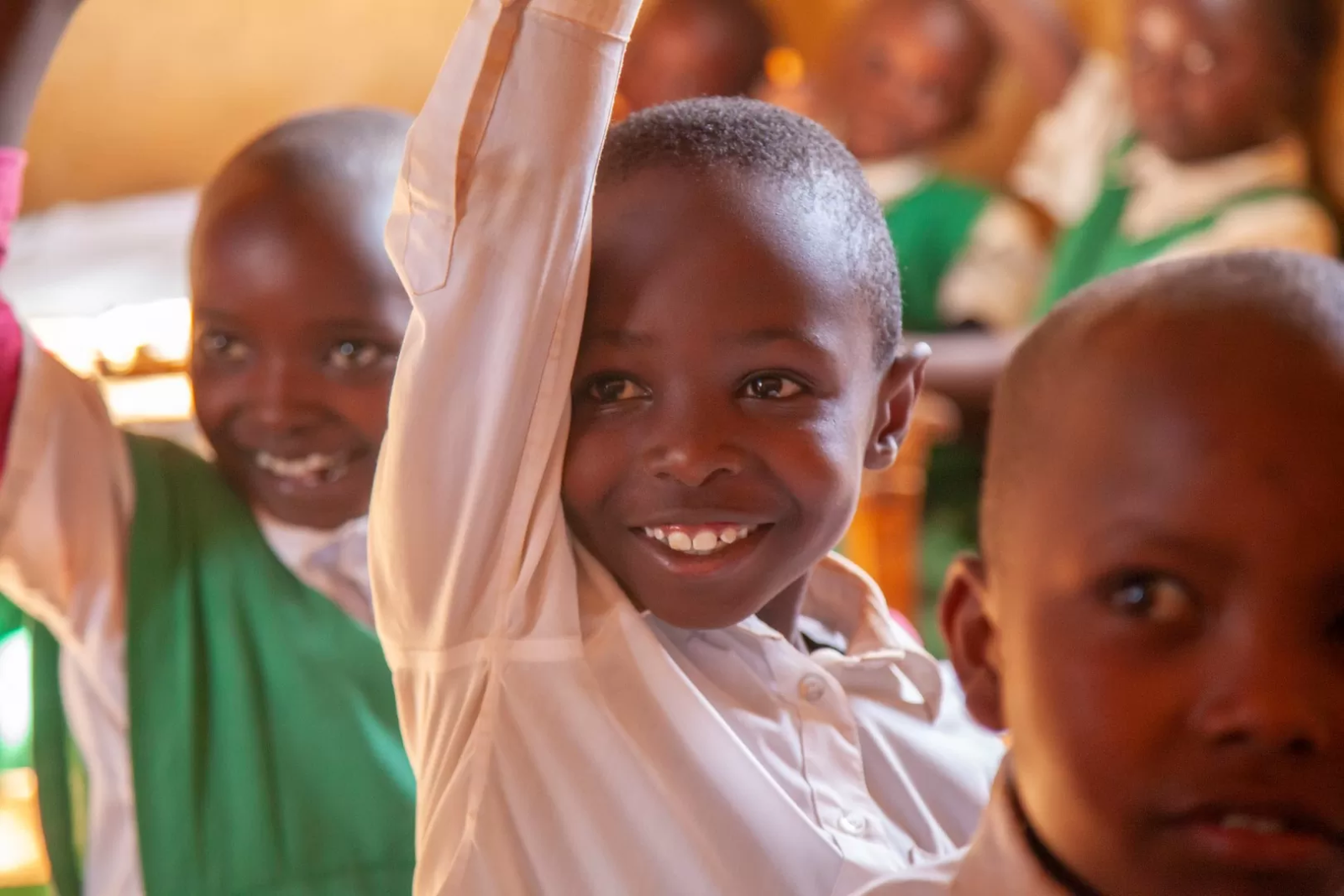

Basic Education
625,164
children received improved quality education

Basic Education
17,077
teachers developed their pedagogical skills

Basic Education
2,455
Star Schools improved the quality of education for learners and teachers

Skills for Work and Life
13,973
young people developed their skills in preparation for work and life

Skills for Work and Life
374
teachers were equipped with the competencies to teach life skills
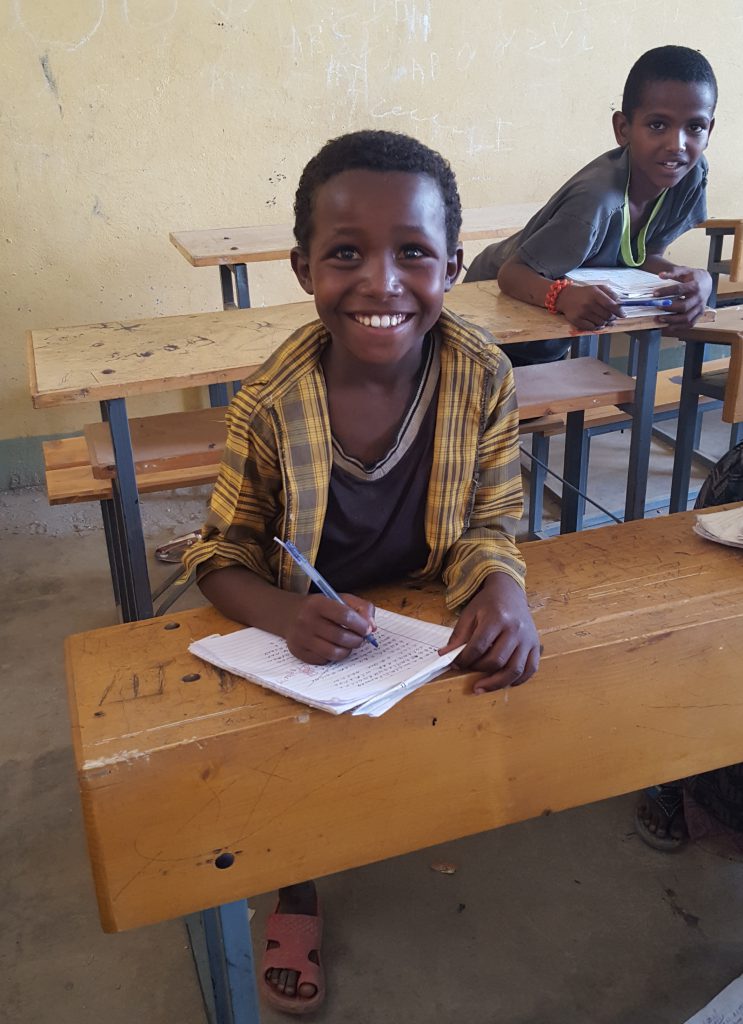

Education in Emergencies
56,302
children and young people received quality education in emergency situations

Education in Emergencies
1,740
teachers were trained in child-centred pedagogy and learning and behavioural difficulties

Exchange
6,348
young peers and 313 educational staff from the schools were reached via the Edukans Exchange programmes

Going Global 2023 brought together
3,285
pupils from the Netherlands and Uganda

Edukans Kenya hosted
38
World Teachers from the Netherlands during a useful cross-cultural experience

We established long term relationships and
strategic partnerships
with national and global partners
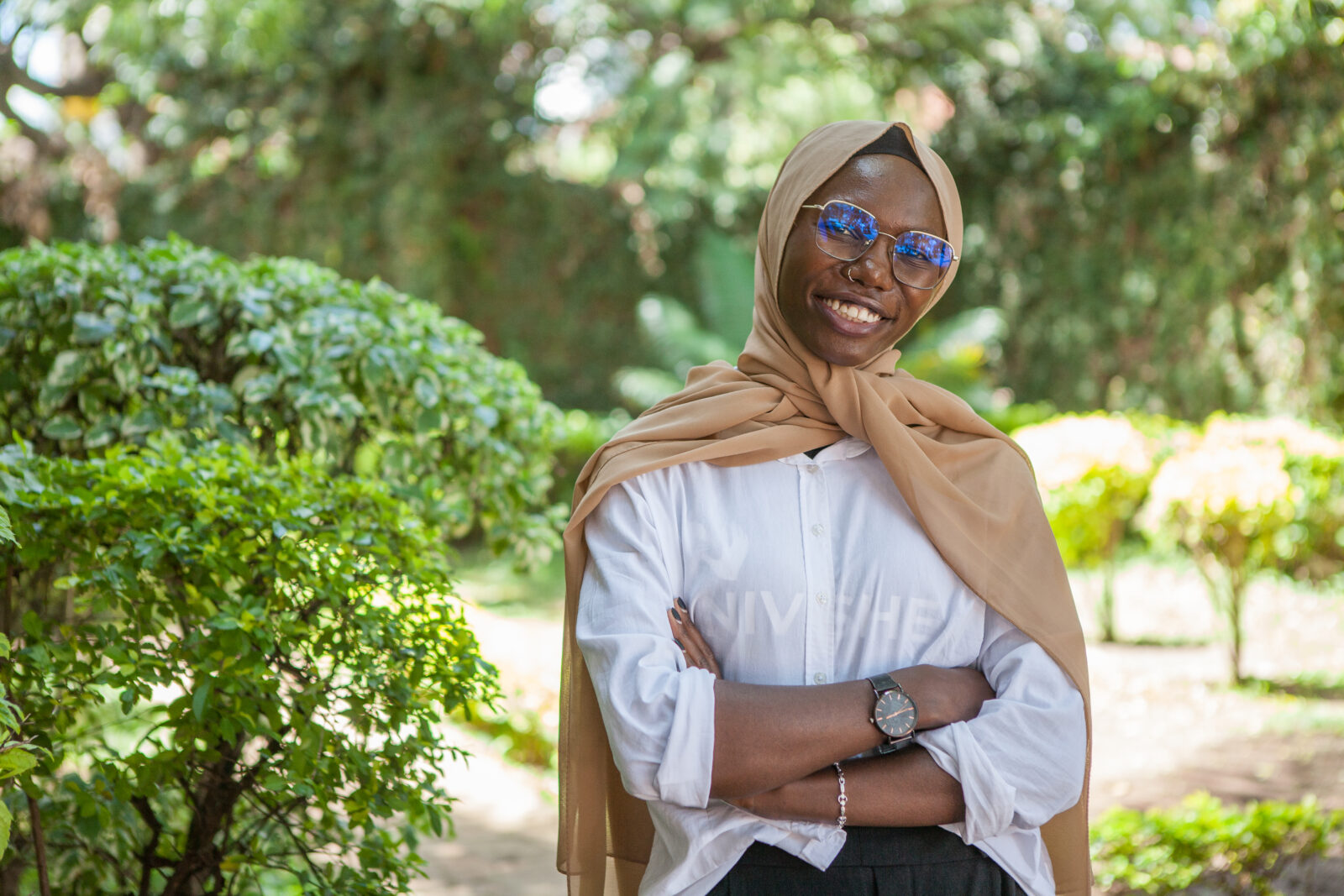
We are a
member
of numerous global and national networks: Goede Doelen Nederland, GCE, Philae, Partos, PerspActive, KROS, INGO networks

We have worked on
31
projects
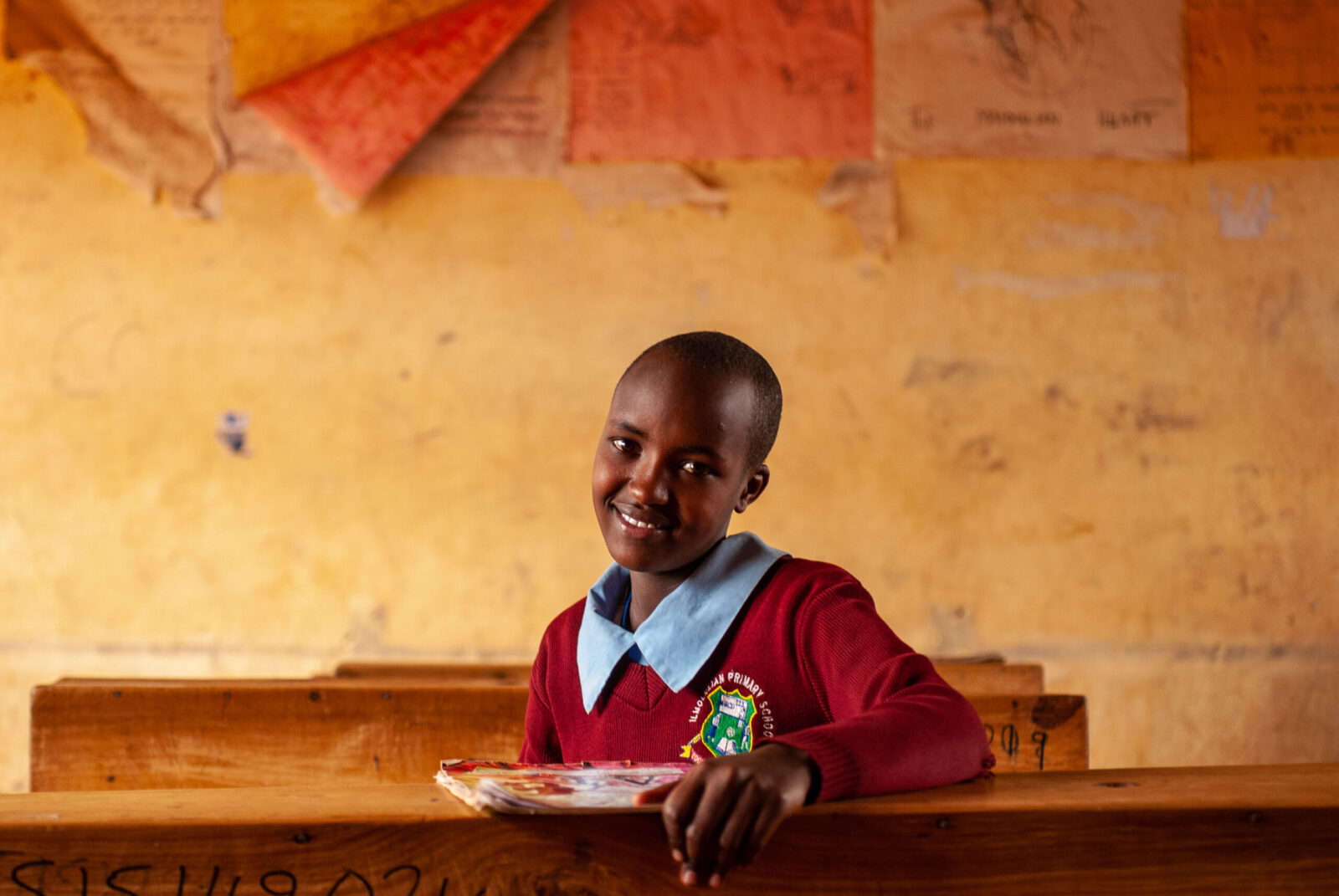

We have worked in
8
countries
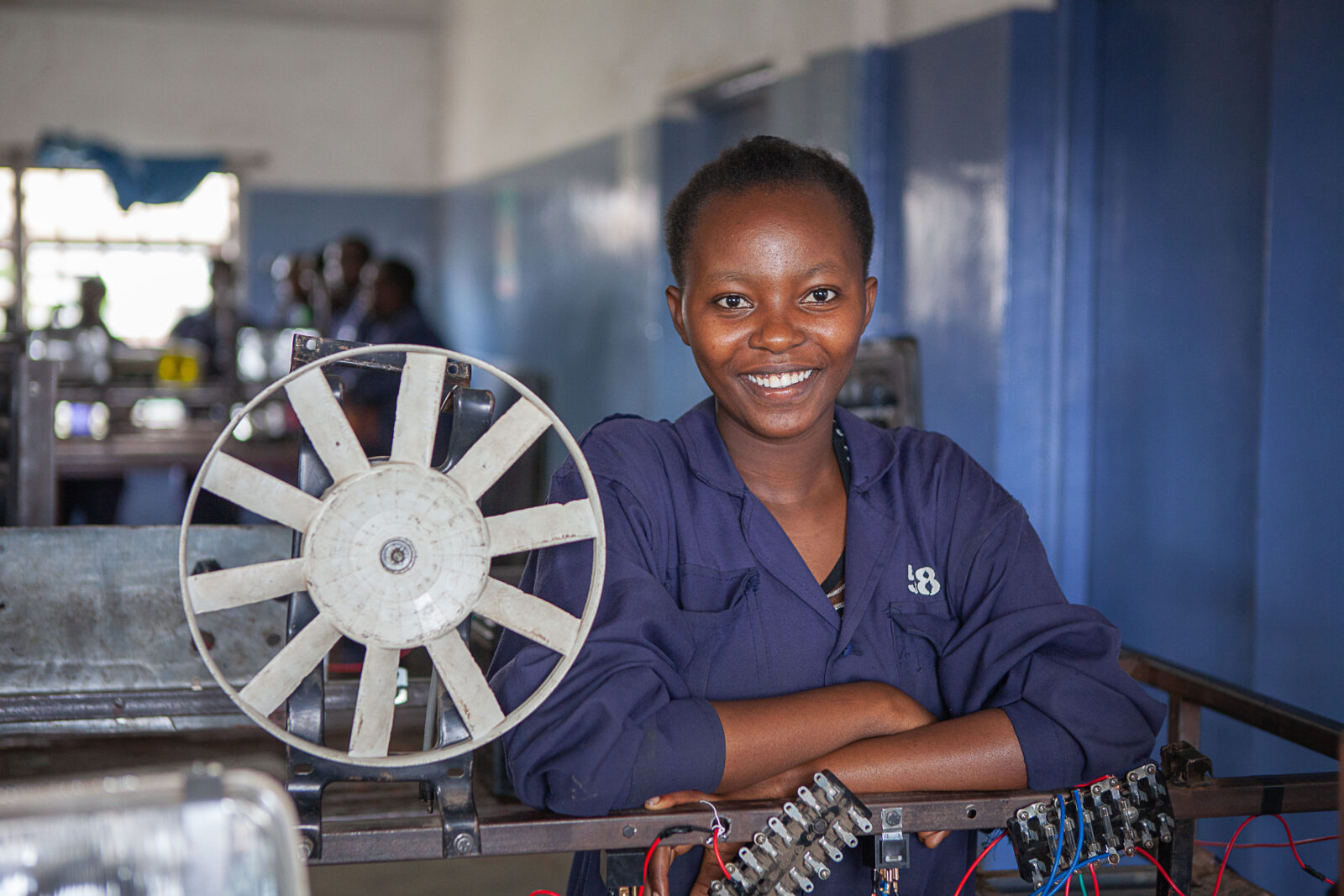

44,077
individual donors
Total income from fundraising:
€6,459,662
Total spending:
€7,087,527
On objectives
€5,432,708
On fundraising
€1,200,694
Management and administration expenses
€454,125
Visualisation of our work:
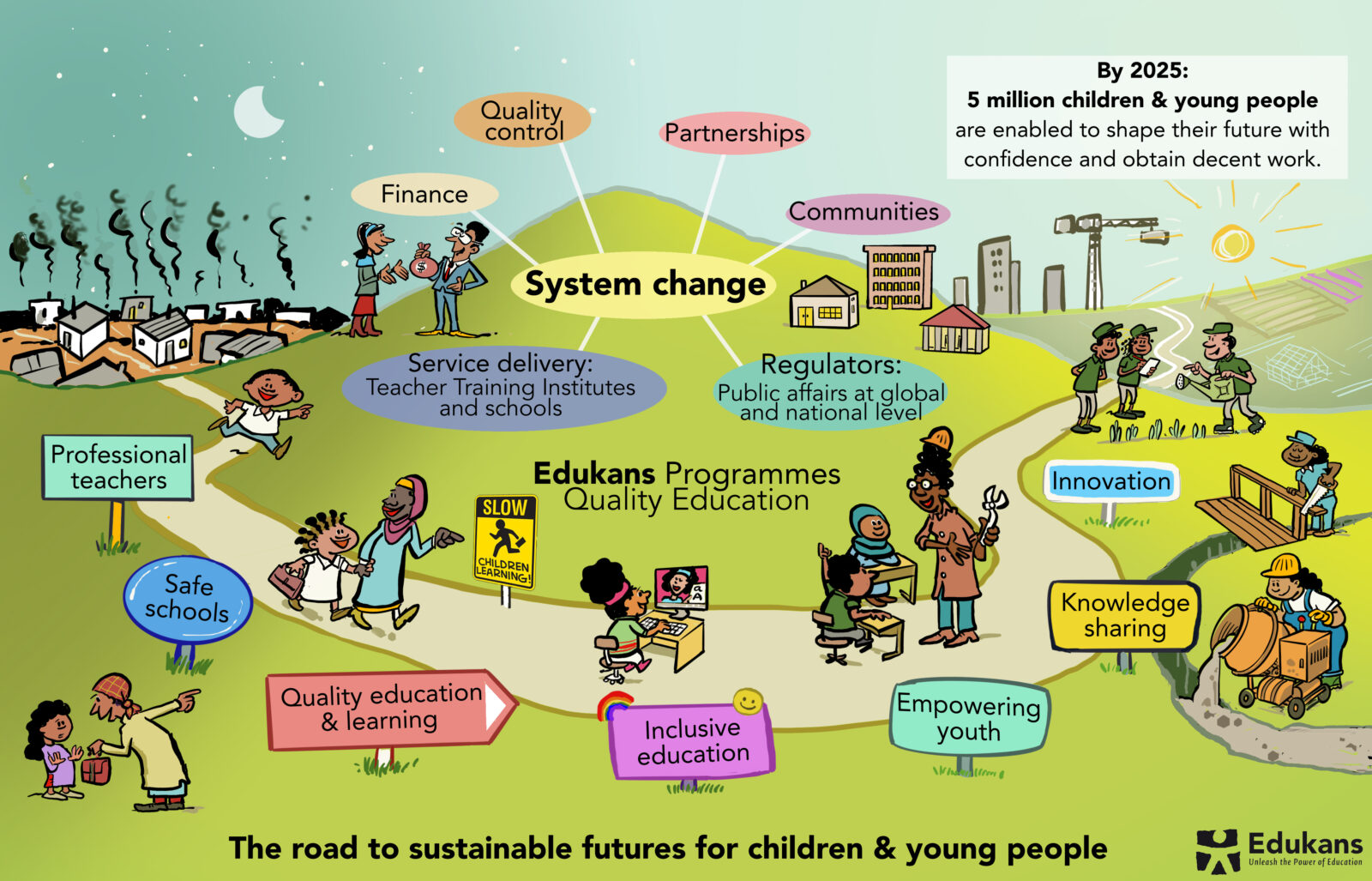
Conclusion
In 2023 we aimed to reach over 1 million children and young people. Due to a limited availability of financial resources available for education, our ambition to start new projects and reaching over 1 million children and young people through our education programmes has not been fully realised in 2023.
However, through our projects implemented in 2023, we have realised good results in terms of children we have reached and especially in the quality of our results.
Through scaling of our interventions and the trickle down system our reach goes far beyond the direct trainees. In the coming years we will focus even more on embedding our methods in the national education systems.
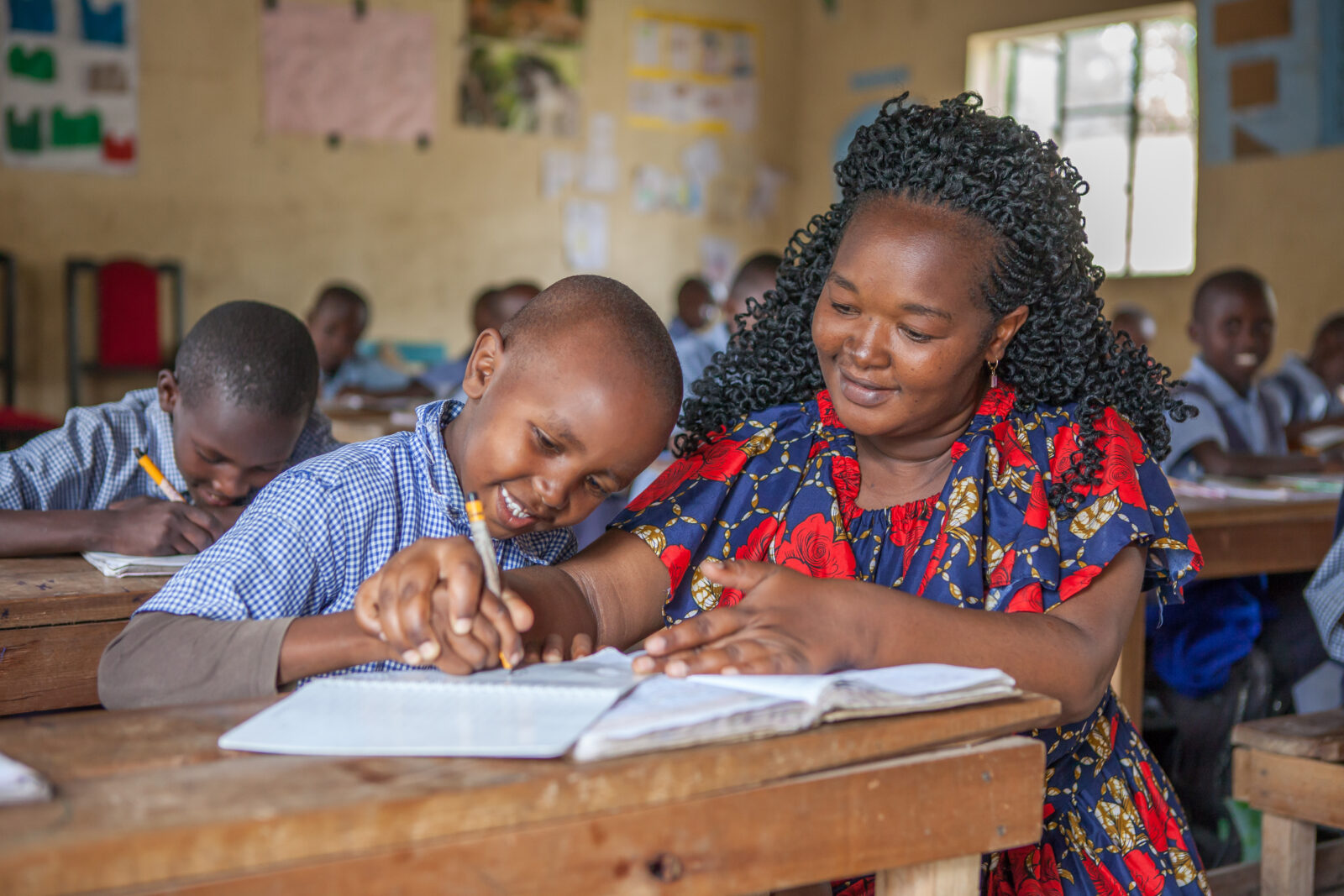
Why do we do what we do?
Navigate to
- 1.1 Our mission
- 1.2 Our challenges
- This is Edukans video
- Edukans and the Sustainable Development Goals
- 1.3 Our approach
- Edukans Theory of Change
- Diversity, gender equity and social inclusion in our programs
- Approach: Basic Education
- Approach: Skills for Work and Life
- Approach: Education in Emergencies
- Approach: Exchange
1. Unleash the Power of Education

1. Unleash the Power of Education

We believe education is the most powerful engine for progress. It can enable young people to flourish as they discover and develop their talents, resulting in a healthier, happier and more successful life. It has the power to change societies from within and to support sustainable, inclusive and safe communities. Edukans is committed to unleashing the power of education. To realise its full potential for improving the well-being of individuals and communities, especially those who are marginalised and displaced. We work towards education that equips children and young people with the skills they need to participate in a rapidly changing world, ranging from reading and writing to social and digital skills.
Let’s unleash the power of education together.
Edukans

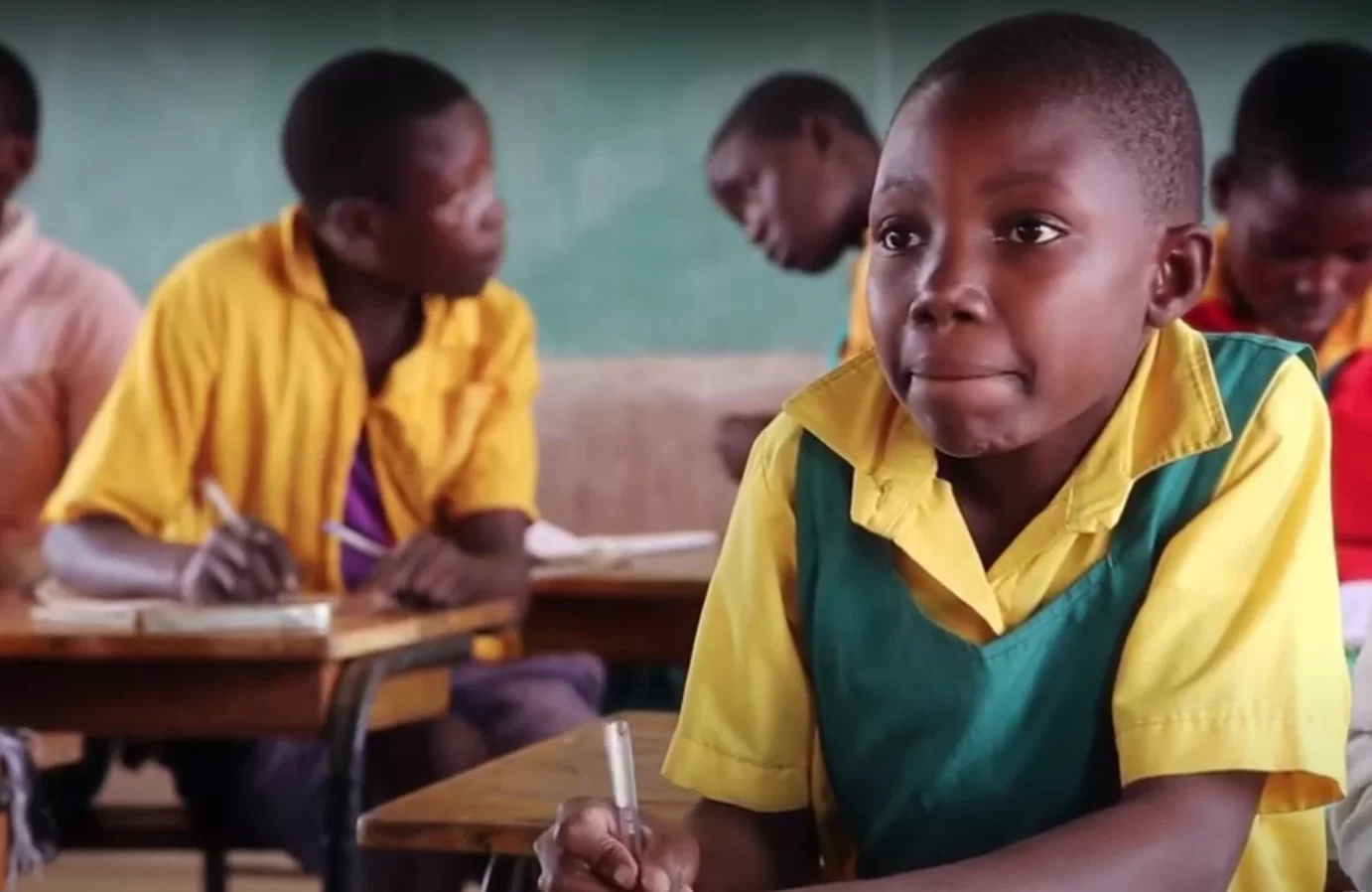
1.1 Our mission
Our worldwide mission is to create opportunities, enabling children and young people to shape their futures with confidence. We aim to serve them by providing our experience and expertise in the improvement of education on a structural level, because education has the power to change societies from within. We believe that education is the answer to the greatest challenges of our time, such as climate change.
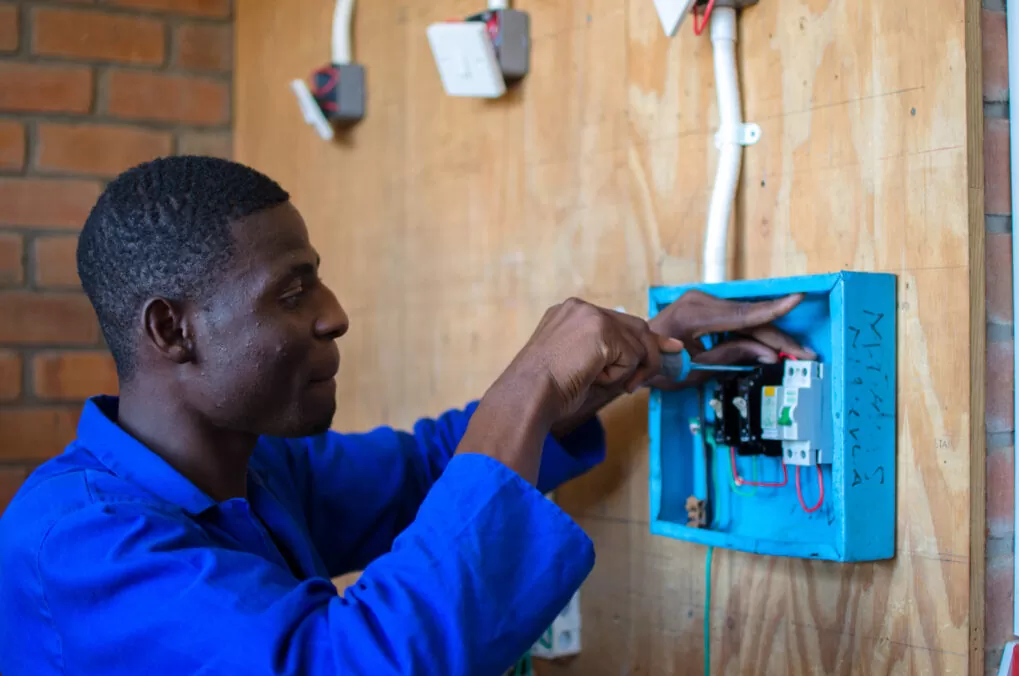
1.2 Our challenges
The global out-of-school population increased in 2022 to 250 million children and young people. Poverty remains one of the most obstinate barriers. Children living through economic fragility, political instability, conflict or natural disaster are more likely to be cut off from schooling – as are those with disabilities and those from ethnic minorities. In some countries, education opportunities for girls remain severely limited. A lack of trained teachers, inadequate education materials, and poor infrastructure make learning difficult for many pupils.
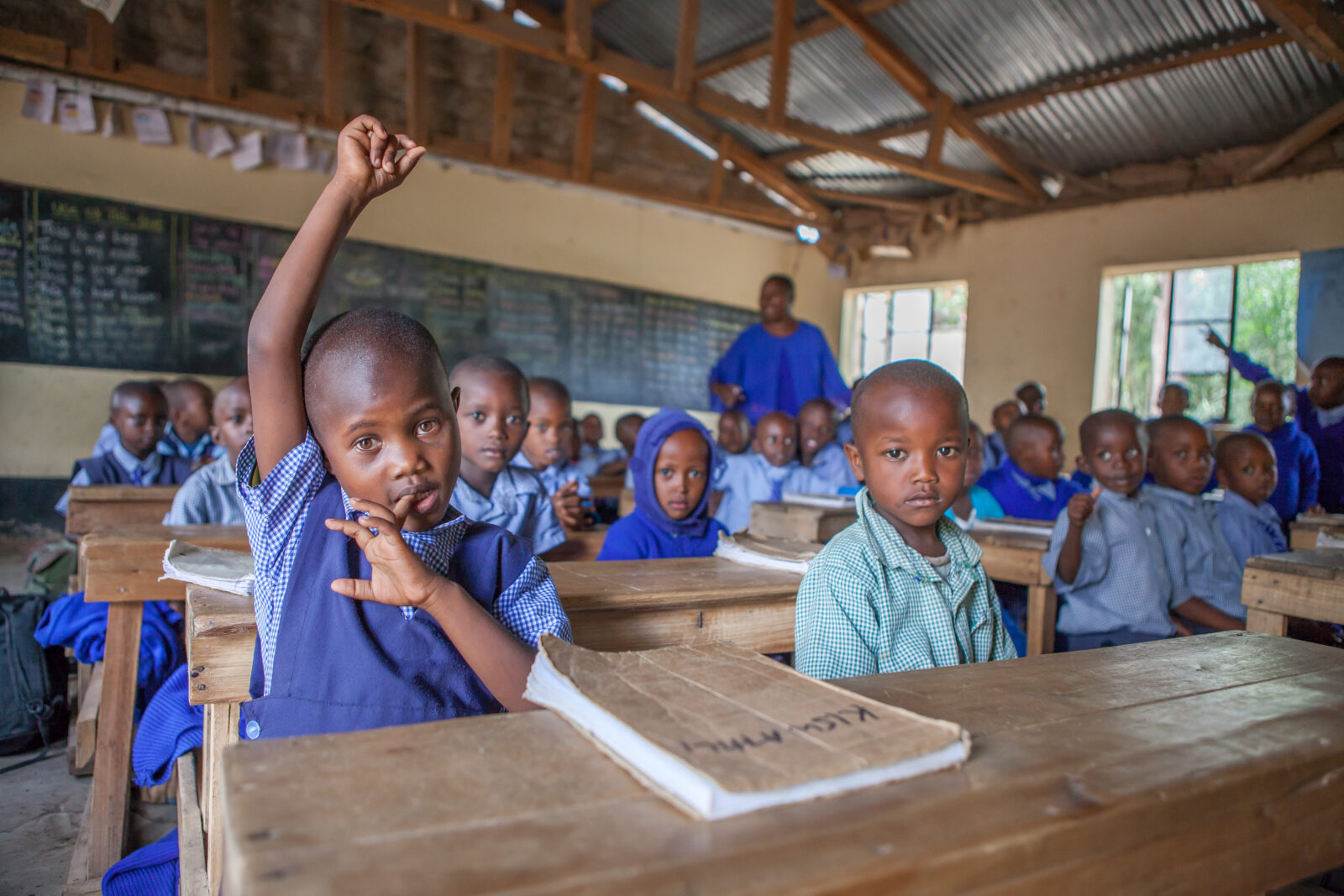

Globally, there is a 9% increase in hourly earnings for every extra year of schooling. (Source: the World Bank). That makes education an investment for life. Education delivers large, consistent returns in terms of income, and is the most important factor to ensure equity and inclusion.
Source: UNESCO
The need for future-proof quality basic education
Globally, literacy rates have gone up, school enrolment rates have risen, and dropout rates have fallen over the past decades. But despite this many children cannot read, write or count sufficiently, whether they have attended school or not. This is primarily due to large classes, a lack of learning resources, and often insufficient teacher training and support. Poorly educated children are more likely to face a future of unemployment and therefore to remain trapped in a cycle of poverty. This ‘global learning crisis’ is a very real missed opportunity, leading to a lack of trained talented young people in the Global South.
Closing the skills gap
When children do manage to complete their primary education, they are faced with the next challenge. In the Global South, there are simply fewer secondary schools per capita which means they are often harder to reach. In addition to logistical issues, attendance does not always lead to improved future perspectives. Vocational schools and the training provided often have little connection with available jobs in the labour market. This contributes to the high unemployment rates amongst young people. Each year about 12 million young people enter an African labour market which during the same period creates only 3 million formal jobs, yet at the same time the global labour shortage is expected to reach 85 million workers by 2030 (sources: Randstad, AFDB).
Education in emergency situations
Worldwide, about 43.3 million children had been displaced as a consequence of conflict and violence by the end of 2022. For many of them, this was the case for their entire childhood (source: UNICEF). Only half of refugee children attend primary school, and less than a quarter are in secondary school. Without an education, childhoods may be lost to child labour, child marriage, recruitment by armed groups or other life-threatening activities. In refugee situations psychosocial problems among children and young people are common. They have to deal with situations of adversity, violence and loss, and they need to gain skills to build peaceful societies. Our method, Social and Emotional Learning (SEL), is so important to increase their resilience.
Exchange programme
In 2023 the Exchange programme was revised in order to ensure that it continues to align with our strategic agenda and meets the criteria of sustainability, equity, and inclusiveness and that it contributes to quality education in our focus countries. This has resulted in the hard decision to no longer offer the Going Global Programme. We are grateful for all the support we received from the Going Global Volunteers and participants and all supporters who contributed to Going Global over the past 24 years. We are really proud to have contributed to this life-changing event for all participants.
In a lot of countries in which we work, there is a lack of consistent opportunities for the professional development of teachers and school leaders after they have finished their training. The motivation of teachers is a challenge due to large classes, lack of materials, and insufficient support within the schools. In addition, a lack of the right soft skills among pupils is common and can make it harder for them to shape their futures with confidence, the goal which Edukans strives for. Over the past few years, we have gradually made a shift towards equipping teachers in our focus countries with skills and the equal exchange of knowledge. To embed World Teacher in our education programmes and ensure it responds to the needs of our focus countries, from now on the country office will take the lead in the World Teacher programmes. The exchange programme will be transformed into an international Teacher Platform focusing on the exchange between teachers of mutual learning experiences with regards to pedagogical skills.
Edukans and the Sustainable Development Goals
We believe in the value of the Sustainable Development Goals which aim to make the world a better place by 2030. Through our efforts to achieve good-quality education for all, Edukans projects and programmes contribute to SDG 4, 5, 6, 8 and 16. We mainly focus on contributing to the goals 4, 5 and 8.
SDG 4 – Quality education
Ensure inclusive and equitable quality education and promote lifelong learning opportunities for all.
SDG 5 – Gender equality
Achieve gender equality and empower all women and girls.
SDG 8 – Decent work and economic growth
Promote sustained, inclusive and sustainable economic growth, full and productive employment and decent work for all.





“SDG 4 (quality education) can be seen as the mother of all SDGs as it supports the realisation of the other goals.”
- Rianne Driessen, International Partnerships Coordinator at Edukans

1.3 Our approach
To address the challenges mentioned in the previous paragraph this is our approach.
Ambition
In 2023, we further rolled out our strategic agenda. To shape sustainable futures the education system needs to be redefined and an upscaling of our interventions is necessary, while maintaining the professional, personal, and solid method of working that is so characteristic for Edukans. Our approach aims to ensure the best possible education for children and young people and has been based on four pillars: Basic Education, Skills for Work and Life, Education in Emergencies, and Exchange.
Ambition 2021-2025
Basic Education
- To reach 5 million children in primary and secondary education with good education.
- To provide 100,000 teachers with training to develop their teaching skills.
Ambition 2021-2025
Skills for Work and Life
- To train 200,000 young people in skills needed for work and life.
- To train the staff of 100 TVETs (Technical and Vocational Education and Training) in our skills methods (7-Steps to Work, Entrepreneurship, Work Based Learning, Life skills, and Active Teaching and Learning).
Ambition 2021-2025
Education in Emergencies
- To ensure that 250,000 displaced children and 25,000 young people enjoy full access to quality education, including wellbeing, by training 6,000 teachers.
Edukans Theory of Change
With over 20 years of experience, we have developed a solid Theory of Change that is guiding our work for quality education.
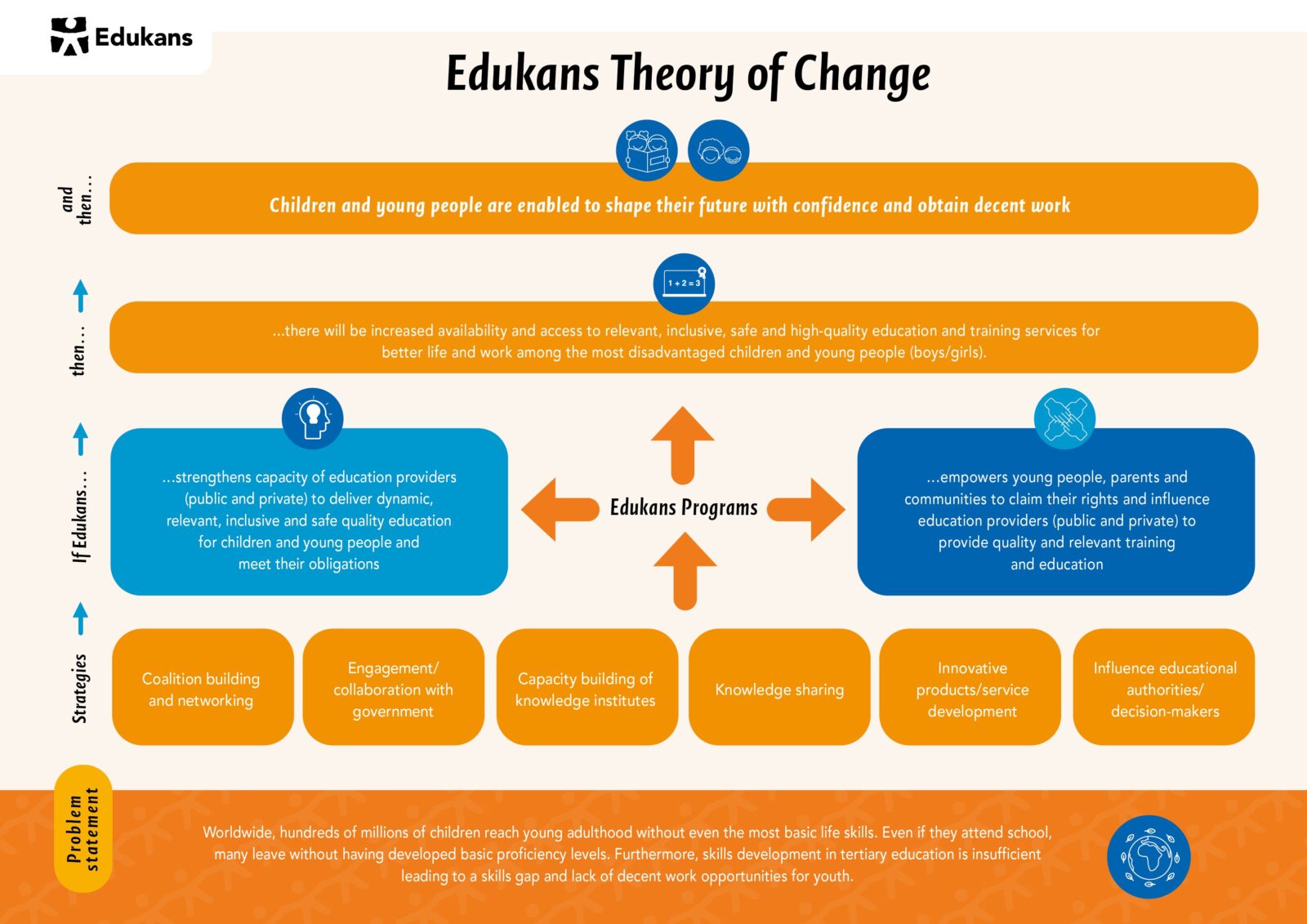
Diversity, gender equity and social inclusion in our programs
As Edukans, we firmly believe that true equality in education can only be realised through equal rights and access to opportunities for everyone. For this reason, Edukans will continue to centre the need for diversity, gender equity and social inclusion in all our actions and initiatives. In the past year, we have continued to work on developing clear guidelines for integrating diversity, gender equity and social inclusion across all domains and departments within our organisation.
Education is a fundamental human right, allowing children and students to acquire knowledge and skills that they need to shape their futures. However, this can only happen when it is built on the vital values of diversity, gender equity and social inclusion. As Edukans, we believe this is the cornerstone of an inclusive educational environment, where all students are given equal opportunities to learn, thrive and be empowered.
We strive to achieve inclusive educational environments through our holistic Star School model and our core programme methodologies, including Active Teaching and Learning, and Social and Emotional Learning. We support school environments, including teachers, school leaders, students, parents, the community and government stakeholders to cater to students’ diverse needs effectively by being responsive to students’ physical, social, emotional, and academic needs in both development and humanitarian contexts.
We acknowledge that in order to achieve true equality, sometimes this requires equity initiatives. This can be illustrated by our emphasis on the inclusion of girls within our programmes, thereby striving to level the playing field for all children. Additionally, we continue to explore partnerships allowing us to further strengthen an inclusive approach to education, so that together we can focus on possibilities, and not obstacles.
Diversity, gender equity and social inclusion remain cornerstones of education, and Edukans is committed to ensuring that this remains a priority in everything we do.
Approach: Basic Education
Edukans’ vision on quality education involves the promotion of safe, inclusive schools where children enjoy learning from well-trained teachers and develop the competencies – skills and attitudes – to continue their education. Unleashing the power of education to shape their lives with confidence.

To make our interventions a success, Edukans works with the Star School quality model which follows a clear programme encompassing five domains for quality education:
- Learning environment
- Teaching
- Learning
- School management
- Community and parental involvement
The Star School quality model is implemented with the help of a digital (self-)assessment tool called the EDU Q-card. Within the model, the focus is on the Teaching with Impact (TWI) approach for effective teaching and learning. TWI is organised in cascading trainings via master trainers based in the teacher training institutes in each country. The trainings are also available via the SkillEd e-learning platform. We pay particular attention to the social and emotional well-being of children having developed an approach called Social and Emotional Learning (SEL) that seeks to prevent issues from arising and build resilience by focusing on the development of social and emotional skills, often the missing piece in education.
“Every child has a right to education, but the attainment of that right is not a given. Children and young people are the future and providing the basic requirements for them to fulfil their right to education, is at the heart of everything that Edukans does. As a mother, I know the role education plays in preparing my children for the future. It therefore makes me so proud to be working with an organisation that in partnership with governments and local partners is making quality education a priority.”
– Dominique Bovens, Head of Programmes and Strategic Partnerships

Approach: Skills for Work and Life
Skills for Work and Life is an Edukans programme for young people which helps them to develop their skills in preparation for work and for meaningful participation in society. The programme uses several different methods making it highly effective.

Labour market relevance and quality of skills training
- Edukans ensures that its skills programmes are labour market relevant and future proof by connecting with private sector demands. Training is given in life skills, entrepreneurship skills and climate change related skills on water, waste, and energy to make sectors more resilient towards climate change.
- We offer a continuous improvement cycle for skills training through the implementation of Edukans’ 7-Steps to WORK approach. We adapt each training to local labour market demands and continuously strive to improve relevance and quality.
Work Based Learning
We facilitate meaningful quality Work Based Learning opportunities for young people, providing them with relevant, practical real-life working skills for the labour market.
Entrepreneurship
We support the development of entrepreneurship and financial literacy skills for self-employment. Business mentorship is set up and young people receive business start-up kits to ensure a successful start to self-employment endeavours.
21st century (Life) Skills
We promote life skills, Sexual and Reproductive Health and Rights education (SRHR), ICT skills, social-emotional learning, and life skills for lobbying to close the 21st century skills gap.
Digitalisation
The marginalised areas where Edukans often works are lagging behind in an increasingly digitalised world. They face multiple challenges to being able to respond efficiently to the external demand for new digital skills and engage in their own digital transformation.
- In this context, Edukans has developed a digital pedagogy course for TVET/Skills trainers to provide them with the support they need to engage in their digital transition, to leverage technologies for digital inclusion, and to bridge the digital divide for marginalised populations. The training provides trainers with digital skills and the capacity to design, implement and evaluate learning in blended training courses.
- Furthermore, Edukans is digitalising its own training courses to make them available to even more beneficiaries and further roll out the trainings and methodologies. The training courses are available on the SkillEd digital platform.
Lobby
We lobby for certification of the practical skills of young people, gender equality in all TVET and skills education programmes and on the work floor. We also lobby for the integration of Sexual and Reproductive Health and Rights (SRHR) education in Ethiopia’s TVET curriculum.
Approach: Education in Emergencies
Through our programme Education in Emergencies we provide access to education, high quality learning, and enhanced well-being in crisis-affected contexts.

The programme focuses on:
Access
- We work with displaced parents to help them understand the value of education.
- We set up temporary structures or safe spaces in which children can learn and play.
Quality
- We offer teacher training in areas such as
- Protection: child-centred pedagogy, support for children with learning and behavioural difficulties and school data management.
- Climate change: mainstream climate education and water management to ensure young people are better prepared and resilient to climate shocks.
- We facilitate work-based learning opportunities for young people, providing them with real-life working skills for the labour market.
Wellbeing
- We promote life skills, Comprehensive Sexuality Education (CSE), Mental Health and Psychosocial Support (MHPSS), Social-Emotional Learning, Music and Art.
Lobby
- We lobby for certification of the learning attainments of displaced teachers and students, the recruitment of female teachers and the inclusion of MHPSS in all education programmes.
Approach: Exchange
We work together with local governments, educational institutes, and teachers for the best possible education. We strive to create an optimal learning environment by empowering teachers to enhance their pedagogical skills. We also assist school management, involving parents and the wider community. We love to see teachers becoming stable factors and role models for children and young people. Edukans facilitates active learning by connecting teachers in the Netherlands with teachers in our focus countries. Through an exchange between peers (teachers, pupils, and school leaders from different continents) on learning, teaching, and management skills, our participants learn from each other and improve as (future) professionals in education. In 2023 Edukans drafted a new strategy aligning our exchange activities with respect for equality, sustainability and inclusiveness. The exchange programme will be transformed into an international Teacher Platform aiming at the exchange between teachers of mutual learning experiences on pedagogical skills.

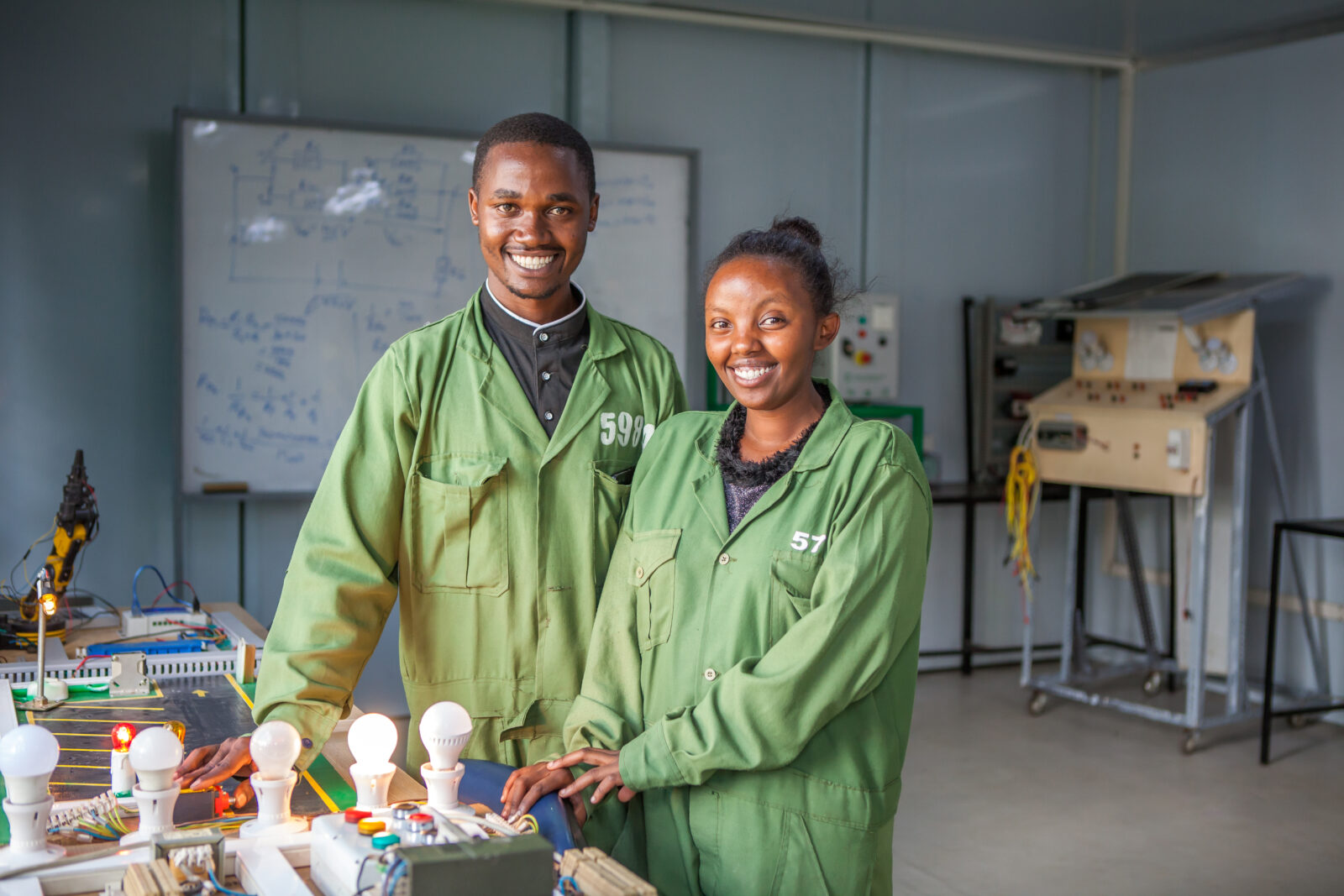
How did we make the difference?
2. Our impact in 2023

2. Our impact in 2023

In 2023 we worked on 31 projects in 8 countries. We have offices in Kenya, Ethiopia, Malawi, Uganda and the Netherlands. Edukans was also active with projects in Ghana, India, Lebanon and Rwanda. We have reached 701,787 children and young people and 19,504 teachers. Through our comprehensive education approaches we ensured that these children and young people could embrace their right to learn. Through our scaling-up approach we expect to accelerate our impact and reach more children and young people in the coming year.

We did, however, face several challenges, such as:
- Widespread political instability continues to affect education programme delivery and prevent school attendance.
- Security risks in operational regions impede safe access to education.
- Challenges in achieving SDG 4 and SDG 8 due to insufficiently urgent action being taken. If we continue at this pace, SDG ‘Quality education’ and ‘Decent work’ will only be achieved in half a century (and not in 2030).
- Due to a limited availability of financial resources available for education, our ambition to start new projects and reaching children and young people through our education programmes has not been fully realised in 2023.
- It continues to prove difficult to involve an even number of men and women in our programmes, with more men participating than women. Unfortunately, women must deal with prejudices or socio-cultural norms that make it difficult for them to participate. Giving more attention to achieving gender balance and reaching more women with our programmes is high on Edukans’ agenda.
Edukans believes in turning challenges into opportunities and has achieved sustainable impact on quality education through our programmes. We are building programmes around opportunities such as:
- Global recognition of education as a driver for youth development and potential.
- Continued global prioritisation of skills development and Education in Emergencies.
- Meaningful youth participation is critical to successfully work on skills development and inclusive job creation.
- Edukans’ reputation and acknowledged expertise in education.
Despite the challenges we faced we were able to create opportunities, enabling over 700,000 children and young people to shape their futures with confidence.

We have worked on
31
projects

We have worked in
8
countries
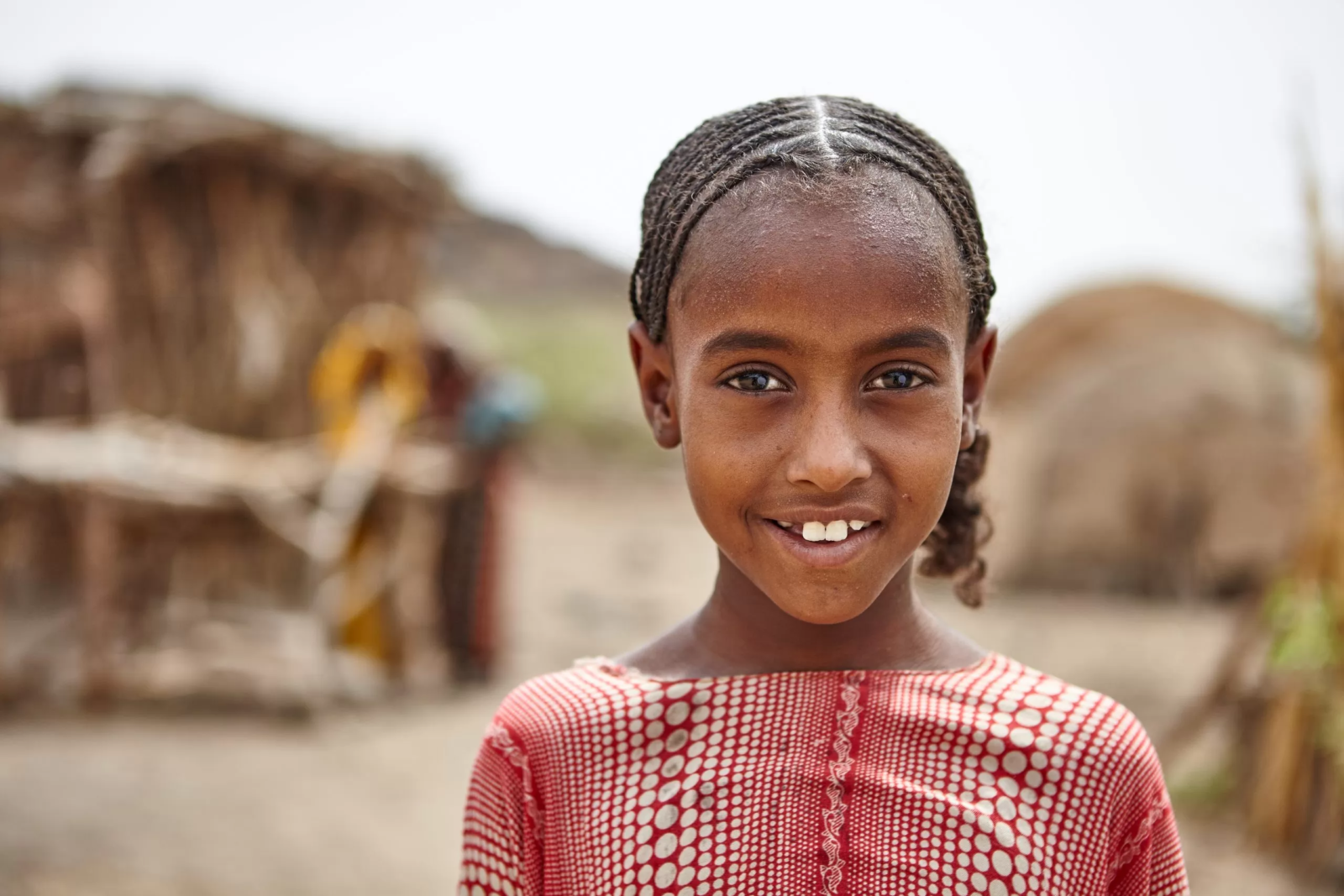

We have offices in
5
countries
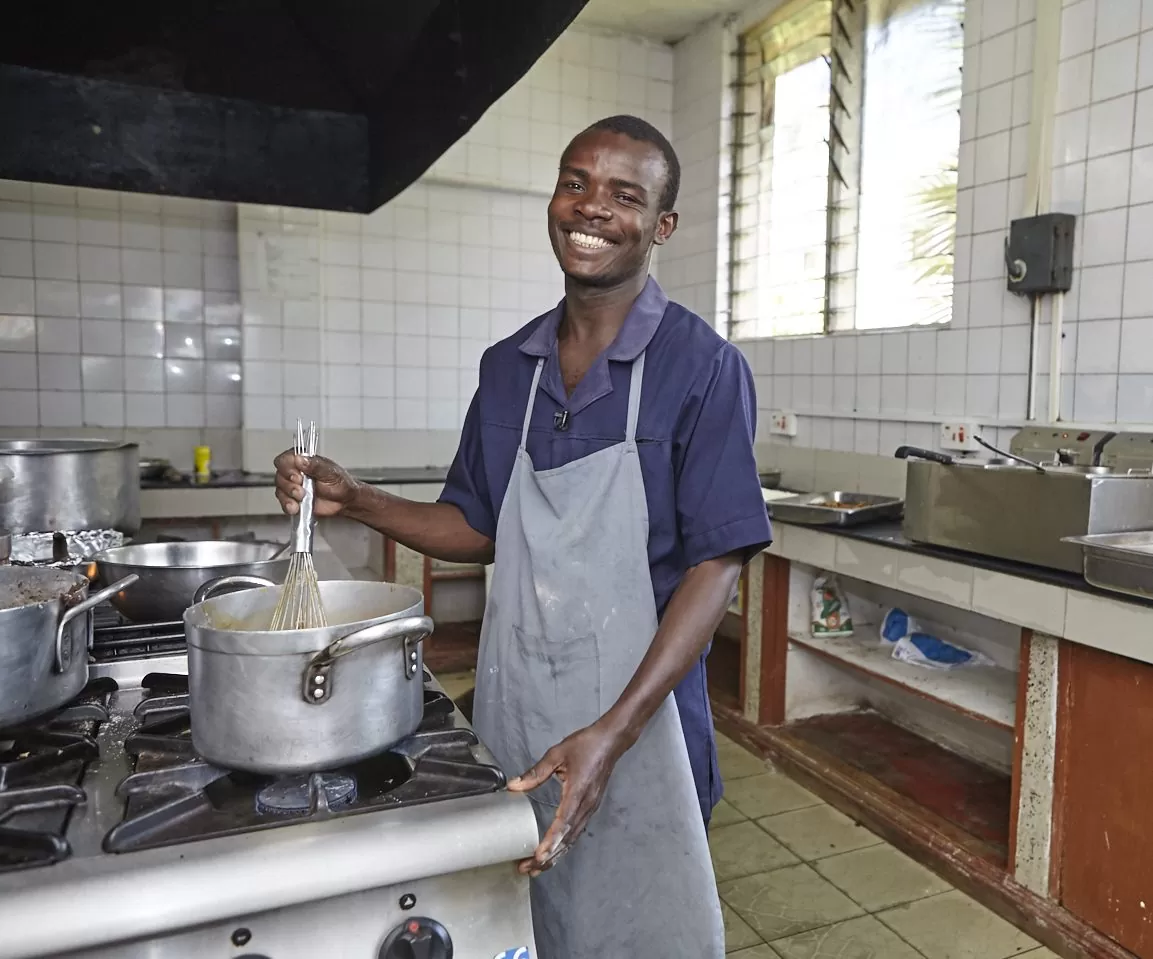

We have reached
701,787
children and young people

We have reached
19,504
teachers
Total spending:
€7,087,527

We have worked on
31
projects

We have worked in
8
countries


We have offices in
5
countries


We have reached
701,787
children and young people

We have reached
19,504
teachers
Total spending:
€7,087,527
2.1 Impact Basic education
To ensure the best possible inclusive education for children, our work within the pillar Basic Education is important. We have been running projects in Ethiopia, Kenya, Uganda, Malawi, Ghana and Rwanda. In this paragraph we sum up the results, take you through one of our projects and elaborate on our approach with the EDU Q-card assessment tool.

625,164 children
received improved quality education, enabling them to shape their future with confidence: 304,485 boys and 320,679 girls

2,455 Star Schools
improved the quality of education for learners and teachers
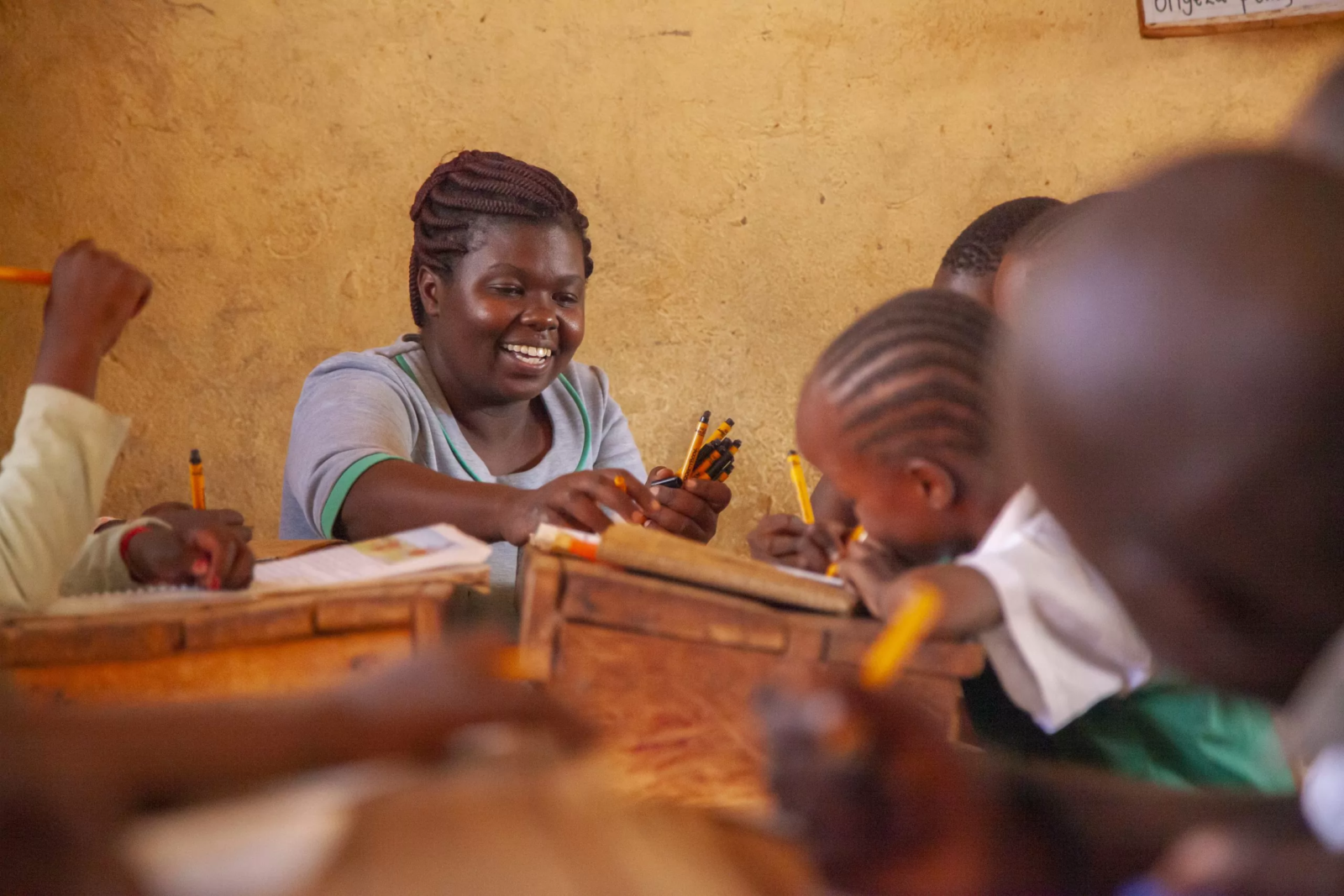

17,077 teachers
have developed their pedagogical skills in active teaching through Edukans trainings

3,385 school leaders
were trained to support them in managing their schools in an effective and inspiring way
Project highlight Basic Education
Malawi: improving opportunities for children through mentorship programmes
In 2022 Edukans Malawi started implementing the School-based Blended Education Mentorship Program (SBEMPro) in the nine districts of Dowa, Lilongwe, Salima, Dedza, Mangochi, Machinga, Thyolo, Chiradzulu and Nsanje.

The aim of this project is two-fold: improving job satisfaction for teachers through the creation of opportunities for lifelong learning and career development, and support for learners to develop skills for learning and living. This was achieved by establishing a mentorship programme for teachers and learners. The programme is designed to address two of the causes of the poor quality of education in Malawi: the inadequate professional standard of teachers and the lack of sufficient guidance and support for children and young people in primary and secondary schools.
Partners
This project was implemented by Edukans Malawi with support from the Royal Norwegian Embassy through UNICEF.
Achieved major outcomes:
The teacher mentorship programme targeted 1,800 school leaders as teacher mentors in 360 schools (270 primary schools and 90 secondary schools), 9,000 teacher mentors and 180,000 learners including learners with special needs. The project gained so much traction that the numbers of schools, teachers and learners that benefited from the intervention are significantly higher.
- 40 teacher trainers and quality assurance officers gained professional skills to train mentors and support the establishment of mentorship in schools.
- We increased the competencies of 2,762 school leaders in 553 schools to lead, monitor, and sustain mentorship programmes.
- We contributed to the professional growth of 10,214 teachers from 553 schools leading to increased teaching effectiveness, life-long learning, career development, and enhanced job satisfaction.
- 228,662 learners, of which 7,502 are learners with special needs, actively participated in the programme leading to increased study skills, study pathways, and life skills.
“The mentorship programme has helped our teachers to open up with us as learners. This enables them to ask for support in any area that requires some support, for example, how to deal with peer pressure”
- John Suzunde, learner Chekerere CDSS in Nsanje District

Scaling up
The School-based Blended Education Mentorship Program (SBEMPro) is designed with an eye on scaling-up to national level. The SkillEd digital learning platform was introduced to maximise availability and online and offline use of mentorship materials without geographic restrictions. The organisation of communities of practice enables project schools to involve other nearby schools, adding to the scalability of this approach.
Sustainability
The sustainability of the programme is ensured by working within existing government structures and mechanisms. The teacher mentors who received training are experienced teachers, section heads, head teachers, primary education advisors, and quality assurance officers. The teacher induction programme is integrated into existing working mechanisms within the education sector to avoid the creation of a parallel structure, minimise additional workload for mentors, and maximise the potential for nationwide scalability. The project was completed successfully in 2023 and Edukans Malawi hopes to continue with the Mentorship Programme aiming to further scale up this game changing project.
Approach Basic Education
Monitoring the quality of education and digitalisation with the EDU Q-card assessment tool
As Edukans we work together with local governments, educational institutes, and teachers on the best possible education. We strive to create an optimal learning environment by supporting teachers in enhancing their pedagogical skills, assisting school management, and involving parents and the wider community.

The EDU Q-card is proving highly effective when working towards this mission. It is a web-based instrument designed to assess the quality of education. Its primary objective is to enable head teachers, SMCs/PTAs, and inspectors to easily monitor the quality of education in schools and take actions to address areas that require improvement.
Using the EDU-Q card motivates school administrators to create school improvement plans based on a combination of the instrument’s outcomes and the specific priorities and resources of each school. The tool is designed to facilitate dialogue between school staff and external experts, ultimately fostering an ongoing commitment to enhancing education quality.
To date, the digital tool has approximately 650 direct users who have user rights to enter data on the platform. Beyond these direct users, our broader engagement encompasses teachers, community members and others involved in the dialogue and making school improvement plans. These individuals, integral to utilising the system, bring our estimated total of direct users to around 7,800 when applying a conservative multiplication factor. This expanded reach covers all seven countries where the application has been piloted over the past few years: Ethiopia, Ghana, Malawi, Surinam, India, Kenya, and Uganda. Additionally, over 400 schools have worked with the tool and/or are still using it, demonstrating widespread adoption and impact.
2.2 Impact Skills for Work and Life
In many different countries young people are facing a skills gap after finalising their studies. The skills that they were taught in school do not match the needs of the current, nor the future, labour market and are often too theoretical. At Edukans we are committed to supporting young people, TVET institutes and their staff, governments and other partners to bridge this gap and equip young people with the skills and competences they need for meaningful participation in society. This includes developing soft skills such as communication, time management, teamwork, and digital skills which have become increasingly important over the past few years.
Building self-esteem and involving young people in their own learning journey is of utmost importance when they are preparing for the future. Together with numerous partners we have been running projects in Ethiopia, Kenya and Uganda. In this paragraph we sum up the results, take you through one of our projects and elaborate on the ‘Connection Works!’ conference we organised in April 2023.
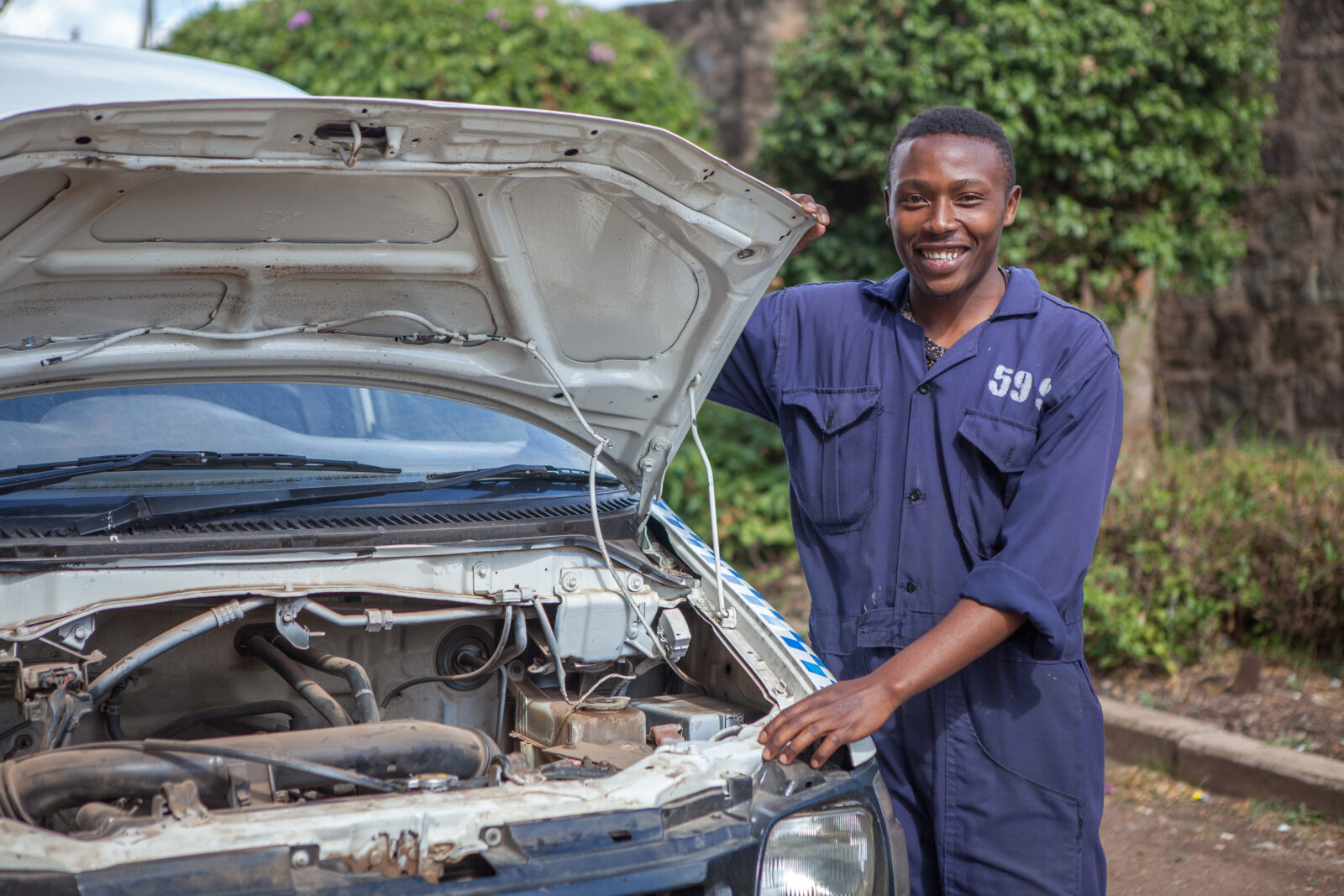

13,973 young people
developed their skills in preparation for work and for meaningful participation in society: 7,511 males and 6,462 females

374 teachers
were equipped with the competencies to create a safe learning space, and the skills to use creative and participatory methodologies to teach life skills

63 businesses
were involved

40 training providers
were involved
Project highlight Skills for Work and Life
Equipping 9,000 young people with up-to-date skills for better chances in the labour market
Many countries in Africa are dealing with high youth unemployment rates. In Kenya alone, where official unemployment is 12.7%, 67% of young people (aged between 15 and 34) are unemployed. Every year, a million young people who have not finished their education and have not yet learned a trade are added to this statistic.

TVET education as a response to unemployment
With support from AFAS Foundation, Edukans started a three-year project for improved vocational training in 30 TVETs. In this project we work together with the KCCB, the Kenyan Confederation of Catholic Bishops, which manages 120 TVET institutes across the country all of which need to adhere to the quality standards for 2025 as set by the government. The KCCB was involved in setting up the project proposal which guarantees the demand driven nature of the project.
System strengthening
The project focusses on system strengthening and improving the quality and relevance of education by, for example, training trainers and management of TVET institutes. The quality of the courses is continually enhanced with the addition of practical skills, life skills, entrepreneurial skills, and digital skills. In this way, young people learn a variety of different skillsets allowing them to build a personal professional profile and leaving them better equipped to find a job on the labour market after graduation.
Internships
During the implementation of this project, we also invest in forging relationships between the TVETs and the local business community aiming to facilitate internships and the involvement of those businesses in the operations of the TVET institutes. The internships allow young people to gain practical experience during their studies leading to a better match between the skills they learn and the demands of the labour market. An added advantage is that pupils also gain experience in other soft skills such as communication, time management, etcetera.
“It is very important to invest in training young people, so that they acquire the skills necessary to meet labour market demands. Vocational education plays a crucial role in giving them a chance at a good job. I am proud that with this program we can contribute to creating opportunities for young people. By working to reduce youth unemployment, we support young people and their families to build a stable future.”
- Gerben Eversdijk, director of AFAS Foundation

Achieved major outcomes:
In the first year of the three-year collaboration, assessments were carried out involving 62 key individuals representing all the participating TVETs: the management and teachers, representatives of the partner (KCCB) and TVET government representatives at national and provincial level. They received a two-day training where they learned how to assess the quality and potential areas for improvement of the TVET they were affiliated with. This provided insight into which specific improvements were needed for each TVET. Many of the results suggested the need for improvement in leadership, teaching of life skills, digital literacy, entrepreneurship, and practical experience. For each of the relevant areas a training has been set up that will cover the topics where improvement needs to take place. This means that the project is data driven and zooms in on the specific needs of each TVET.
The findings of the TVET assessments were presented at a validation workshop in which key stakeholders participated and plenary discussions were held on the implications of the results for the planned activities in phase 2 and 3.
“It is captivating to work on challenging projects that seek to address the unemployment problem in our society. I have seen positive impact on lives and livelihoods of young people, and I hope that there will be more opportunity to scale up Edukans programmes to reach more beneficiaries.”
- Lindah Cherop, skills-expert Edukans Kenya

‘Connection Works!’ conference
Edukans, VSO and Randstad joined forces to organise a skills themed event
On the 18th of April 2023 Edukans, together with VSO and Randstad, organised the ‘Connection Works!’ conference.
Why did we organise this event?
Increasing numbers of young people are experiencing prolonged and systemic unemployment because of a lack of jobs and a prevailing skills mismatch between education, training, and labour market demand. Women and marginalised groups in particular face labour markets that are not inclusive, diverse and equitable. This is the reality which drives us to address the urgent need to close the gap between the decent work opportunities and skills training available to young people. We need to scale up the impact we have in order to provide young people in the Global South with strong future prospects and opportunities. To do this, we need partnerships, because there is power in cooperating and making a connection work! By organising the conference, Edukans created an opportunity for more structural and systematic cooperation between stakeholders to scale up and tackle this problem. To establish a connection between education and the labour market, between public, private, and civil society participants, and between young people and their future of work.

Prominent speakers
The conference featured prominent speakers including Mr. Roberto Suárez Santos, Secretary-General of the International Organization of Employers (IOE), Liana Hoornweg, CEO of Partos, Sher Singh Verick, Head of the Employment Strategies Unit in the Employment Policy Department at the International Labour Organization (ILO), all of whom shared valuable insights during an online session. Furthermore, Ambassador Jurriaan Middelhoff, the Ambassador for Youth, Education, and Work at the Dutch Ministry of Foreign Affairs, delivered a keynote speech together with Daisy Kandole, Youth Assistant at Reproductive Health Uganda (RHU).
Bridging the gap between education and employment for young people
Following these speeches, the youth advisory panel led by Umar Abdullahi and Peace Tizaru shared their reflections and opinions on the event. In the afternoon attendees could join one of the four interactive break-out sessions. The event was excellently facilitated by Dutch Edukans ambassador Sofie van den Enk and Kenyan youth and skills expert Christine Ogola, ensuring a dynamic and engaging experience for all participants. The diverse range of perspectives and expertise contributed to a comprehensive discussion on bridging the gap between education and employment for young people. This was not a one-time event; in the course of 2024 we will organise a follow-up event in Nairobi.
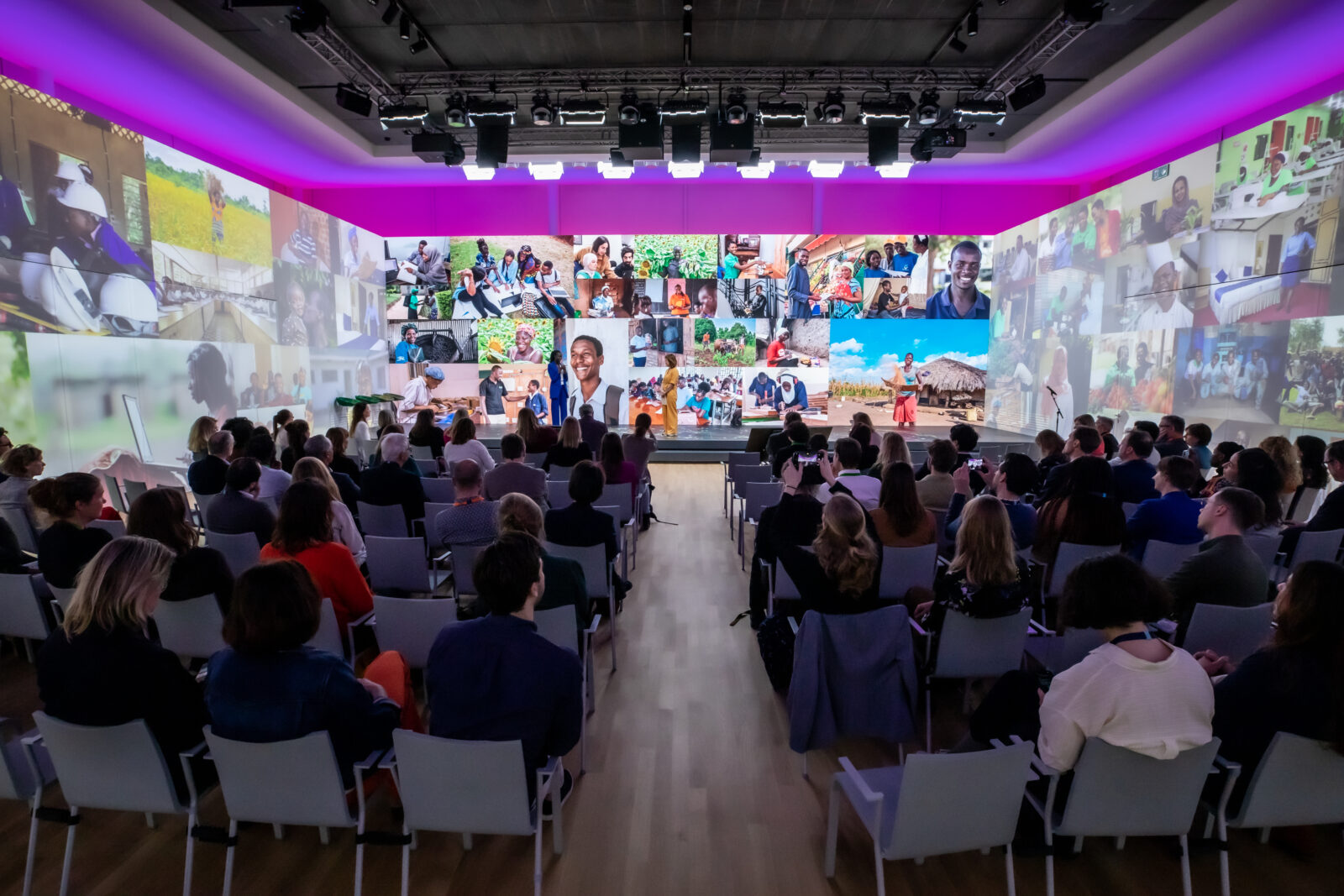
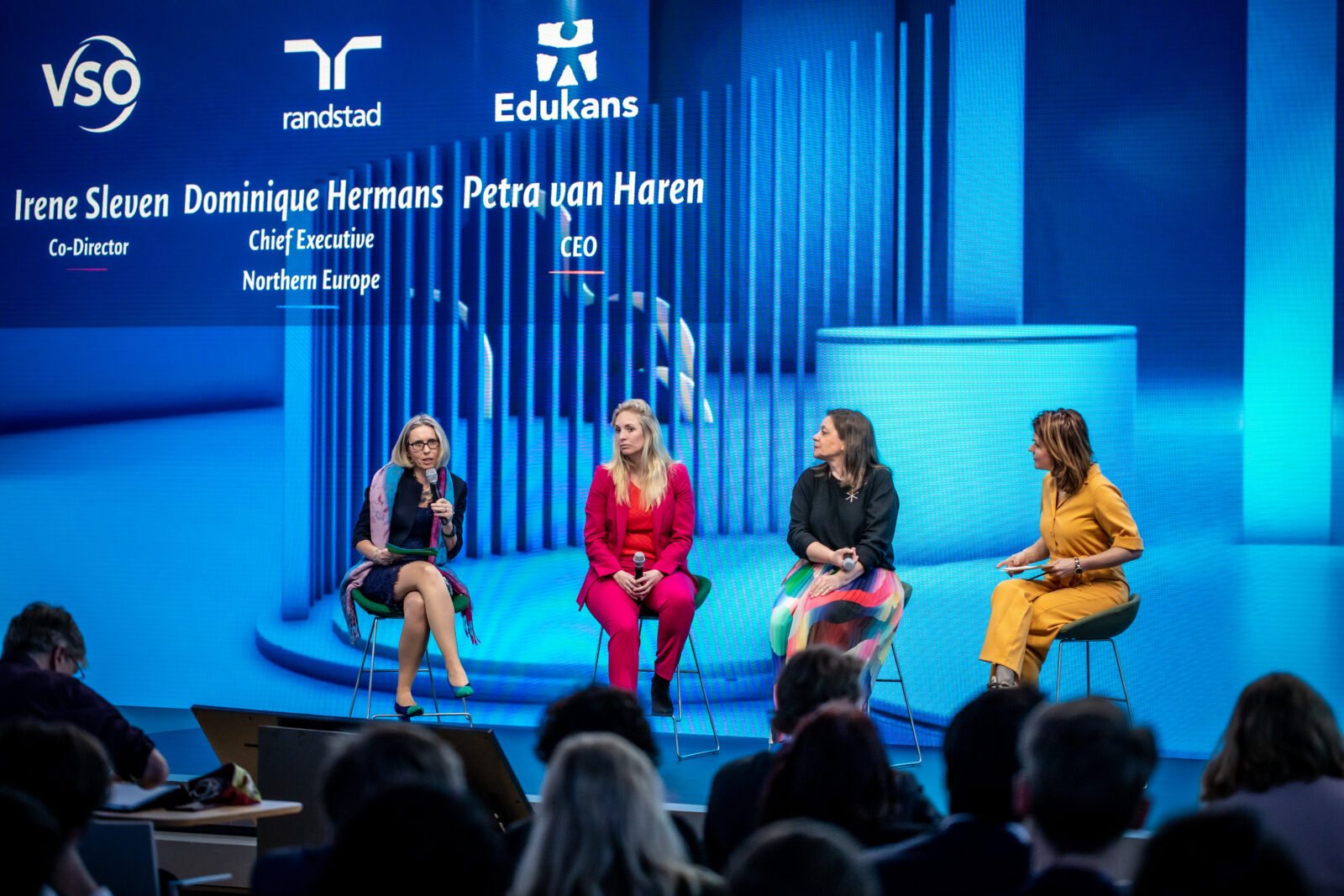
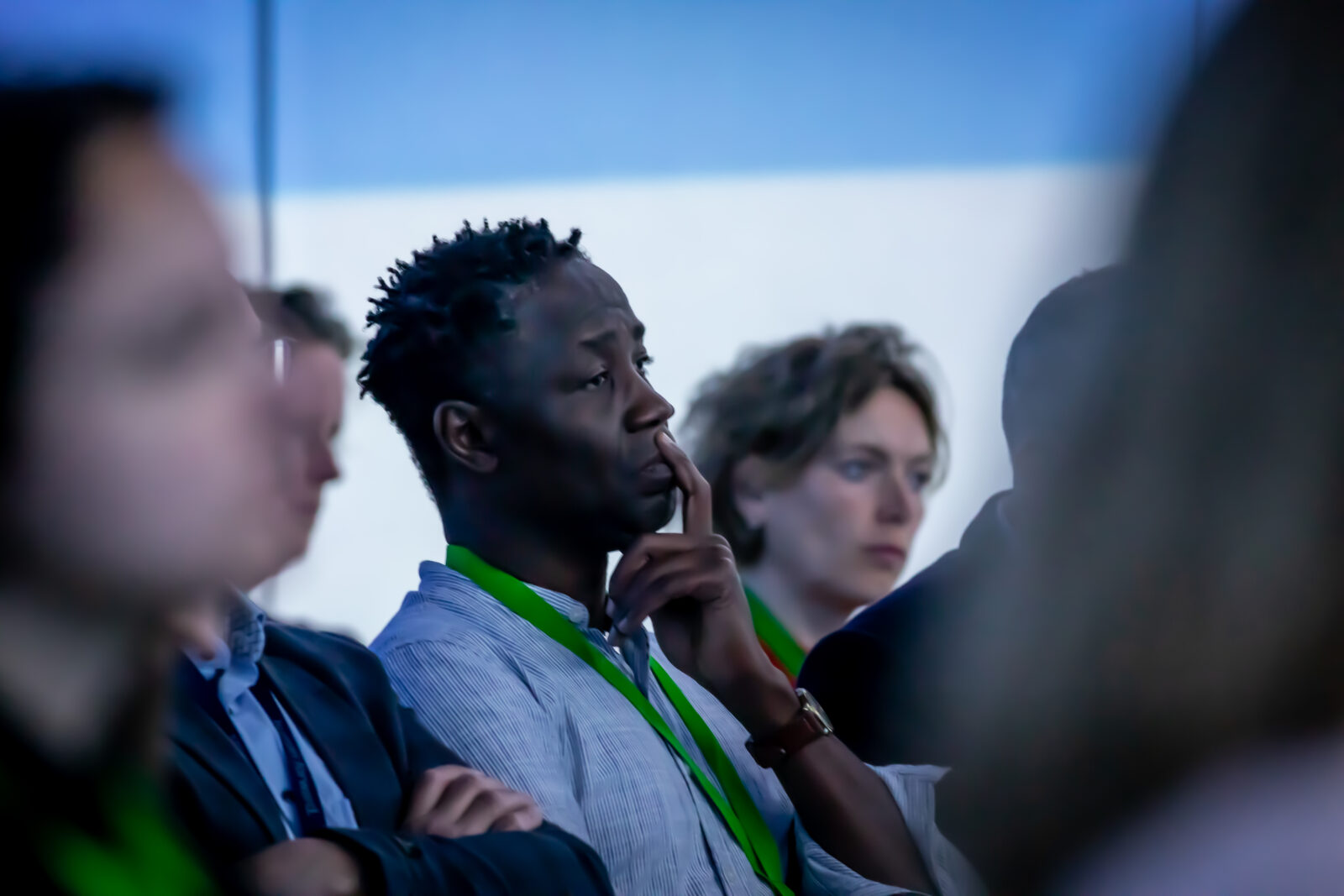
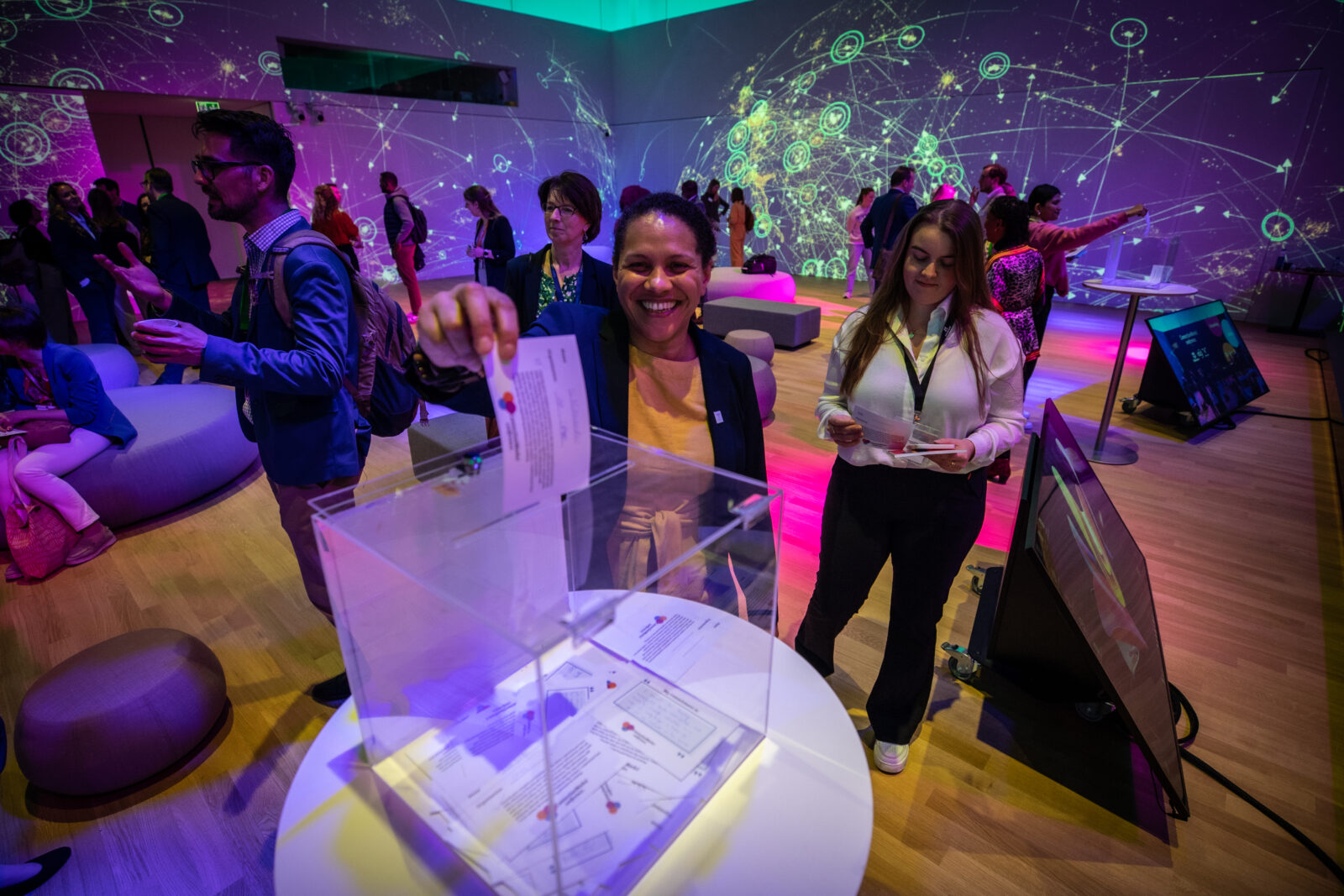

- 0
- 1
- 2
- 3
- 4
2.3 Impact Education in Emergencies
We have been running projects in Ethiopia, Lebanon and Kenya with the aim of restoring access to safe and quality education for out of school children and young people, as well as to promote the well-being of teachers and pupils by providing life-saving, psychosocial and emotional support. In this paragraph we sum up the results and take you through several project highlights.
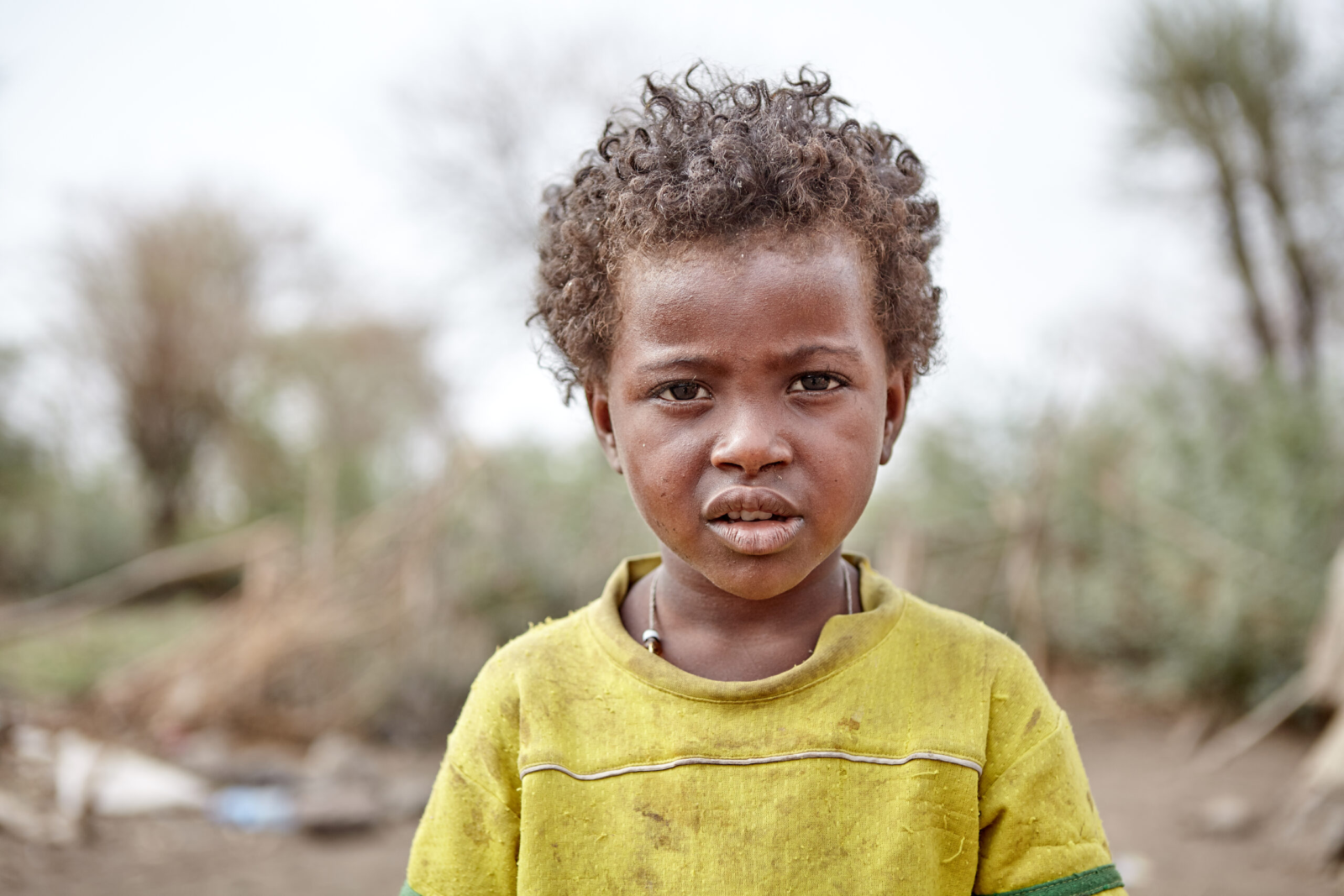

56,302 children and young people
found a safe haven at school and received quality education in emergency situations: 30,279 males and 26,023 females

1,740 teachers
were trained in areas such as child-centred pedagogy and learning and behavioural difficulties

165 schools and TVETs
provided access to education, high quality learning, and enhanced well-being in crisis-affected contexts
Project highlight Education in Emergencies
Quality education, music and art for Syrian/Palestinian children and young people in Lebanon
Edukans supports a project in Lebanon called: ‘Quality education for Syrian/Palestinian children and youth’. The focus areas are education and psychosocial support for young people from Syria, Palestine and Lebanon. Language barriers meant that most of the youth of the Syrian refugee population in Lebanon – fleeing the civil war in Syria, that started in 2011 – were unable to cope with the Lebanese school curriculum. This motivated the Edukans partner JCC (Joint Christian Committee) to begin a special programme for these young people. A clear benefit of this programme was that participants could take the official Syrian exams, allowing them admission to universities once they succeed.

Achieved major outcomes:
- Edukans succeeded in preparing qualified teacher trainers to support their fellow teachers in conducting effective planning and implementation.
- The innovative methods applied by the refugee teachers resulted in real progress in the pupils’ learning outcomes. Additionally, the teacher-pupil relationship and the relationships among the pupils themselves improved.
- The regular implementation of psychosocial activities and awareness sessions has resulted in the pupils having more positive perceptions of themselves and of their surroundings.
- Improving parents’ capacity to support their children’s education has shown positive results with many encouraging their children to take the trip to Syria to sit their exams. This is the direct result of JCC efforts to ensure the protection of young people.
“The success rate on the national exam level among the pupils in Syria is 60%. Our pupils (in Lebanon) sitting the exam in Damascus have achieved – since 2020/2021 – a rate of 81%.”
- Supervisor Mr. Mahmoud Manna

The healing power of music and art
Edukans also provides the opportunity for young, displaced persons to attend music and art classes in Lebanon. Through art, young people are empowered to express their feelings and are able to communicate through the medium of music or painting, transcending language barriers.

Achieved major outcomes:
- In Ein-el-Hilweh camp a music and art project is running for 80 pupils. Young people learn to express ideas and feelings. Music and art have proven to have a positive result on the pupils’ performance and mental wellbeing.
- Conducting art classes for music and drawing/painting in Ein el Hilweh camp increased the participants’ sense of belonging to their culture and community. Young artists admire the centre. They discover their talents, enjoy music and painting, and performing together.
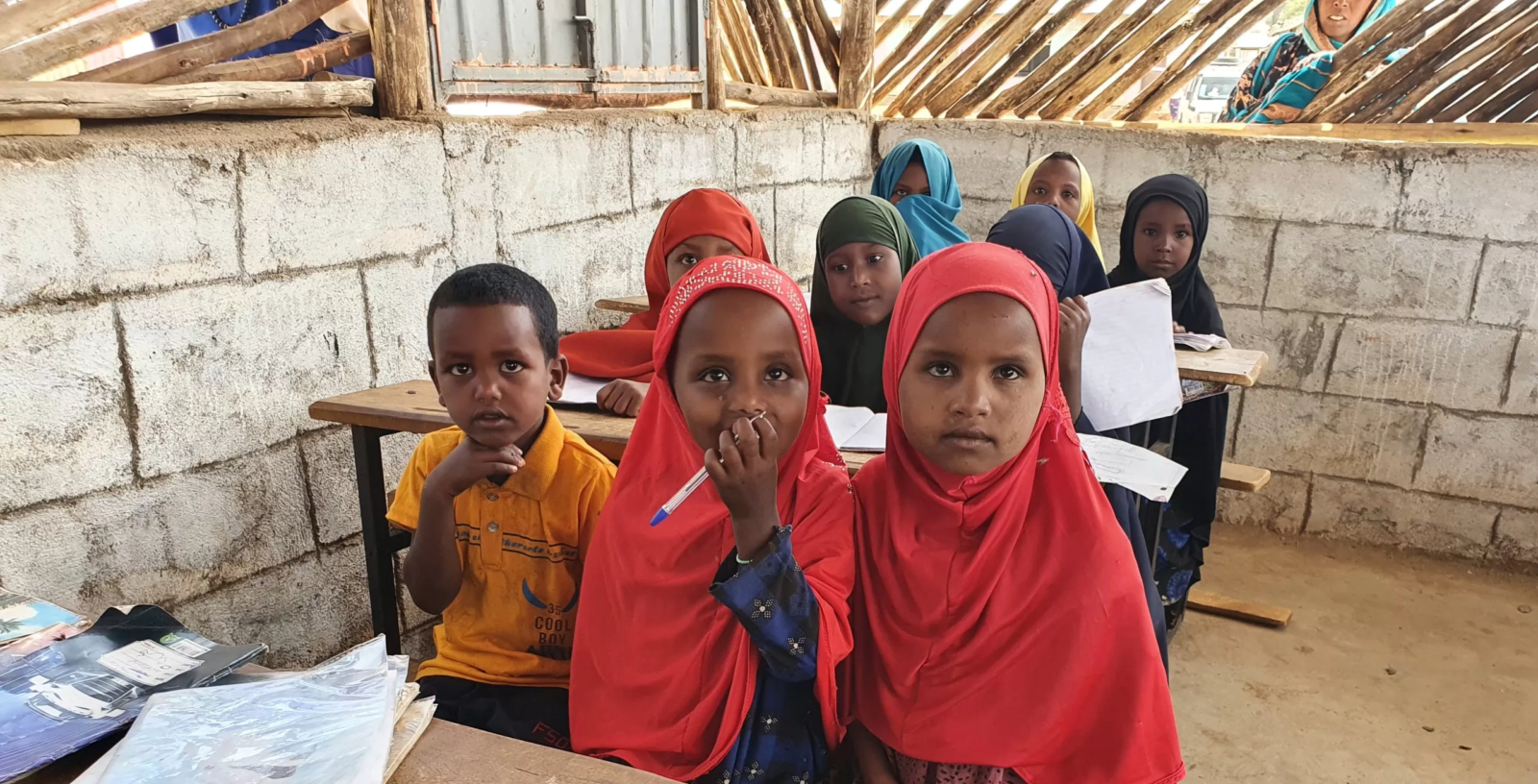
Education has been identified as one of the most important indicators for making peace possible.
Project highlight Education in Emergencies
Supporting teacher well-being in Ethiopia
It is important to include MHPSS (Mental Health and Psychosocial Support) in humanitarian programmes, not only during a crisis but also during the reconstruction phase. This helps restore the resilience of individuals and communities, so that they can get back on their feet after the crisis.

One study conducted in Ethiopia found that 80% of teachers living in conflict affected areas suffer from “severe” stress. In addition, teachers were found to suffer from a number of other crises induced consequences, such as family separation, economic difficulties, nightmares, violent behaviour, feelings of hopelessness, feeling inferior, and loss of self-confidence.
Edukans has developed a Mental Health and Psychosocial Support manual aimed at supporting teacher well-being. The MHPSS training uses the Social and Emotional Learning (SEL) model as a backbone, addressing key areas such as self-awareness, self-management, social awareness, relationship skills, and responsible decision-making.
Achieved major outcomes:
- In cooperation with the Teacher Training Colleges in Amhara and Afar region 828 teachers were trained in Mental Health, offering practical skills and strategies for personal well-being and resilience. The trained teachers reached around 27,400 pupils.
- By investing in capacity building, a direct contribution is made to the enhancement of teacher well-being, leading to improved education quality and better future prospects for children and young people in the communities reached.
- MHPSS-training for conflict-affected teachers is crucial for themselves and their pupils, whose trauma manifests in bullying, discrimination, and other types of social pressures, particularly in areas where IDP children are integrated in host community schools.
- By ensuring the wellbeing of both teachers and pupils, schools experience better results, including better mental health.
- We believe MHPSS should become an integral part of the CTE curriculum, for now at least mental health is on making its way onto the government’s agenda.
“I learned that I have to take care of myself, before being able to take care of my pupils. I also learned how to recognise the psychological problems of my pupils and how to support them.”
- Feedback from a teacher that participated in a MHPSS-training

2.4 Impact Exchange
Our projects within the pillar Exchange bring together teachers and pupils from across the world. In 2023 the Exchange programme was revised in order to ensure that it continues to align with our strategic agenda and meets the criteria of sustainability, equity, and inclusiveness and that it contributes to quality education in our focus countries. This has resulted in the hard decision to no longer offer the Going Global Programme. In this paragraph we sum up the results and take you through a project highlight: World Teacher in Kenya.

Going Global 2023 brought together
3,285 pupils
from the Netherlands and Uganda

Going Global 2023
Learners from 20 schools
gained new perspectives and worked together towards sustainable change in education

Going Global 2023
158
teachers, school leaders, parents’ committees and other educational staff were reached directly
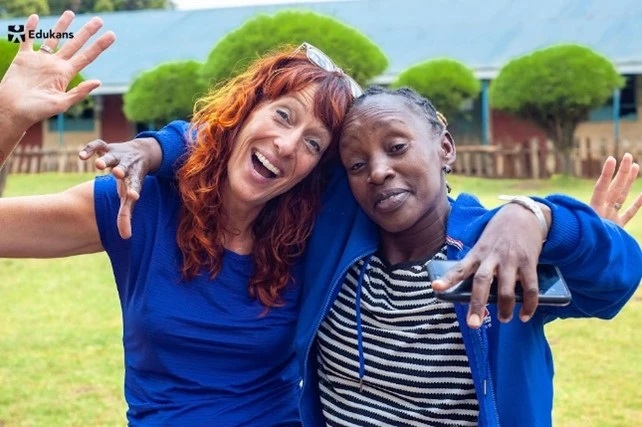

Edukans Kenya hosted
38 World Teachers and school leaders
from the Netherlands during a useful cross-cultural experience

World Teacher 2023
3,063 learners and 155 teachers
from the Netherlands and Kenya experienced a successful learning process
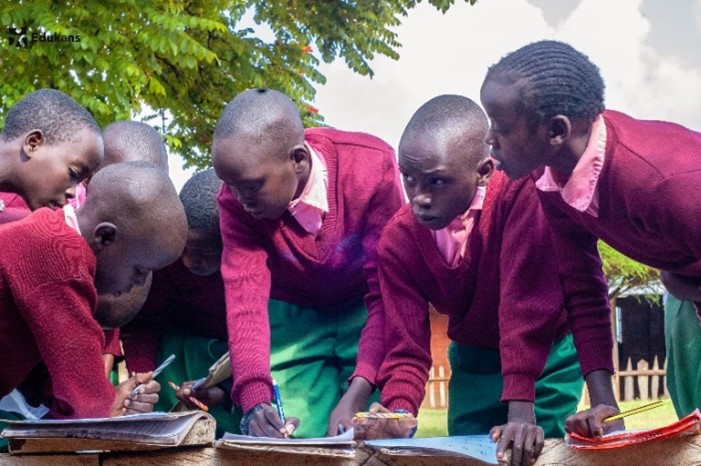

Exchange total impact
6,348 young peers
and 313 educational staff from the schools were reached indirectly via the Edukans Exchange programmes

Going Global 2023 brought together
3,285 pupils
from the Netherlands and Uganda

Going Global 2023
Learners from 20 schools
gained new perspectives and worked together towards sustainable change in education

Going Global 2023
158
teachers, school leaders, parents’ committees and other educational staff were reached directly


Edukans Kenya hosted
38 World Teachers and school leaders
from the Netherlands during a useful cross-cultural experience

World Teacher 2023
3,063 learners and 155 teachers
from the Netherlands and Kenya experienced a successful learning process


Exchange total impact
6,348 young peers
and 313 educational staff from the schools were reached indirectly via the Edukans Exchange programmes
Project highlight Exchange
Tackling the learning crisis: World Teacher 2023 in Kenya
Edukans Kenya hosted 38 World Teachers and school leaders from the Netherlands from the 15th to 29th of July 2023. The group comprised school leaders, teachers, education experts and teacher trainees who joined their Kenyan counterparts in six primary schools in Elgeyo Marakwet County. The purpose of the exchange program was to equip teachers with effective skills for a successful learning process in order to tackle the learning crisis.

The Exchange Programme is entrenched within Edukans’ Teaching with Impact programme to further equip teachers with effective skills for tackling the learning crisis. To maximise results, Kenyan and Dutch teachers and school leaders were paired-up as peers working on specific topics identified beforehand. This benefitted Edukans’ planned activities and complemented the educational strategic agenda in Kenya. Teachers learned from each other by exchanging different teaching methodologies and developed learning materials as a team.
The direct beneficiaries of World Teacher 2023 were 3,063 learners (1,519 boys and 1,544 girls) and 155 teachers (51 male and 104 females). It was not only exciting but also a great learning experience for both the Dutch and Kenyan teachers and the children in these schools.
World Teacher 2023 was attended by representatives of the Ministry of Education, the Teachers Service Commission, The Kenya National Commission for UNESCO, and the local administrative authorities. The programme injected energy and passion into the teaching profession and proved to be a useful cross-cultural experience.
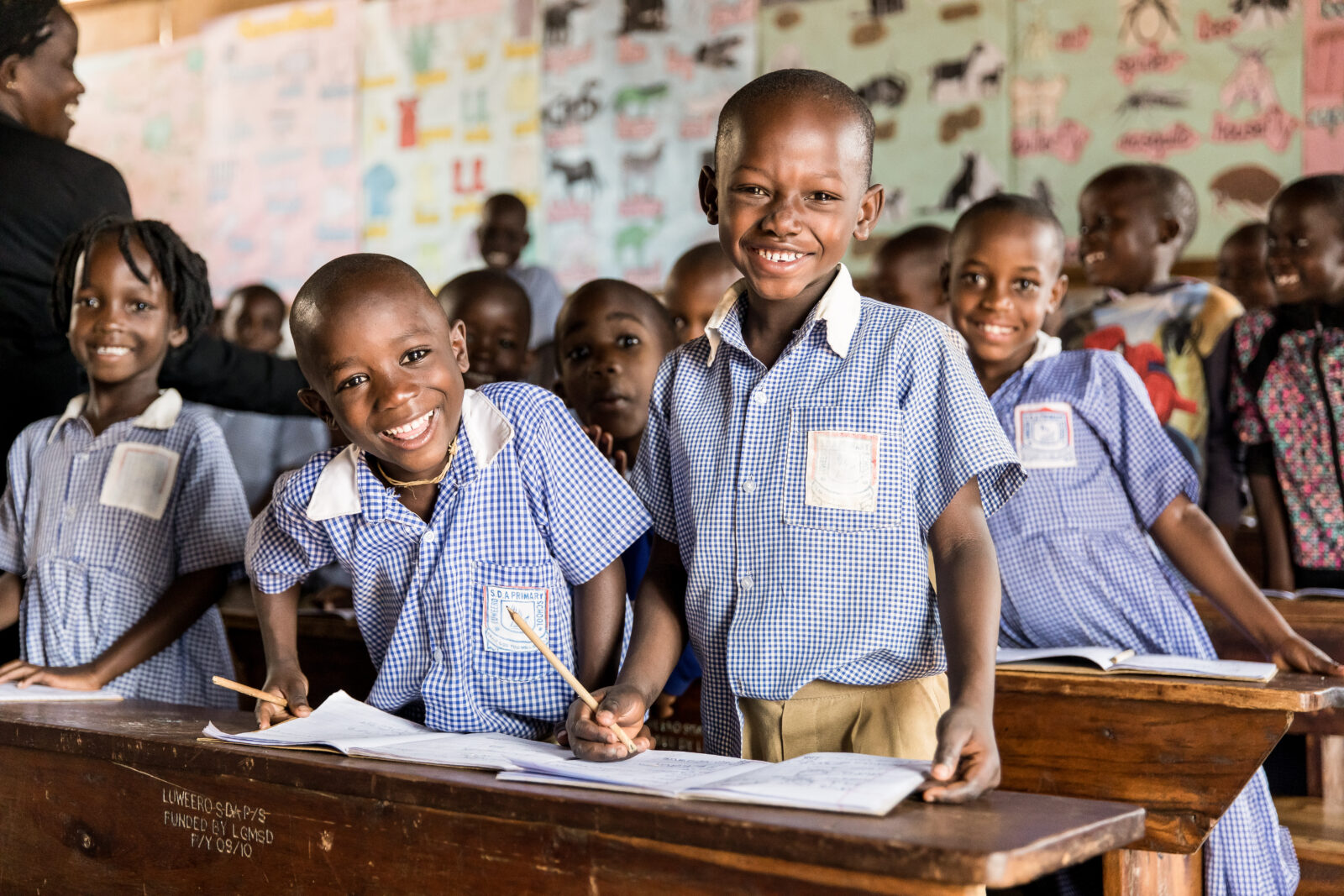
How did Edukans raise funds last year?
3. Our supporters and partners

3. Our supporters and partners

In 2023, we received a total of €6,459,662 from our supporters and partners. Thanks to the generous donations of our partners and donors we made it possible for 701,787 children and young people to embrace their right to learn.
As a result of ongoing violence worldwide and the consequences of the climate crisis, many households worldwide as well as in the Netherlands faced an increase in their cost of living. Both households and companies are facing high inflation rates. Unless these challenges they continued to support Edukans. This being the case, the continuing support from private individuals, companies, schools, foundations and institutional donors was heart-warming. Funding is crucial to achieve the desired impact on inclusive education. The continuously changing donor landscape and the role of Civil Society and INGOs require thorough reflection and the ability to adapt to these developments, without losing focus on our mission and realisation of our strategic agenda.
In 2023, we further elaborated on the design of new funding strategies introduced in 2022. We diversified the ways we acquire new monthly private donors, continued experimenting with crowdfunding, and orientated towards a new ‘always on’ strategy. There is still a lot of work to be done to ensure every child and young person can fully realise their right to education. Edukans will continue to explore (alternative) funding pathways.
Last year we took a step back to look at our strategy for funding from funds and institutional donors. We were partly guided in this by an external fundraising expert. This resulted in an advisory report which will be actively implemented in 2024. We see opportunities in the market and internal processes can be improved. More effort will be put into maintaining good relationships and we will focus on certain target groups.
3.1 Sources of income
We adjusted our programmes and funding strategies last year to align with the rapidly changing global and national environments we are working in. We are working towards a sustainable funding strategy, building long term relations and programme financing going beyond project related funding. INGOs and the systems in which they function require a transformative approach. This requires caution and care within the organisation and in our relationships with our partners. This means lower short-term income but is expected to result in increased funding over the longer term.
Sources of income
Private donors
In 2023, we received €2,883,432 from our private donors, a slight increase of €39,116 as compared to 2022. Edukans has been able to welcome 3,861 new structural donors, mostly due to a successful year of recruiting new donors via door to door, on the streets and a successful pilot at an event. We have seen an increase of 11.5% in income from monthly donors who started supporting us after face-to-face acquisition after Edukans made a few changes to better monitor this channel.
On the other hand we have received a smaller amount of donations from legacies as compared to 2022. We have also seen a decrease in income from incidental, one-off gifts via direct mailings. Specifically, from elderly donors after the Dutch banks stopped processing direct debit cards called Acceptgiro.
“I support an organisation like Edukans because you inspire people to learn. Not only do children get better opportunities. Teachers also develop themselves because they are equipped with the competencies to teach better.”
- Edukans supporter Rachel Heijkoop

Trust funds
In 2023 a total of about 65 foundations provided Edukans with gifts of €680,060 in total. We are happy and grateful for the support of all donors, some of whom have been with us for a long time and some of whom are new partners. This year we were once again able to involve new funds as partners in our work. In 2023, we also focused on finding support for addressing the impact of climate change through quality education. Education can play a role in combating the consequences of climate change. For example, we further expanded the school gardens concept in Malawi with Wilde Ganzen and in Ethiopia with another foundation, new to Edukans.
Our digital SkillEd platform needed support for further development. The CCHO Foundation financed, among other things, the adjustments needed to make the entrepreneurship module suitable for an online environment. For this, we are very grateful.
The collaboration with AFAS Foundation, which came into effect in 2022, was positively assessed, so that the rest of the project can be carried out according to plan. Their support enables us to train 9,000 young people in Kenya. They develop professional and personal skills, matched to needs in the labour market and find work or start their own businesses.

The programmes among refugees in northern Ethiopia are largely funded by international donors. However, Edukans always makes its own contribution, which we raise from many different funds in the Netherlands. One of them, Dioraphte, has been essential in supporting our work here. With their gift of €100,000 we were able to run a programme strengthening education provision in three refugee areas. A separate foundation which has asked to remain anonymous annually contributes €95,000 to the construction of school facilities in this area. For Malawi we received a contribution of €75,000 for our mentoring project with UNICEF, donated by another foundation that prefers not to be mentioned.
The collaboration with Tony’s Chocolonely for a project in the cocoa growing community in Ghana was extended for two years at the beginning of 2023 with €130,000, this time with a new local partner. We will continue to evaluate whether an expansion of the project is possible.
There is a lot of talk in the funding market about foundations giving ‘unlabeled’ money to NGOs. Many funds remain hesitant about donating in this way. However, for several years now we have received an annual contribution from a fund that does not label their gifts. In 2023 we received €25,000. A delegation of the board of this fund visits Edukans annually for an evaluation and a discussion about Edukans’ annual report. We are grateful for their commitment and support.
Nationale Postcode Loterij (Dutch Postcode Lottery)
Edukans is proud to have been a partner of the Dutch Postcode Lottery since 2015. Through this partnership, the Postcode Lottery has helped create opportunities for children and young people enabling them to shape their futures with confidence. In 2023, Edukans received an annual contribution of €500,000. This unearmarked funding allows Edukans the flexibility and predictability to effectively carry out our work for children, young people, schools and their communities.
We are very grateful that in 2023, after a constructive evaluation, the partnership with the Postcode Lottery will be continued for the coming 5 year, enabling us to Unleash the power of education where this is needed most.

“It’s imperative that children and youth have access to quality education enabling them to shape their future with confidence.”
- Marieke Rodenhuis, Head of Charities Dutch Postcode Lottery

Companies
Support from the Dutch private sector is essential for Edukans to effectively do our work. In 2023 Edukans could once again count on the support and engagement of Dutch companies. Our work was supported by 158 companies in the Netherlands contributing €85,007 to Edukans. The support of these Dutch companies is key for our work, both for the financial support as well as their expertise and our partnership. Their motivation and commitment to create opportunities for children and young people through supporting Edukans, maximises our impact.
In addition to financial support, companies also provide Edukans with knowledge and services or support our work by mobilising their network to unleash the power of education. Companies indicate that investing in education and in the futures of children and young people remains pivotal. In the coming years Edukans will further build relationships and engage with companies to achieve more impact for children and young people. A few examples of inspiring collaborations:
Noordhoff
Noordhoff and Edukans have been partners since 2007. Through this partnership, Noordhoff helps to create opportunities for teachers, children and young people. In 2023 Noordhoff supported our exchange programme, World Teacher, and one of Noordhoff’s own staff participated in the programme and travelled to Kenya. Besides their support of World Teacher, Noordhoff supported our crowdfunding campaign for urgent safe education and emergency support for refugee children in Ethiopia. At the end of 2023 Noordhoff also supported the autumn campaign addressing the learning crisis in Malawi, Ethiopia and Kenya. We are very grateful for this longstanding partnership that is committed to unleashing the power of education.
“Where is your cradle? And in what kind of environment do you grow up? The answer to these kinds of questions still largely determines your life path. At Noordhoff, we stand for equal opportunities for every child. In the Netherlands, but also beyond. That’s why we have been supporting Edukans with full conviction for many years. They made it their motto: creating opportunities for children and young people worldwide.”
- Quote Noordhoff

SucceedIT
Since 2017, SucceedIT has supported Edukans, and from 2023 onwards, they have been sponsor of the SBEMpro mentorship programme in Malawi. This initiative aims to boost education access and reduce dropouts by empowering teachers, school administrators, and pupils. We are very grateful for their continued support and commitment to help ensure quality education for children and young people.
Churches
Each year, Edukans can rely on the commitment and support of churches in the Netherlands. The total amount that Edukans received the past year through various church congregations and church organisations is €123,073. This is close to the amount received in 2022.
Institutional donors
2023 was a challenging year for fundraising for education given the number of conflicts and natural disasters which impacted the decisions of donors worldwide. Understandably, the pressing demands for humanitarian aid meant less funding was available for other causes. This affected the amount of funds we received. Furthermore, Edukans opted for a different fundraising strategy in 2023. This strategy is focused on investing in long term donor relations and co-development of programmes. The new focus will provide new opportunities in 2024 for projects in our focus countries.
In total we received over 1.8 million euros in institutional donor funding. For Ethiopia and Malawi, we received support from UNICEF for our Education in Emergencies and mentorship programme, reaffirming our relationship with this donor and strengthening our position as education expert. In Ethiopia we also received funds from the Embassy of New Zealand and the International Labour Organization (ILO). With the ILO funds we will strengthen the financial and technical capacity of non-profit youth-led organisations. If this pilot project proves successful, it will create a new youth employment support pathway for Edukans.
In 2024 we will continue our strategy of building strategic partnerships with donors, resulting in long term projects with more durable results. Strengthening our relationship with these important donors will help us work towards the United Nations Sustainable Development Goal 4, the ambition to achieve quality education for all.
Schools
Edukans is grateful for the contribution of €181,553 from schools. The connection with the Dutch educational community is highly valued. Several schools have actively organised impactful fundraising events and activities, particularly for the emergency response in Ethiopia and later to address the learning crisis in Kenya, Malawi and Ethiopia. We deeply appreciate these efforts and are committed to fostering relationships and engaging with young people to emphasise the importance of quality education.

3.2 Campaigns draw new supporters
We are always looking for innovative ways to enable Dutch target groups to support Edukans’ work. In the past year, we once again reached our target groups through various campaigns. We rolled out a new crowdfunding campaign, organised an inspiring day for our loyal supporters and moved towards a new ‘always on’ strategy. A few highlights from the Edukans campaigns in 2023 include:
Campaign
Crowdfunding for Ethiopia
In February we launched our second Edukans crowdfunding campaign. This time for the crisis in Ethiopia. War and extreme drought are forcing families to flee their homes. Hunger and dehydration are lurking. Many children can no longer go to school even though school is the only place that can offer them a hopeful future. We took action to make sure that children in Ethiopia continue to go to school. Thanks to our supporters we were able to donate school supplies, clean drinking water and meals at school. By providing these essentials, we ensure that parents continue sending their children to school: a safe haven. In total we raised €22,089,20. Most donations were made by individuals.

Positioning
‘Always on’ strategy
In 2023 we moved towards a new ‘always on’ strategy to ensure that Edukans always remains in the back of the minds of our (potential) supporters. By being continuously present on-line and off-line, we build on brand awareness and enhance our reputation as the education specialist for the Global South. A strong and present brand will help improve the results of our online lead generation and donor acquisition campaigns. In 2024 we will implement this new approach, including the creation of new corporate materials for television and radio spots and print ads.

Event
Supporters Day
After many years of covid restrictions, we were finally able to meet our donors again. In October we organised an inspiring day for Edukans supporters at the Open Air Museum in Arnhem. By sharing insights on the themes and projects we are working on, we involve our donors. Petra van Haren spoke about the challenges and results of the past year and inspiring stories from Edukans colleagues in our country offices were shared. We had interesting conversations with our donors and volunteers and have received positives responses and valuable input.

Campaign
Crowdfunding for Ethiopia
In February we launched our second Edukans crowdfunding campaign. This time for the crisis in Ethiopia. War and extreme drought are forcing families to flee their homes. Hunger and dehydration are lurking. Many children can no longer go to school even though school is the only place that can offer them a hopeful future. We took action to make sure that children in Ethiopia continue to go to school. Thanks to our supporters we were able to donate school supplies, clean drinking water and meals at school. By providing these essentials, we ensure that parents continue sending their children to school: a safe haven. In total we raised €22,089,20. Most donations were made by individuals.

Positioning
‘Always on’ strategy
In 2023 we moved towards a new ‘always on’ strategy to ensure that Edukans always remains in the back of the minds of our (potential) supporters. By being continuously present on-line and off-line, we build on brand awareness and enhance our reputation as the education specialist for the Global South. A strong and present brand will help improve the results of our online lead generation and donor acquisition campaigns. In 2024 we will implement this new approach, including the creation of new corporate materials for television and radio spots and print ads.

Event
Supporters Day
After many years of covid restrictions, we were finally able to meet our donors again. In October we organised an inspiring day for Edukans supporters at the Open Air Museum in Arnhem. By sharing insights on the themes and projects we are working on, we involve our donors. Petra van Haren spoke about the challenges and results of the past year and inspiring stories from Edukans colleagues in our country offices were shared. We had interesting conversations with our donors and volunteers and have received positives responses and valuable input.

For schools and companies
Donate your deposit to Edukans
With the Edukans PET bottle container, you can easily collect empty bottles and cans as a school, company or association. The collected deposit is donated to Edukans. This campaign helps prevent waste from littering nature and contributes to the environment in the Netherlands. With the money raised we can provide pupils in our focus countries access to better education. We have planned a pilot project in 2024 to involve more schools and companies.

Campaign
Vote with your (educational) heart!
To coincide with the Dutch elections, held on November 22nd, we created the Edukans electoral guide. In the new political landscape the theme of foreign aid & trade is not high on the political agenda. In our electoral guide Edukans supporters were able to check how political parties score on support for education and international cooperation, both critical in realising the Sustainable Development Goals in 2030.

Campaign
Autumn campaign against the learning crisis
In November and December we ran a campaign on tackling the learning crisis in Ethiopia, Kenya and Malawi. Too many children drop out of primary school due to poverty or conflict. Or they stay in school, but the quality of education is so poor that they can barely read and write after 8 years. We called on companies, schools, foundations, funds, churches, and private individuals to take action as we aimed to raise enough money to provide 3,200 children with good education. Our goal was to raise a total of €40,000 and this goal was achieved. In total we raised €58,652.49, enough money to provide 4,692 children with good education.

For schools and companies
Donate your deposit to Edukans
With the Edukans PET bottle container, you can easily collect empty bottles and cans as a school, company or association. The collected deposit is donated to Edukans. This campaign helps prevent waste from littering nature and contributes to the environment in the Netherlands. With the money raised we can provide pupils in our focus countries access to better education. We have planned a pilot project in 2024 to involve more schools and companies.

Campaign
Vote with your (educational) heart!
To coincide with the Dutch elections, held on November 22nd, we created the Edukans electoral guide. In the new political landscape the theme of foreign aid & trade is not high on the political agenda. In our electoral guide Edukans supporters were able to check how political parties score on support for education and international cooperation, both critical in realising the Sustainable Development Goals in 2030.

Campaign
Autumn campaign against the learning crisis
In November and December we ran a campaign on tackling the learning crisis in Ethiopia, Kenya and Malawi. Too many children drop out of primary school due to poverty or conflict. Or they stay in school, but the quality of education is so poor that they can barely read and write after 8 years. We called on companies, schools, foundations, funds, churches, and private individuals to take action as we aimed to raise enough money to provide 3,200 children with good education. Our goal was to raise a total of €40,000 and this goal was achieved. In total we raised €58,652.49, enough money to provide 4,692 children with good education.

3.3 Lobby: education on the political agenda
In 2023 Edukans actively participated in the Global Campaign for Education in the Netherlands (GCE), both as a member and, this year, as chair. GCE-NL celebrated its 20th anniversary in which progress towards achieving UN Sustainable Development Goal 4 (SDG4 – education) was acknowledged and we looked forward to a future in which education will support the achievement of all the SDGs. GCE reaffirmed its mission: for as long as the quality of education throughout the world is not sufficient, with 250 million children not attending school and there is a shortage of 44 million teachers. If we continue at this page SDG Quality Education (4) and inclusive and Descent Work and Economic Growth (8) will only be achieved in half a century (and not in 2030). To thrive in this new era Education plays a key role.
Edukans, together with GCE will step up and stay active! Our position as chair will be continued in 2024 and we will focus on building collaboration in positioning education in the political arena and all the Netherlands government to action to support educational development.
In April 2023 Edukans, together with VSO and Randstad, organised the conference ‘Connection Works!’. The focus of the conference was establishing social connections that work and strengthen our partnerships to ensure education, skills training, and decent work for young people. Together we want to create impact at scale and close the gap between the potential and aspirations of young people and the decent jobs and skills training that are needed for success on the labour market in African countries.
There is an urgent need for education systems to impact higher skills aligned with the needs of growing economies, where job skill sets are fast changing, many being automated. Edukans is also member of the PerspActive Network, in a joint effort to advocate for the importance of skills development and descent job creation for young people.
Before summer started the Dutch Minister for Foreign Trade and International Cooperation (BHOS) presented the first Africa Strategy until 2032 to support the relation and cooperation with Africa. Through the networks Global Campaign for Education Netherlands (GCE-NL), Partos and PerspActive, Edukans responded to the lack of educational support in the strategy. Our response covered a strong call on basic skills such as reading and writing, teacher training and education financing. Resulting in a political party requesting attention for including the development of education and workforce programs within the Africa Strategy short-term priorities. This suggestion was approved by the members of parliament and the points on education will be adopted into the strategy.
The political landscape in the Netherlands has changed and is not in support of international cooperation. This leads to some reflective questions and repositioning of our role, in consultation of and collaboration with other INGOs. Edukans will continue to advocate at the Dutch government as well as in our focus countries for the critical role of primary education, qualified teachers and skills development for young people in achieving sustainable development.
Advocacy in our country offices
All Edukans country offices are members of Global Campaign for Education (GCE). Our advocacy work is illustrated by the two examples below, one in Ethiopia and the other in Malawi.
Advocacy in Ethiopia
Edukans Ethiopia has been conducting advocacy work on inclusion of displaced people in the education system and youth employment opportunities of the host communities in three Regional States: Afar, Tigray and Somali. We have been lobbying the Ministry of Education, Regional Education Bureaus (REBs), Regional Job Creation Commissions (JCCs), District Education Office (DEOs) and College of Teachers Educations (CTEs) in the abovementioned regions to include displaced children and young people in their education and youth skilling training and employment plans. Through our advocacy work in the last year, we have linked 3 REBs, 18 DEOs, 6 CTEs, and 3 TVETs with more than 25 refugee and IDP camps/schools in Afar, Somali and Tigray regions benefitting more than 85,000 displaced children and about 800 young people.
Advocacy in Malawi
In 2023 we implemented a major project, namely the UNICEF mentorship project which reached out to around 10,000 teachers and 225,000 pupils. The purpose of the project is to promote quality of education through provision of mentorship opportunities for teachers and increased learning outcomes for learners. The project led Edukans to note that one major issue was the acute shortage of teachers at basic education level. In addition, most teachers lacked motivation due to limited opportunities for promotion. The country office then engaged in lobby meetings with government officials to demand recruitment and promotion of teachers. By the end of the year, the government had recruited and deployed no less than 4,125 primary teachers under the Malawi Education Reform Programme. In addition, at secondary education level, the government promoted more than 1,000 secondary teachers and recruited 2,644 teachers.
Another ongoing advocacy activity involved advocating for increased funding for the education sector to ensure more resources are available for basic education and skills programmes. In 2023 the country office attended high profile events targeting parliamentarians, the ministry of finance and education officials to influence them to ensure increased allocation for the education sector. The target is to reach the international recommendations for low-income countries of 6% of GDP and 20% of the national budget to be allocated to the education budget. Edukans also lobbied for donors and higher income nations such as the Netherlands, to increase their funding for education in Malawi.
Edukans was involved in budget analysis workshops conducted by NGOs/CSOs which helped: quite interesting craft the advocacy messages. Then Edukans attended a lobby meeting with the Education committee of parliament organised by Civil Society Education Coalition (CSEC) as well as pre-budget consultative meetings organised by Ministry of Finance. Furthermore, Edukans took part in the annual joint sector review organised by the Ministry of Education. Consequently, the education budget increased by 30% from €231 million in 2022/23 to €302 million in 2023/24. The largest share of the education budget, 53%, went to the basic education sector, compared to 20% for secondary and 21% for higher education. As share of total public expenditure, education was allocated 4% of the GDP and 16% of the national budget. Both figures remained the same as for the previous year and fell short of the international recommendations for low-income countries to allocated 6% of the GDP and 20% of the national budget. The advocacy for increased allocation for education will continue in the year 2024.
Edukans also remained active in advocacy networks including the local GCE coalition (CSEC) to which the Country Director was re-elected Chair of the Board; and took part in the 2023 NGO Day organised by NGO Regulatory Authority (NGORA), presided over by the State President. During this event, Edukans staff hosted a pavilion show casing the Edukans country office projects and contributions to the education sector. Flagship projects presented included the mentorship project funded by UNICEF and the Eco-Star Projected jointly funded by Edukans NL and Wilde Ganzen.

Finally, Edukans took part in international education mobilisation events, including the Global Action Week (April), UNESCO Education Conference and the Africa Regional Education Policy Forum organised by GCE and Africa Network Campaign on Education for All (ANCEFA). The Policy forum which took place in Addis Ababa was of particular interest because it was held in preparation for the 2024 Year of Education for the African Union. It therefore involved officials from the Education Commission of the African Union, UN Agencies (UNESCO and UNICEF), and involved international debates on the theme of education.
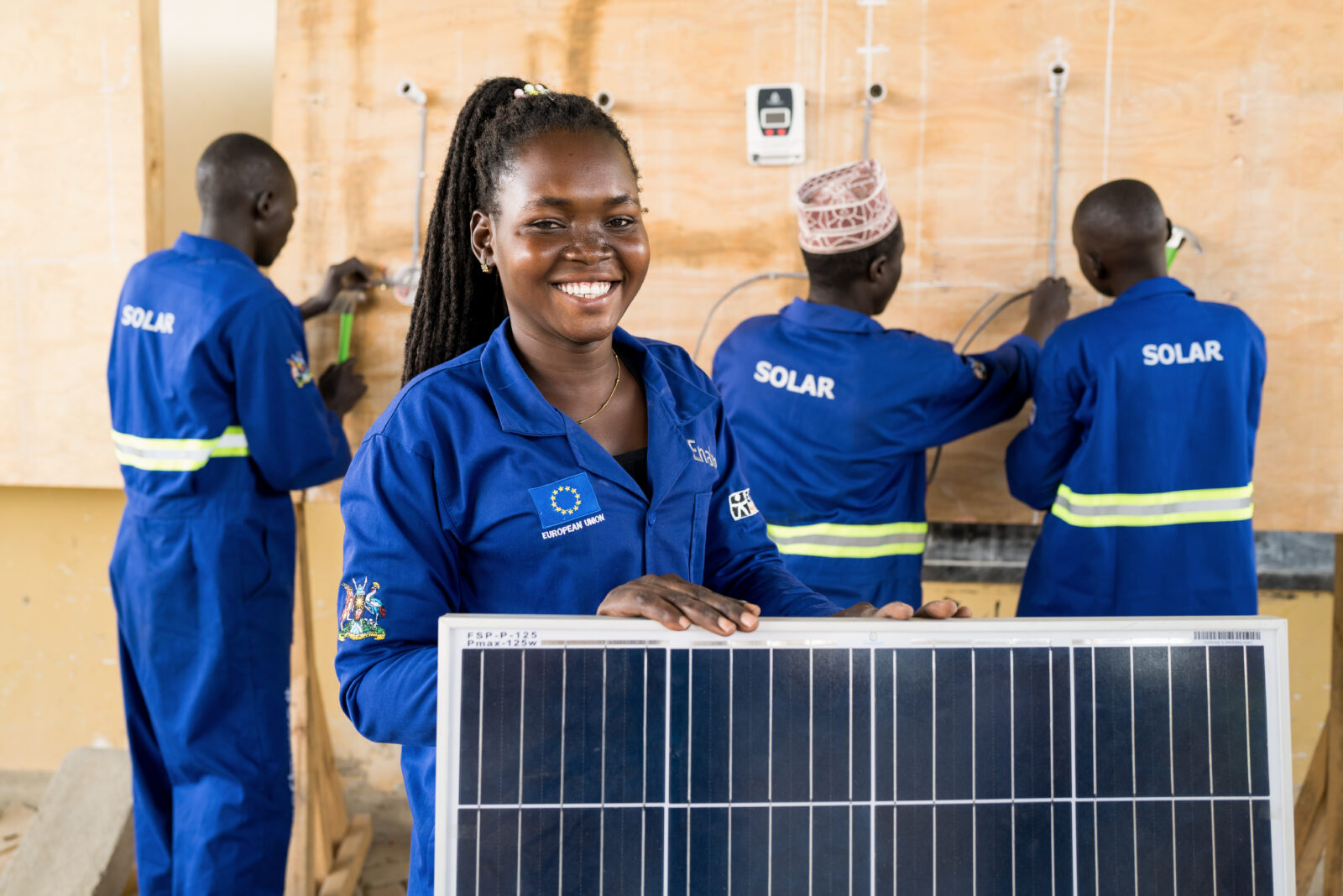
What did we learn from last year?
4. Lessons learned

4. Lessons learned

Strategy
Edukans is currently implementing its strategic focus for 2021 -2025. Priority is on ensuring quality education and creating future prospects for children and young people worldwide. We learned that, in order to be more successful, a borderless organisation with an international management is necessary to strengthen education systems and scale up programmes. Sadly, it has also become clear that global developments and the political climate in the Netherlands are not supportive of international cooperation and international education. This leads to financial uncertainty for the organisation.
A mid-term review was initiated at the end of 2023 to assess progress on the realisation of the strategic agenda and, based on the outcome of that review, to make adjustments where necessary. Inclusive education, climate, and digitalisation are an increasingly important part of our programmes. Scaling up our programmes remains a challenge because relationships are built at different levels and it requires a transition to a different role for Edukans. As a result, we are putting extra effort into these two aspects in 2024. We started in 2023 with building strategic partnerships. This takes time but it is effective and will be expanded in 2024.
Fundraising
Funding for programmes and projects is essential to generate the desired impact on education. The constantly changing donor landscape and the role of civil society and INGOs require deep reflection and the ability to adapt to these developments, without losing focus on our mission and realisation of our strategic agenda.
The number of donors providing funds for Education in Emergencies and Skills for Work and Life shows an upward trend, while Basic Education is not high on the agenda of several donors, e.g. the Ministry of Foreign Affairs. This may lead to a shift in the balance of funding available for projects. Basic Education remains a high priority for Edukans, making it important for us to explore (alternative) funding pathways for both foundations and institutional fundraising. It also stresses the importance for Edukans to continue to advocate for quality education both with institutional donors as well as with governments.
We continue to pursue a better understanding of donor trends and thereby create detailed donor strategies in collaboration with the fundraising team. Edukans aims to transfer short term funding for Education in Emergencies into long term sustainable programming.
Programmes
Basic Education
Schools for primary education are central to our Basic Education programmes. However, in line with our vision of continuous learning, together with reflection on research and donor trends, we will look to position ourselves more broadly on the education spectrum: from early childhood to lower secondary education. We see a successful integration of digitalisation and blended learning in projects. However, we learned that there is also a need for dedicated efforts in enhancing the digital skills of teachers, educators and trainers to maximise the effectiveness of our digital tools. Staying informed about innovations in the educational field is crucial. One way in which we want to improve in this is through increased cross-country learning sessions to stay updated on trends.
Education in Emergencies
In 2023, Education in Emergencies has become a separate programme pillar in order to organise education in fragile settings more effectively. Teachers in emergency settings were trained by Edukans on Learning and Behaviour Support (LBS). During the trainings teachers frequently commented that the biggest impact the LBS support had was on their relationship with the children. The training made them aware of their own attitudes. Applying positive feedback and offering encouragement to pupils with learning or behaviourly difficulties in the classroom resulted in better learning achievements.
In addition, we learned the importance of Mental Health and Psychosocial Support (MHPSS) for conflict affected teachers and their pupils. Even in locations where protection services are available, teachers need the tools for themselves and their pupils whose trauma manifests in bullying, discrimination and other types of social pressures. To enable this, Edukans integrates life skills in the teaching methodology, in addition to involving pupils in art and music, resulting in proven improvement in the school performance and mental wellbeing of the pupils.
A lot of undergraduate teachers are involved in the Education in Emergencies projects. There is a need to lobby the regional education bureaus to include and incentivise under-graduate teachers, both refugees as well as national teachers, in the summer courses at the teacher training college. In some Education in Emergencies contexts, there is also a need to provide diplomas or certificates to teachers and pupils who pass their exams.
Skills for Work and Life
In our Skills for Work and Life programmes, the capacity building training on ATL methods, the 7-steps to WORK approach, life skills and Work Based Learning has increased not only the performance but also the motivation of trainers, reduced dropout rates of pupils, and contributed to an increase in their self-confidence. Digitalisation is increasingly important in achieving these improvements in the area of skills training. In areas with no formal TVET colleges or formal skills training centres, implementation of non-formal skills training was found very useful in increasing job prospects for young people. The integration of life skills and gender in trainings led to a change in the attitude of young people towards gender roles.
Multistakeholder forums contribute to strengthening the partnership between TVETs, government sector offices and companies. Companies have been key players when it comes to improving the quality of the training through facilitation and support of Work Based Learning.
Exchange
Quality, inclusion and sustainability are core values of our new strategy. As a result, the Exchange programme was adapted according to criteria of inclusiveness, equality and sustainability. This resulted in the termination of the Going Global programme and restructuring of the World Teacher programme into a Global World teacher Platform to facilitate the exchange of pedagogical skills and active learning skills of teachers. This programme and platform will be further developed in 2024.
Organisational culture
The organisational culture has received a lot of attention over the past year, amongst other things through the implementation of an organisational culture course. This has led to many new insights into cooperation and more active communication between teams about intercultural differences and cooperation.
Safety and security
Edukans’ safety and security policy, together with the crisis management protocol, has proven to be effective and offers support in handling safety situations. In doing so, Edukans struck a good balance between acting in accordance with protocol and policy and paying attention to the impact on the organisation and employees.
Integrity
Providing a safe working environment for staff members, teachers, scholars and partner organisations is high on the agenda within Edukans. To make sure that the integrity system is completely implemented, it is necessary to keep integrity on the agenda and actively invite staff members and partners to discuss sensitive issues together with respect for each other.
All staff members have followed an online Prevention of Sexual Exploitation and Abuse (PSEA) course. This has increased the level of consciousness of the importance of protection from sexual exploitation and abuse.
When discussing sensitive issues, the most important thing is that human rights are protected and we show each other respect. Edukans stands firmly for inclusion and respect of human rights. Therefore, in 2024, moral deliberations will be continued to contextualise integrity and support a culture of open communication.
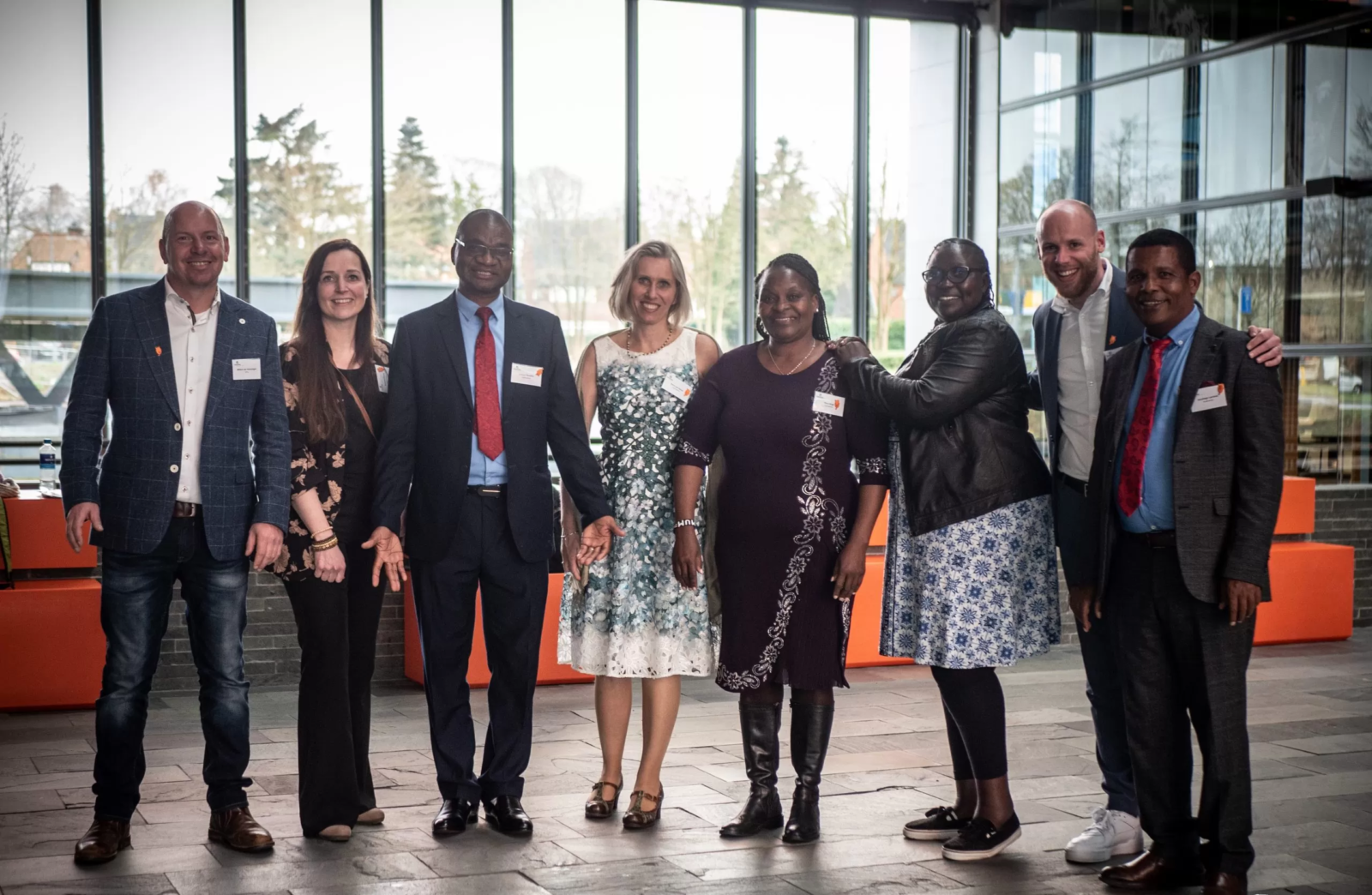
What does our organisation look like?
5. Governance and organisation

5. Governance and organisation

Edukans was founded in 2002 and is pursuing a worldwide mission to create opportunities, enabling children and young people to shape their futures with confidence. Edukans’ work could not succeed without our professional and dedicated staff across the world, our dedicated volunteers and our ambassadors.
5.1 Organisational chart

5.2 Organisational structure and cornerstones approach
Edukans works across borders to enable as many children as possible to achieve better results in learning. In 2023 we continued to learn and develop towards a borderless organisation with decentralised roles and responsibilities for Country Office operations, (national) fundraising and project implementation.
In our focus countries, the country directors take the lead in and are responsible for securing and carrying out projects. The Edukans team in the Netherlands is responsible for the overall financial management, planning, and control cycle, as well as developing programme strategies, marketing, communication and global and private fundraising. Edukans Netherlands has an enabling and facilitating role towards the Country Offices.
One Strong Edukans: a borderless organisation (decentralisation)
Edukans has embarked on a journey to become a borderless organisation, characterised by decentralised responsibilities and a shared sense of purpose. Our vision is to foster a vibrant, inspiring work environment where every member understands their value and responsibilities. We are committed to effective, respectful communication and collaboration, all aimed at creating inclusive educational opportunities that empower children and young people to confidently shape their futures.
Environmental Social Governance (ESG)
Edukans developed its Environmental Social Governance (ESG) policy in 2023. This policy will enhance our sustainable development and decision-making processes, better communicate our mission, and deepen stakeholder engagement. Key areas of focus include:
- Minimising greenhouse gas emissions through practices such as reduced travel.
- Promoting diversity and inclusivity in the workplace, emphasising health and safety with tools like the Compass Approach.
- Ensuring a balanced representation on the board in terms of gender and geography.
Progress on the targets as stated in this policy for 2024 will be reported in the trimester reports and the annual report for 2024.
Cornerstones approach
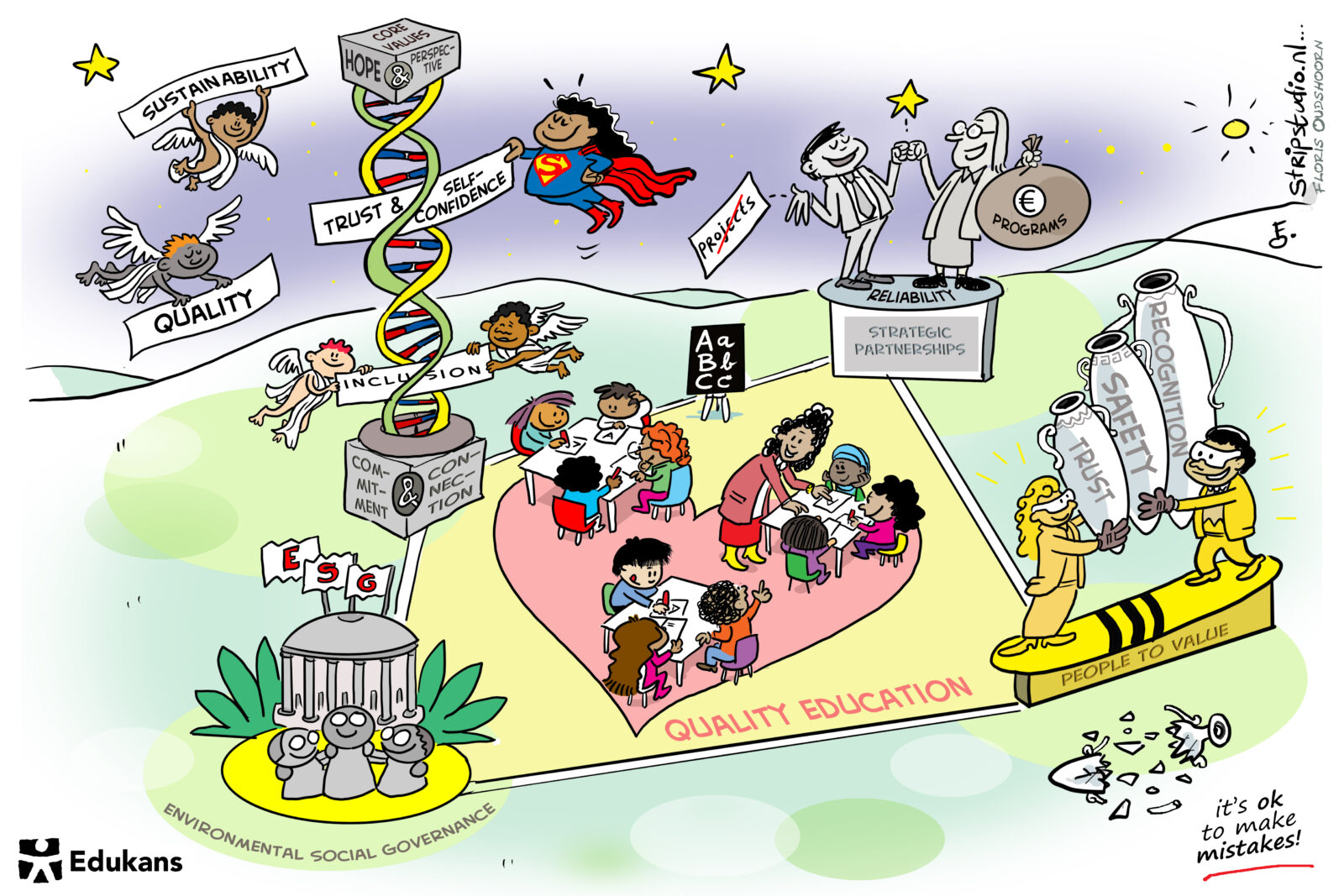
Obviously, quality education is at the heart of the organisation which is built on 4 cornerstones:
- Edukans DNA is reflected in our core values: Trust & Self-confidence, Hope & Perspective, Commitment & Connection to each other. Core values reflecting our way of working are sustainability, inclusiveness, and quality and form an integral part of our Edukans DNA.
- Edukans is committed to strategic partnerships. We are building long-term relationships with our partners in the countries where we operate and with those partners who support the work of Edukans. We are seen as a reliable partner who delivers as promised; partnership goes beyond project relationships.
- People to Value: Our staff and the people we work with are of great importance. They are not just resources to manage, but people to value. To make employees feel valued it is important to give them the recognition they deserve. Creating a culture of mutual trust is key. Edukans aims to create a safe environment for all our staff, this includes creating a safe learning environment, high integrity standards, and continuing to make safety and security a priority. We recognise that you learn most from your mistakes and failures. It is okay to make mistakes.
- Environmental Social Governance: In 2023 Edukans developed an ESG policy that will support Edukans in sustainable development and decision making, in demonstrating the mission, and in stakeholder engagement on environmental, social, and governance issues. The ESG policy reflects the position of Edukans, the issues identified and how these will be addressed. Furthermore, respect for gender equality, diversity and inclusion is a priority for Edukans at both a national and global level. This is reflected in our recruitment and HR policy however the effect may only become visible in the longer term.
5.3 HR
People to value
Our staff and the people we work with are of great importance. They are not just resources to manage, but people to value. To make employees feel valued it is important to provide them with the recognition they deserve. Building trust is key.
Critical reflections are important to grow, develop and learn as an organisation. Feedback should always be provided on the result and not on the person. Working on education we recognise that you learn most from your mistakes and failures. It is okay to make mistakes.
Edukans wants to create a safe environment for its staff, this includes creating a safe working environment, high integrity standards, continuing to make safety and security a priority. Edukans will develop a ‘compass’ approach aiming at personal leadership creating ownership and accountability.
This way of working focuses on personal leadership and how to make best use of qualities and talents. Individual goals will be related to team goals, and these will be related to organisational goals.
A personal compass, team compass and organisational compass will be developed. This compass approach is related to and part of the cultural trajectory ‘One Strong Edukans’.
Respect for gender equality, diversity and inclusion is a priority for Edukans at a global and national level. This will be reflected in the recruitment and HR policy. The effect may only be visible in the long term.
Recruiting and retaining qualified staff
Edukans aims to recruit and retain qualified staff, dealing with the challenges of a tight labour market, UN organisations and large INGOs offering salaries leading to a strong upward salary trend especially in the Global South, and changing roles and responsibilities of functions in the Netherlands.
Our staff and salary
Edukans is highly committed to providing our staff with a safe working environment where they can flourish and where they can carry out their profession in the best possible way, even under challenging circumstances. Edukans has Human Resources safety and integrity policies in place to ensure professional human resource management and development. The COVID-19 pandemic has made us even more aware of the importance of the health and well-being of our staff. Edukans had a relatively high level of absenteeism of 8.11% (8.44% corrected for part-time staff), due to various. long-term and chronical illnesses. In addition, the organisational change also asks a lot of our staff.
Edukans does not have its own generally binding collective labour agreement but follows the terms of employment regulation (AVR) and associated salary scales of the Protestant Church in the Netherlands (PKN).
In 2023, Edukans has updated all regional HR policies, country office salaries have been benchmarked with similar organisations and regional benefits have been harmonised, based on the advice of the regional HR advisor.
Edukans conducted an employee satisfaction survey at all country offices indicating a high level of staff satisfaction at all levels in terms of clear tasks and responsibilities for staff, well-being, and leadership. Some valuable lessons have been taken from this survey.
Our staff
| Edukans | Netherlands | Edukans | Ethiopia | Edukans | Uganda | Edukans | Malawi | Edukans | Kenya | |
|---|---|---|---|---|---|---|---|---|---|---|
| 2023 | 2022 | 2023 | 2022 | 2023 | 2022 | 2023 | 2022 | 2023 | 2022 | |
| Average number of FTE | 21.4 | 21.7 | 24.0 | 22.1 | 6.0 | 4.5 | 5.3 | 3.1 | 6.0 | 5.9 |
| End of the year number of staff | 26 | 28 | 21 | 27 | 6 | 5 | 6 | 4 | 6 | 7 |
| Gender balance | ||||||||||
| Female | 69% | 71% | 34% | 33% | 50% | 60% | 67% | 25% | 50% | 57% |
| Male | 31% | 29% | 66% | 67% | 50% | 40% | 33% | 75% | 50% | 43% |
5.4 Volunteers and ambassadors
In 2023 Edukans worked with 28 volunteers who enthusiastically and unselfishly committed themselves to Edukans. They provide a valuable contribution to our exchange programmes and offer support by doing a wide range of work activities at the Edukans office. In consultation with our volunteers, we are looking into different roles not least because our Exchange programme is now implemented in a different way.

We are proud of our ambassadors Sofie van den Enk, Bracha van Doesburgh, Martine van Os, Nick Schilder and Ron Boszhard and how they advocated for Unleashing the power of education, resulting in a growing support for the work of Edukans.
Therefore, a very special thanks goes out to our volunteers and ambassadors who never wavered in their commitment and enthusiasm to support Edukans in striving for quality education. We could not have done it without them, and we look forward to resuming our activities in 2024.
5.5 New supervisory Board
In May 2023, 3 new members were appointed to the Supervisory Board. Members of the Supervisory Board of Edukans are appointed for a period of five years and may be reappointed twice. As at 31 December 2023 the Supervisory Board consisted of the following members:
- J. Mesman, chairman, as a member responsible for integrity, Professor (Youth & Society) at Leiden University. Field of expertise: education, pedagogical skills, diversity and inclusion (appointed in 2023).
- Mr. D.M.J. Haaksma, chairman audit committee, Director Finance, Control & Analytics at Stichting Hogeschool in Utrecht. Field of expertise: accountancy (appointed in 2022).
- K.R. Rosalina, as a member responsible for integrity, educationalist and consultant at Drakenfruit. Field of expertise: education (appointed in 2023).
- R.N. Zomer, member audit committee, Manager International Business at Evofenedex. Field of expertise: Fundraising, small medium enterprises, (appointed in 2023).
None of the members of the Supervisory Board have declared additional positions which may conflict with their membership of the Supervisory Board of Edukans. Each year, the members of the Supervisory Board receive attendance fees in line with the guidelines of Goede Doelen Nederland and CBF.
The Supervisory Board acts in accordance with the provided framework and the ‘Regulations of the Supervisory Board’. The audit committee consists of two members of the Supervisory Board. The Supervisory Board monitors continuity, supervises the realisation of strategic objectives, reviews the quality of management, and advises the management board about relevant social developments. The Supervisory Board approves the strategic plan, the annual plan and budget, the annual accounts and the annual report, including auditors report, as part of the financial planning and control cycle, and focuses on the assessment of financial management and the quality of controls. In 2023, The Supervisory Board held 5 meetings.
The current Strategic Agenda 2021-2025 was approved by the Supervisory Board in November 2020. In December 2022 the Supervisory Board approved a revision of the strategic plan supporting sustainable investment in the development of Edukans as one global organisation as part of the annual plan for 2023.
5.6 Executive board and management
Petra van Haren is the executive director. The executive board of Edukans is appointed by the Supervisory Board. The authority of the executive director and the relationship between the executive director and the Supervisory Board are laid down in the articles of association, the Regulations of the Supervisory Board and the Bylaws. Based on the managerial assessment framework and the job description of the director, there are performance reviews with the executive director every year.
The salary of the executive director of Edukans has been determined in accordance with the Code of Good Governance for Charities (Wijffels Code), set in scale 15 of the Civil Servants’ Pay Decree.
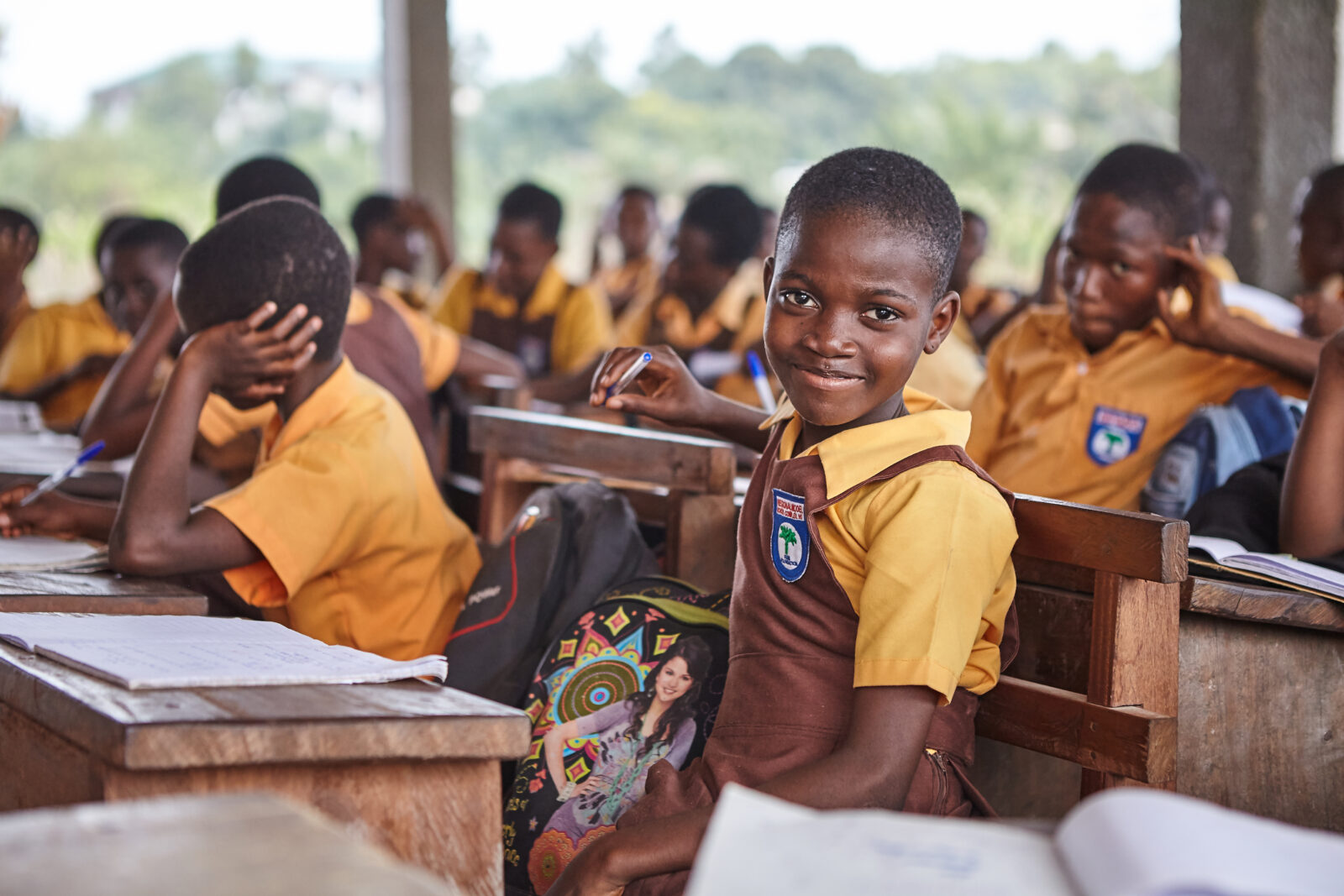
Want to read more about transparency and accountability?
6. Transparency and accountability

6. Transparency and accountability

6.1 Statement of responsibility
Edukans holds a quality mark issued by the Dutch Central Fundraising Bureau (CBF). It includes the Code of Good Governance of the Wijffels Committee. In the statement of responsibility, Edukans indicates how it implements the three main principles of the CBF quality mark:
1. Distinguishing supervision, management and performance
2. Optimisation of effectiveness and efficiency of spending
3. Optimisation of dealings with stakeholders
1. Distinguishing supervision, management and performance
Edukans has a board with a two-tier structure with an emphasis on dialogue with stakeholders and focus on achieving consensus. This governance model follows the subsidiary principle to ensure decisions are made as closely as possible to the deepest levels in the organisation with checks and balances between local and international decision-making in place.
The International Management Board of Edukans consists of four Country Directors, the Programme Manager, The Fundraising and Communication Manager and the statutory CEO.
To guarantee a separation of functions and to prevent conflicts of interest, no close relationships are permitted between members of the Supervisory Board and the International Management Team. In addition, no connections are permitted between any of these members and an organisation with which Edukans, in the normal course of its work, conducts transactions that can be valued in monetary terms. In case of a potential conflict of interest, this will be resolved through discussion.
2. Optimisation of effectiveness and efficiency of spending
Edukans is always seeking to improve quality. For the implementation of its educational programmes Edukans has an extensive knowledge system that monitors the quantitative and qualitative results that were targeted for each programme. This shows both the increase in the number of children and young people going to school or enjoying better quality schooling as well as the extent to which learning outcomes have improved and whether young people experience increase of employment opportunities as a result of the interventions by Edukans. For each programme, several qualitative results are also monitored, for example the available educational resources or the level of training of the teachers. Both the availability and quality of education are key indicators for Edukans. Through the strategic plan and the budget, Edukans will determine the guiding objectives.
Following the CBF guidelines on ratios for effective and efficient spending, the management board has set standards for objectives and the costs that may be incurred to achieve the objectives. A multi-annual forecast and annual budget is prepared, discussed in the audit committee and approved by the Supervisory Board. In case of a deviation of the spending of resources in relation to the budget this is reported to the International Management Board, addressed in the audit committee and stated in the management report to the Supervisory Board.
3. Optimisation of dealings with stakeholders
The direct stakeholders of Edukans are children and young adults, teachers and public and private partner organisations in the focus countries, donors, subsidy providers, employees and volunteers. Expectations and means of collaboration are made explicit in Memoranda of Understanding and other legal agreements. Due diligence is performed to mitigate financial, capacity and integrity risks. Contact with these stakeholders is maintained through various means of communication. Regularly, stakeholders are asked for their feedback which is then used to improve our services. Guidelines and procedures are laid down in the ISO procedure. In addition to personal contacts, collaboration with partner organisations is given substance through partner consultations, closely connected as they are with future policy development.
6.2 Integrity
Providing a safe working environment for staff members, teachers, scholars and partner organisations is high on the agenda within Edukans. An Integrity Committee consisting of three senior members monitors the effectiveness of the integrity system, coordinates the handling of a formal report and leads the development and implementation of policies, procedures and tools that support a culture in which people feel safe to discuss ethical dilemmas (moral deliberation) and dare to speak-up.
All staff members, Supervisory Board Members, volunteers and participants representing Edukans need to sign the Edukans Code of Conduct, the Child Protection Policy and the Code of Conduct: Protection from Sexual Exploitation and Abuse Policy. In addition, all staff members need to successfully complete the Prevention of Sexual Exploitation and Abuse (PSEA) training on the UNICEF Agora platform. A VOG statement is part of the recruitment and selection procedure for staff in the Netherlands. A Confidentiality Advisor has been appointed and trained for staff members to discuss any concern confidentially. Edukans participated in the moral deliberations organised by Partos in the Netherlands and in 2023 moral deliberation sessions took place during the (international) stand-ups. To make sure that the integrity system is completely implemented, it is necessary for talking about integrity to become a regular point of attention within the organisation and integrated in our daily work. Therefore, in 2024, moral deliberations will be continued to contextualise integrity and support a culture of open communication. The Edukans Integrity Policy, which was updated and approved in June 2023, includes guidelines on how to file a report and provides links to communication channels. In addition to the formal reporting channel integrity@edukans.nl Edukans opened up an additional communication channel (via WhistleB) where people can report anonymously.
In 2023 two cases have been reported to the integrity committee, one of them turned out to be a human resources issue and has been addressed accordingly.
The second case concerned serious integrity case at one of our country offices has been reported to, and investigated by the integrity committee in May 2024, concerning our financial administration in 2023. Although reported in 2024, it affected annual report 2023 and is therefore registered in annual report 2023. This case has been investigated in line with our integrity policy. Edukans has a zero tolerance towards violation of our integrity policy and adequate measures have been taken in follow-up of the investigation of the integrity committee.
We do our utmost to make the integrity system at Edukans work and to create a safe space for everyone. Edukans will continue to build on the trust put in us by our stakeholders and lower the threshold for anyone wishing to raise a concern by paying specific attention to moral deliberations and the contextualisation of Integrity.
6.3 Compliance, quality and transparency
Edukans, as a recipient of public funds, and receiving gifts and donations from private donors, foundations and companies, churches and schools, needs and wants to be transparent, accountable and efficient. This is why continuous learning, improvement of quality, progress and efficiency are laid down in the strategic plan, the management report and the quality system (in accordance with ISO standard 9001: 2015 and the Partos Declaration 9001-2015, version 2018).
ISO 9001:2015 & Partos Declaration (version 2018)
Edukans has been ISO-certified since 2006. Edukans is certified under the ISO 9001:2015 standard and holds a valid Partos declaration (version 2018). The ISO-standard provides a quality management framework and ensures a philosophy of continual improvement, good governance, integrity and transparency. The Partos Declaration is a sector-specific application to implement ISO 9001:2015 (version 2018) which takes into consideration specific circumstances of our work and kind of activities with specific attention to integrity. Operations are audited internally and externally by KIWA, and findings are discussed with management and the Supervisory Board. At the beginning of 2023 Edukans was again assessed as having no shortcomings. The recommendations of the audit in 2022 were addressed successfully. Edukans received the recommendation to further improve the policy on corporate social responsibility. In response to this, Edukans developed an Environmental, Social & Governance (ESG) policy in 2023.
Central Bureau on Fundraising (CBF)
The Central Bureau on Fundraising (CBF) monitors all philanthropic bodies in the Netherlands and evaluates their management and policy in order to increase the transparency of the charitable sector. Edukans holds the CBF Seal of Approval and complies with its requirements. At the beginning of 2023, the CBF visited Edukans for a re-evaluation. This resulted in a positive assessment.
Tax Authorities
Edukans is recognised by the Dutch Taxation Department as a charitable institution (ANBI), which means that donations and bequests to Edukans are not taxed. Donors can obtain income tax deductions for their contributions to Edukans.
Dutch Association of Fundraising Organisations (GDN)
The Dutch Association of Fundraising Organisations (GDN – Goede Doelen Nederland) is the umbrella organisation for philanthropic organisations that raise private funds in the Netherlands. Edukans upholds the principles of GDN in relation to respect, reliability, openness and quality.
Dutch Accounting Standards Board (DASB)
Our annual accounts are drawn up in accordance with the Guidelines (650) for Financial Reporting by Fundraising Institutions of the Dutch Accounting Standards Board (DASB). External reporting includes an annual report and accounts, which are verified by an auditor and accompanied by an auditor’s statement. Edukans has appointed Crowe Foederer as its external auditor. The external audit covers the audit of the annual accounts as well as those for various projects. The auditor does not provide any non-auditing (e.g., advisory) services.
OPTA
In its telemarketing activities, Edukans complies with the laws and regulations of the Independent Post and Telecommunications Authority of the Netherlands (abbreviated in Dutch as: OPTA). For donations via text messaging through ‘Geef SMS (4333)’, Edukans complies with the SMS Service Provision Code of Conduct and the Advertising Code that applies for this.
Complaint procedure
If anyone would like to make a complaint, Edukans has a complaint policy and multiple channels for reporting published on the websites of Edukans. This includes one facilitating anonymity on integrity complaints.
6.4 Risks
Edukans proactively identifies and assesses both internal and external organisational and project factors that could pose risks to our organisation. This includes potential threats to the health and wellbeing of our staff and beneficiaries in the communities we work with. Our approach to risk management emphasises prevention and the development of effective coping strategies to adequately handle these risks when they do occur.
Learning poverty
Despite the fact that over 250 million children worldwide are not in school, and an even greater number of children cannot read or write proficiently, access to good quality education is not sufficiently high enough on the agenda of the governments in our focus countries. Financial resource allocation of donors prioritises humanitarian aid and quick wins which threatens the chances of achieving the Sustainable Development Goals (SDGs) on and through better education. Without foundational learning, pupils often fail to thrive later in school or when they join the workforce.
Edukans advocates both at global level and in focus countries for the importance of good quality education and to allocate financial resources in realisation of SDG4
Organisational risks
Edukans is gradually growing our capacity and moving towards one sustainable borderless Edukans with shared systems, an equal and inclusive HR policy, an integrated annual and reporting cycle, an ESG policy, a culture that supports a safe working environment and an international scope, as well as a project cycle management which effective cross-border. The IMT identifies risks and monitors and improves the process.
Financial risks
Internal control procedures are in place to mitigate and/or absorb financial risks relating to potential misuse of funds and potential losses (i.e., due to corruption, fraud, theft, or high inflation rates), as well as for receiving, allocating, and the payment of funds. International financial management has adopted a sustainable investment strategy which includes diversification of the investment portfolio decreasing dependencies on a limited number of funds, improving the cost recovery ratios, improving sound financial management practices, and sustaining long term relationships with strategic partners.
Staff safety & security
Ongoing violence worldwide and political instability occur in all the countries Edukans is active in. Risks are mitigated through our safety and security policies as well as our Human Resource Policies. As a good and responsible employer, Edukans is committed to contributing to the wellbeing of staff members.
In Ethiopia the civil unrest and fighting enhanced the risks of working safely in the region, increased the number of refugees and puts pressure on the mental health of those working in education. Edukans has developed a way of working, ‘Education in Emergencies’, that in its design responses to working in a violent and unpredictable environment with characteristics of a short-term focus, and explicit inclusion of Mental Health and Psychosocial Support (MHPSS) and safety and security.
Maintaining a good reputation
Edukans cherishes its reputation as a trustworthy partner to collaborate with, providing high quality programmes with highly skilled people to work with. Edukans is firmly committed to providing a safe working environment for all staff members, partners, and the people we are working with. Edukans is implementing our integrity policy, together with investing in staff capacity, educational instruments, communication and relationship management.
Alignment of policies
Strategic priorities of governments and partners organisations can change over time. Education programmes can only be effective when aligned to governmental objectives and priorities. Edukans works closely with governmental agencies and certification institutes to prevent misalignment of policies and strengthen the education system now and in the future.
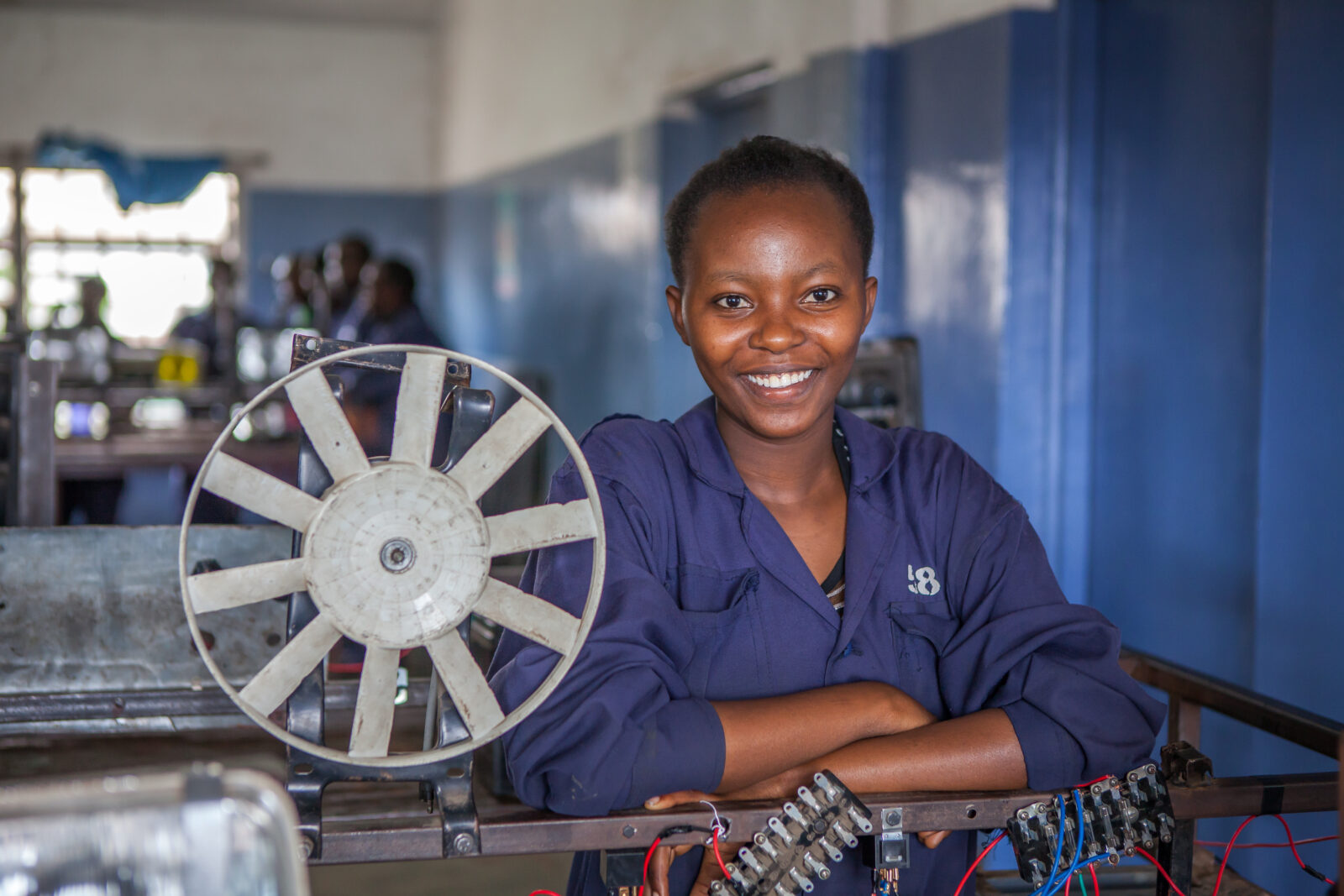
What are our goals for 2024?
7. Outlook

7. Outlook

Education programmes
Throughout our more than 20 years of experience, we have learned which models can be used effectively and how to apply our interventions successfully. Our work focuses on upscaling these interventions through trickle down models, and also through working at various levels to ensure as many schools, teachers and pupils as possible can be reached. To shape sustainable futures, education systems often need to be redefined, and the scaling up of our interventions is necessary, while maintaining the professional, personal, and solid method of working that is so characteristic for Edukans.

Geographical focus
Edukans rolls out its strategy in four focus countries: Ethiopia, Kenya, Malawi and Uganda. Country offices have been established and registered in these countries, and national staff engaged. In these countries Edukans aims to develop a diversified portfolio, offering the full range of Edukans programmes to change the long-term perspective of people in these countries. In addition to these focus countries, Edukans also implemented projects in Ghana, DR Congo, and Lebanon.

Thematic focus
Edukans is committed to improving the quality of education through four programmes: Basic Education, Skills for Work and Life, Education in Emergency and Exchange programmes. We have decided to treat Education in Emergency as a separate programme pillar, since the context and target group require a different approach, and it is broadly recognised as a different programme.
These programme pillars are complemented with themes which recur in each of the programmes, forming an integral part of our global strategy.
Climate change
Climate can no longer simply be considered one theme amongst many that need to be addressed. It is time to realise that a paradigm shift has occurred, and the climate crisis is THE core crisis that demands a multi-disciplinary approach. For Edukans, this requires a rethinking of how education can be part of the solution to the climate crisis.

Digitalization
The digital divide is of growing concern. Some two thirds of the world’s school-aged children do not have internet connection in their homes, restricting their opportunities for further learning and skills development. Digitalisation is a high priority in all countries we work in. Consequently, digital skills development needs to be an integral part of our education modules and be integrated in pedagogical skills. An excellent way to achieve this is through our educational modules as we make e-learning and blended learning an integral part of education systems.

Gender and Inclusion
In joint collaboration with the country offices, Gender & Inclusion champions a transformative Gender & Inclusion policy which will be finalised and deployed in 2024.
Funding
Resource mobilisation is critical to generate the desired impact on education. The continuously changing donor landscape and the role of Civil Society and INGOs require thorough reflection and the ability to adapt to these developments, without losing the focus on our mission and the achievement of our strategic agenda. We are therefore working on adjusted funding strategies.
Strategic partnerships
We are fostering educational opportunities through strategic partnerships with a limited number of strategic partners with whom Edukans has a long-term relationship. Strategic Partnerships will be built both at global and national level. Edukans values its partners and strives to be perceived as a reliable partner who delivers as promised. Partnership goes beyond project relationships.
Way forward
The Mid-Term Review (MTR) was scheduled for the last Trimester in 2023 and the final report is expected early 2024. This review is more than an evaluative checkpoint; it is a springboard for Edukans’ strategic refinement and growth.
This Mid-Term Review will critically inform us on the markers for our Strategic Agenda for 2026-2030, to reaffirm Edukans’ commitment to inclusive education. This review will be instrumental in informing the strategic direction of Edukans, shaping our thematic and geographic focus, and our organisational model for the years following 2024.
We envision an organisation that proactively anticipates the changing environment. Education, as our core catalyst, will drive this journey, with Edukans leading the charge towards a future where learning is the cornerstone of development, empowerment, and equality.
Together, with our partners, staff, and the communities we serve, we will navigate the path towards this envisioned future with confidence and clarity.
Together we will continue to Unleash the transformative power of education!
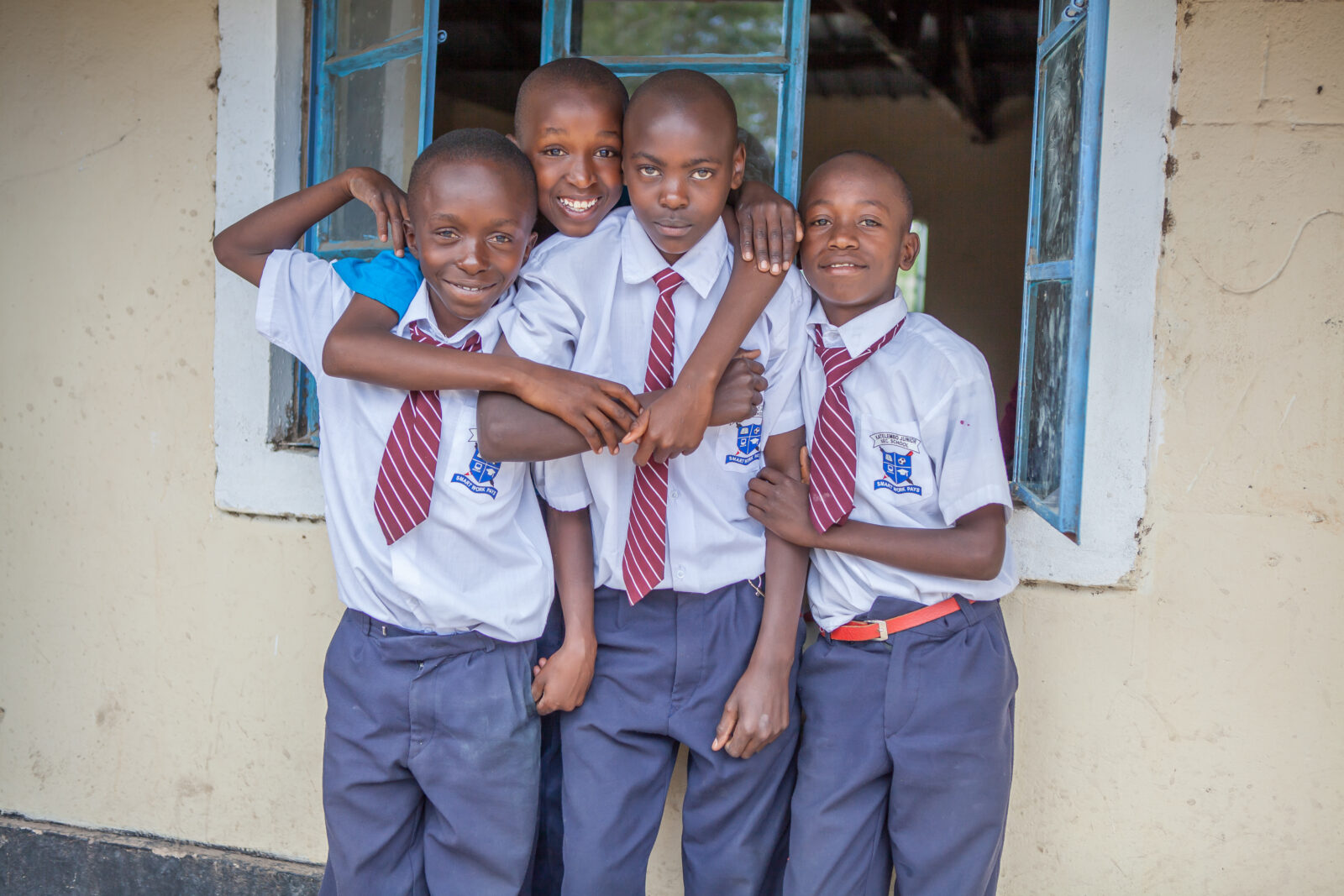
What does our financial statement look like?
Navigate to
- Introduction
- Budget realisation 2023
- Budget 2024
- Financial statements 2023, Edukans Foundation
- Notes on the consolidated balance sheet at 31-12-2023
- Notes to the consolidated statement of income and expenditure, 2023
- Appendix 1: Project subsidies and contributions per continent and country
- Appendix 2: List of projects 2023 (spending per project)
8. Financial report

8. Financial report

Introduction
Edukans saw an increase of 9.2% in revenue in 2023, the total amount being €6,459,662 (up from €5,913,950 in 2022). Edukans is gradually working towards a balanced budget, which is reflected in the results for 2023 as compared to 2022. In 2023, the deficit on the continuity reserve was €246,551 (compared to €708,309 in 2022). The deficit in 2023 was in line with the budget. In addition, an amount of €238,108 has been charged to the one-time gift received from UnieNzv in 2021. This gift was used to form an earmarked reserve, which will be used in the period up to and including 2026. Finally, an amount of €27,831 was used from various restricted funds.
The tables below provide an overview of the budget realisation of Edukans in 2023, and a comparison (of key figures) with the previous 3 years.
Budget realisation 2023
| € * 1,000 | |
|---|---|
| Budget | -725 |
| A. Higher income from non-profit organisations | 166 |
| B. Lower income institutional grants | -1,843 |
| C. Lower other income | -641 |
| D. Lower spending on objective | 2,234 |
| E. Higher fundraising costs and management/administration | 181 |
| F. Higher financial income and expenditure/incidental results | 116 |
| Net result | -512 |
Key figures
| € * 1,000 | 2023 | Budget | 2022 | 2021 | 2020 |
|---|---|---|---|---|---|
| Revenues | 6,460 | 8,778 | 5,914 | 6,904 | 7,169 |
| Spent on objectives | 5,433 | 7,667 | 5,224 | 5,165 | 6,347 |
| Fundraising expenses | 1,201 | 1,463 | 973 | 1,142 | 1,269 |
| Mangement and administration expenses | 454 | 373 | 362 | 278 | 283 |
| Expenditure | 7,088 | 9,503 | 6,559 | 6,585 | 7,899 |
| Net financial income and expenditure | 240 | 0 | -418 | 78 | 124 |
| Incidental results | -124 | 0 | 0 | 0 | 0 |
| Result from participation | 0 | 0 | 0 | 36 | 48 |
| Net result recurring activities | -512 | -725 | -1,063 | 433 | -558 |
| One time gift UnieNzv | 0 | 0 | 2,200 | ||
| Net result | -512 | -725 | -1,063 | 2,633 | -558 |
Income and expenses
In 2023 an amount of €6,459,662 in revenues was generated, an increase of €545,712 compared to 2022 (9.2%). Below are some notes on the development of Edukans’ income.
- Individual giving increased by 1.4% on 2022 but was less than had been budgeted. Some of Edukans’ campaigns overlapped with national campaigns appealing for emergency aid for humanitarian crises following disasters and international conflicts.
Since the end of the Covid-19 pandemic Edukans has re-started the recruitment of individual donor. As a result, we expect income from individual giving to increase slightly over the coming years. - Income from private profit organisations remains stable (around €100,000/year).
- Income from lottery organisations is a stable source of income due to the annual contribution of €500,000 from the Dutch Postcode Lottery. In 2023 a new contract has been signed with the Dutch Postcode Lottery, extending their commitment for a further 5-year period.
- The revenue from international grants is up by 4.5% on 2022 but fell significantly behind budget. Edukans is targeting a number of leads with our strategic partners, but the process of transforming those leads into actual revenue takes significantly more time than originally anticipated, meaning that the growth ambition for institutional grants has not yet been realised.
- Building on consistent and loyal support from foundations and following a renewed fundraising strategy to engage with new partners, revenue from non-profit organisations was up by 82.4% compared to 2022, resulting in €1,154,387 income.
Total spending in 2023 was €7,087,527, an increase of 8% as compared to 2022.
Costs percentages
| 2023 | Budget | 2022 | 2021 | 2020 | |
|---|---|---|---|---|---|
| Spending on objectives relative to income | 84.1% | 87.3% | 88.3% | 74.8% | 88.5% |
| Spending on objectives relative to expenditure | 76.7% | 80.7% | 79.6% | 78.4% | 80.4% |
| Costs fundraising relative to income | 18.6% | 16.7% | 16.5% | 16.5% | 17.7% |
| Costs fundraising relative to income excl. grants | 26.0% | 28.7% | 23.4% | 21.4% | 17.7% |
| Costs management & administration relative to expenditure | 6.4% | 3.9% | 5.5% | 4.2% | 3.6% |
Programme – spending ratio
Edukans spent €5,432,708 on its core objectives in 2023, 4.0% up on 2022.
Income-to-spending ratio
Spending on objectives relative to expenditure dropped to 76.7% (down from 79.6% in 2022). Spending on objectives relative to income has decreased to 84.1% (down from 88.3% in 2022). This decrease is largely driven by the fact that in 2023 all four focus countries are consolidated into the annual report. Previously, costs for management and administration for the non-consolidated countries were captured under the Capacity Building objective, whereas this year most of these costs are reported under “management and administration” (see below).
Fundraising costs ratio
In 2023, the percentage of the fundraising costs in relation to the income (excluding grants) was 26.0% (up from 23.4% in 2022).
Management and administration ratio
Management and administration costs in 2023 increased to 6.4%, up from 5.5% in 2022. This is mostly due to the changing management and governance model incorporating cross-border decentralisation of responsibilities, adopted in 2022. As mentioned above, a further reason for the increase lies in the fact that in 2023 the costs of operations of the organisations in the four focus countries are now consolidated into this annual report. With further professionalisation in the four organisations, expectations are that this ratio will reduce again in the coming years. In 2023 the overhead costs allocation key of 12.0% across all objectives was allocated to Management and Administration, in 2022 this was 12.7%. In 2025, at the end of the strategic framework 2021-2025, Edukans will redefine the standard to match the organisation management and governance model.
In May 2024, Edukans faced an integrity issue in one of our offices, where fraudulent actions by a staff member resulted in an amount missing from the accounts. A thorough investigation was conducted, and swift actions were taken to uncover the extent and methods of the fraud. Edukans has covered the missing funds from our financial reserves to ensure that our target groups and beneficiaries are not affected. Our cross-border operations, integrity, and finance teams are now updating procedures to prevent similar issues in the future. If there are any questions, please reach out to us by email via communications@edukans.org.
Reserves and funds
| € * 1,000 | 2023 | 2022 | 2021 | 2019 |
|---|---|---|---|---|
| Continuity reserves | 2,621 | 2,764 | 3,472 | 2,317 |
| Earmarked reserves | 804 | 1,042 | 1,100 | 150 |
| Restricted funds | 740 | 767 | 1,064 | 537 |
| 4,165 | 4,573 | 5,636 | 3,004 |
Continuity reserves
In 2023 an amount of €246,551 was withdrawn from the continuity reserves, after which the reserve stands at €2,620,660. In 2021, 50% of the one-time gift was added to the continuity reserves in anticipation of higher operational costs. This increase is partly due to the expected costs involved in the transition into the decentralised management and governance of the organisation, and partly in anticipation of the increased costs to mitigate the risks to security and safety, and of inflation, considering the volatile environment INGOs are currently operating in. In 2023 some of these are visible in the higher costs for management and administration.
Earmarked reserve “Sustainable Borderless Organisation”
An earmarked reserve of €1,100,000 was established in 2022 as part of the Sustainable International Edukans one-time gift from UnieNzv of €2,200,000. This earmarked reserve, referred to as “Sustainable Borderless Organisation”, enables Edukans to invest in developing further as a financially sustainable, innovative and professional civil society organisation.
Sustainability, a diversified donor portfolio, and long-term partnership building, innovation in education, and one cross-border Edukans with a decentralised management and governance structure are key in creating impact and unleashing the power of education.
In 2023 an amount of €238,108 was withdrawn from this reserve. €146,232 in costs were for the annual investments in the further professionalisation of the organisations in Ethiopia, Kenya, Malawi and Uganda. The remaining costs were for one-time activities in support of this process.
Restricted funds
An amount of €27,381 was withdrawn from to the various restricted funds that have been built over the previous years. In 2023 €823,076 was received in new funding, and €850,457 was spent on the project activities related to these funds.
The total amount in the restricted funds per 31 December 2023 was €740,010.
Budget 2024
| Incoming revenues | € * 1,000 |
|---|---|
| Individual giving | 3,206 |
| For profit organisations | 125 |
| Lottery organisations | 727 |
| Institutional Grants | 1,848 |
| Other non-profit organisations | 805 |
| Total revenues | 6,712 |
| Spend on objectives | |
| Basic education | 1,426 |
| Education in Emergencies | 756 |
| Skills for Work | 1,717 |
| Capacity-building | 798 |
| Exchange programmes | 263 |
| Information activity | 907 |
| Total spend on objectives | 5,867 |
| Fundraising expenses | 1,205 |
| Management and administration expenses | 310 |
| Total expenditure | 7,382 |
| Result before financial income and expenditures | -671 |
| Financial result investments | 50 |
| Net result | -621 |
| Note: country office costs are included in the Capacity-building budget. In the consolidated statements for 2023, these costs are allocated to the various cost categories. |
In 2024 the total anticipated budget is €6,712,000, an increase of 3.9% compared to 2023.
An amount of €170,000 from the continuity reserve will be used to fund part of the operational costs, and a budget of €300,000 will be made available from the earmarked reserve to invest in “Sustainable Borderless Organisation”. Furthermore, € 150,000 will be available from the restricted funds to be spent in 2024.
The budget for 2024 is felt to be more realistic given the results for 2023 and taking into account the longer periods (and higher efforts) needed to generate the expected growth in institutional grants.
FINANCIAL STATEMENTS 2023, EDUKANS FOUNDATION
Balance sheet at December 31, 2023 (after result appropriation) (in euros)
| ASSETS | Ref. | December 31, 2023 | December 31, 2022 | ||
|---|---|---|---|---|---|
| Fixed assets | |||||
| - Intangible fixed assets | 1 | 336 | 17,120 | ||
| - Tangible fixed assets | 2 | 96,971 | 96,508 | ||
| 97,307 | 113,628 | ||||
| Current assets | |||||
| Receivables | 3 | 572,726 | 271,660 | ||
| Investments | 4 | 2,838,402 | 2,613,084 | ||
| Cash | 5 | 1,901,390 | 2,791,612 | ||
| 5,312,518 | 5,676,356 | ||||
| Total assets | 5,409,825 | 5,789,984 | |||
| LIABILITIES | Ref. | December 31, 2023 | December 31, 2022 | ||
| Reserves and funds | 6 | ||||
| Reserves | |||||
| - Continuity reserves | 2,620,660 | 2,763,850 | |||
| - Earmarked reserves | 803,591 | 1,041,699 | |||
| 3,424,251 | 3,805,549 | ||||
| Funds | |||||
| - Restricted funds | 740,010 | 767,391 | |||
| 4,164,261 | 4,572,940 | ||||
| Provisions | 7 | 141,642 | 23,737 | ||
| Short term liabilities | 8 | 1,103,922 | 1,193,307 | ||
| Total liabilities | 5,409,825 | 5,789,984 |
Statement of income and expenditure, 2023 – (in euros)
| Ref. | Actual 2023 | Budget 2023 | Actual 2022 | |
|---|---|---|---|---|
| Incoming revenues | 9 | |||
| Individual giving | 2,883,432 | 3,384,650 | 2,844,317 | |
| For profit organisations | 85,007 | 175,000 | 114,634 | |
| Lottery organisations | 500,000 | 550,000 | 564,943 | |
| Institutional Grants | 1,836,837 | 3,680,000 | 1,757,013 | |
| Other non-profit organisations | 1,154,387 | 988,500 | 633,043 | |
| Total revenues | 6,459,662 | 8,778,150 | 5,913,950 | |
| Spent on objectives | 10 | |||
| A. Basic education | 1,437,059 | 1,337,505 | 2,335,941 | |
| B. Education in Emergencies | 1,688,917 | 2,084,579 | 0 | |
| C. Skills for Work | 971,218 | 1,957,982 | 1,564,883 | |
| D. Capacity-building | 257,094 | 848,500 | 454,785 | |
| E. Exchange programmes for teachers and students | 416,025 | 654,694 | 246,081 | |
| F. Information activity | 662,395 | 784,102 | 622,194 | |
| Total spent on objectives | 5,432,708 | 7,667,362 | 5,223,884 | |
| G. Fundraising expenses | 1,200,694 | 1,462,847 | 973,137 | |
| H. Management and administration expenses | 454,125 | 372,951 | 362,497 | |
| Total expenditure | 7,087,527 | 9,503,160 | 6,559,518 | |
| Result before financial income and expenditure | -627,865 | -725,010 | -645,568 | |
| Incidental results | 11 | -124,000 | 0 | 0 |
| Financial result investments | 12 | 239,824 | 0 | -417,640 |
| Net result | -512,040 | -725,010 | -1,063,208 | |
| Additions to/withdrawls from: | ||||
| Continuity reserve | -246,551 | -144,010 | -708,309 | |
| Earmarked reserves | -238,108 | -381,000 | -58,301 | |
| Restricted funds | -27,381 | -200,000 | -296,598 | |
| -512,040 | -725,010 | -1,063,208 |
Cashflow statement 2023
| 2023 | 2022 | |
|---|---|---|
| Cashflow from operating activities | ||
| Result before financial income and expenses | -627,865 | -645,568 |
| Adjustments for: | ||
| - Depreciation (in)tangible fixed assets | 57,164 | 52,278 |
| - Change in provisions | 117,905 | 346 |
| 175,069 | 52,624 | |
| Movements in working capital: | ||
| - Change in current assets | -238,210 | 2,103 |
| - Change in current liabilities | -400,786 | 134,616 |
| -638,996 | 136,719 | |
| Cash generated from operations | -1,091,792 | -456,225 |
| Interest received | 0 | 0 |
| Net cash generated from operating activities | -1,091,792 | -456,225 |
| Cashflow from investing activities | ||
| Investments in (in)tangible fixed assets | -27,735 | -15,418 |
| Incidental results | -124,000 | 0 |
| (Un)realized gains and losses on investments | 239,824 | -417,64 |
| Repayment of share in participation | 0 | 15,968 |
| Cashflow from financing activities | ||
| none | 0 | 0 |
| Net cashflow | -1,003,703 | -873,315 |
| Additional from new consolidated per January 1 | 321,510 | 0 |
| Currency exchange difference | 17,289 | 0 |
| Change in cash and cash equivalents | -664,904 | -873,315 |
| Cash, investments and cash equivalents at beginning of period | 5,404,696 | 6,278,010 |
| Change in cash and cash equivalents | -664,904 | -873,315 |
| Cash, investments and cash equivalents at end of period | 4,739,792 | 5,404,696 |
| The cashflow statement was prepared using the indirect method. |
General explanatory notes and accounting principles
General
Activities
The Edukans Foundation, which was founded in 2002, has its registered office in Amersfoort and is registered at the Chamber of Commerce of the Netherlands (no. 32092131).
The foundation has two objectives:
a. Access to education and the quality of education in developing countries
b. Involving the Dutch public and in particular the educational sector in the Netherlands with this mission
and beyond this, everything that directly or indirectly relates to this or can be conducive to this, in the broadest sense of the word.
Consolidation
For 2023 the Edukans Foundation Ethiopia, Kenya, Malawi and Uganda financial statements are included in the consolidated financial statements. In 2022 only the activities for Ethiopia were consolidated.
Continuity
The annual accounts have been prepared on a going concern basis.
Accounting principles for valuation of assets and liabilities and revenue recognition
The financial statements have been drawn up in conformity with the guidelines for financial reporting by fundraising organisations (RJ 650) provided by the Dutch Council for Accounting Standards (Raad voor de Jaarverslaggeving). In general, assets and liabilities have been valued at acquisition price. If no specific accounting principle is mentioned, valuation has been made at acquisition price. The actual rate differences on stocks (bonds and shares) and foreign currencies have been processed directly in the statement of income and expenditure. Income and expenditures are allocated to the year to which they relate and/or have been granted to third parties.
Estimates
In order to be able to apply the principles and rules for preparing the annual accounts, it is necessary for the management of Edukans to evaluate various matters and make estimates that can affect the amounts recorded in the financial statements. If it proves necessary, to provide the insight described in Art. 2:362 paragraph 1 of the Dutch Civil Code, the nature of these opinions and estimates, including the underlying assumptions, is described in the related notes to the financial statements.
Functional and presentation currency
The entries in the financial statements have been valued in accordance with the currency of the economic environment in which Edukans mainly operates (functional currency). The annual accounts have been prepared in euros; the euro is both the functional and the presentation currency of Edukans.
Amounts in foreign currencies are converted into euros at the rates of exchange applicable at the balance sheet date. Transactions denominated in foreign currencies are converted at the rates of exchange applicable at the time of the transaction. The average rate for the current financial year is applied.
Any resulting exchange differences are taken into account in the statement of income and expenditure.
Financial instruments
‘Financial instruments’ is understood to mean both primary financial instruments such as receivables and debts, and financial derivatives. For the principles underlying the primary financial instruments, reference is made to the treatment of each balance sheet item.
VALUATION PRINCIPLES FOR THE BALANCE SHEET
Intangible and tangible fixed assets
Software and other inventory and operating assets are valued at historical cost or manufacturing price including directly attributable expenditure, less straight-line depreciation over their estimated useful lives and impairment losses.
Financial fixed assets
A historical cost-based accounting system has been used. In general, assets and liabilities have been valued at acquisition price.
Participations (associates), over which significant influence can be exercised, are valued according to the net asset value method. The net asset value is calculated in accordance with the accounting principles that apply for these financial statements; regarding participations in which insufficient data is available for adopting these principles, the valuation principles of the respective participation are applied. If the valuation of an associate based on the net asset value is negative, it will be stated at nil. If and insofar as the Edukans Foundation can be held fully or partially liable for the debts of the associate or has the firm intention of enabling the participation to settle its debts, a provision is recognised for this.
Receivables
Receivables have been recorded at fair value and thereafter at amortised cost, after deduction of the necessary provisions for the risk of non-payment.
Investments
Investments (bond and share funds) are measured at fair value. Changes in value and transaction costs are noted in income and expenditure.
Provisions
Provisions are made for legally enforceable or actual liabilities existing on the accounting date, which are likely to entail an outflow of resources, the size of which can be estimated in a reliable manner.
Debts
In the initial accounting, debts have been valued at fair value. Transaction costs that are directly attributable to the acquisition of debts have been included in the valuation in the initial accounting. After the initial accounting, debts have been valued at the amortised cost, being the amount received taking into account the premium or discount and after deduction of the transaction costs.
ACCOUNTING PRINCIPLES FOR REVENUE RECOGNITION
General
The balance (result) is defined as the difference between total income and total expenditure. The revenues are accounted for in the year in which they are realised; expenses are accounted for as soon as they are foreseeable. Income that is received in the form of goods or services is valued at fair value, to the extent that this can be determined. In such cases, this income is included in the statement of income and expenditure.
Revenues that are designated for a particular purpose have been incorporated into the statement of income and expenditure; if these revenues are not spent in full in the year under review, the unspent funds are included in the relevant earmarked reserve or earmarked fund, respectively. A withdrawal from an earmarked reserve or restricted fund, respectively, is recorded as an expense in the statement of income and expenditure.
Expenses are determined on a historical basis and assigned to the year under review to which they relate.
Gifts
Gifts are accounted for in the year in which a specific campaign was held, or – if no specific campaign took place – in the year in which the gift was received.
Legacies
Revenues from legacies are accounted for in the financial year if a deed of partition is available per balance date. Payments in the form of advances are accounted for in the financial year of receipt.
Government subsidies and other grants
Subsidies from governments, municipalities, etc., that are received to carry out projects or programmes, whereby the subsidy-provider acts as a financer or co-financer, have been accounted for separately in the income statement. Operating grants are accounted for as income in the statement of income and expenditure in the year in which the subsidised costs are incurred or revenues foregone, or when a subsidised operating deficit occurs. The income is accounted for if it is likely to be received and if the foundation can demonstrate the conditions for receipt.
Fundraising expenses
The costs of Edukans’ own fundraising are allocated per cost item and personnel costs on the basis of the estimated number of hours spent. Other expenses – including housing costs – are likewise attributed to the objectives based on the actual time spent by staff.
Implementation costs of own organisation
The implementation costs of the organisation are allocated per cost item and personnel costs based on estimated hours spent. The implementation costs of the organisation are divided on the basis of the amount of time spent by staff members.
Management and administration expenses
According to Guideline 650 of the Dutch Council for Accounting Standards, the statement of income and expenditure should include a separate line about management and administration costs. The management chose the model attribution method provided by Goede Doelen Nederland. The management and administration expenses are expressed as a percentage of total expenditure. The management set a target of 5% as the maximum norm for management and administration expenses.
Pensions
The Edukans Foundation has placed all employee pension schemes with the PFZW pension fund, based on the standard PFZW pension scheme (average pay scheme). Guideline 271 offers the possibility of treating this scheme as a defined contribution scheme, because:
a) the foundation is affiliated with a sectoral pension fund (PFZW) and uses the same pension scheme as other legal entities.
b) the foundation is under no obligation to make supplementary contributions, there being no rise in future premiums in the event of a deficit at PFZW.
The PFZW (pre-) pension scheme satisfies both conditions. The scheme may therefore be treated as a defined contribution scheme under RJ 271. This means that the premium invoices from PFZW have been accounted for under pension expenses and the outstanding part of the premiums under short-term liabilities.
Staff remuneration
Periodic payable remuneration such as salaries and social security expenses has been included in the statement of income and expenditure on the basis of the terms of employment, to the extent that this is owed to employees. Edukans foundation adheres to the collective labour terms and conditions of PKN.
ACCOUNTING PRINCIPLES FOR THE CASHFLOW STATEMENT
The funds in the cashflow statement consist of cash and floating stocks. The stocks can be seen as highly liquid assets. Cashflow in foreign currency has been valued at the transaction rate.
NOTES ON THE BALANCE SHEET AT DECEMBER 31, 2023
01. Intangible fixed assets
| 2023 | 2022 | |
|---|---|---|
| Software | ||
| Cost | 88,253 | 88,253 |
| Accumulated depreciation | 71,133 | 54,163 |
| Balance as of January 1 | 17,120 | 34,090 |
| Purchases | 0 | 0 |
| Depreciation | -16,784 | -16,970 |
| Cost | 88,253 | 88,253 |
| Accumulated depreciation | 87,917 | 71,133 |
| Balance as of December 31 | 336 | 17,120 |
| The depreciation rate is 20% per year. |
02. Tangible fixed assets
| 2023 | 2022 | |
|---|---|---|
| Inventory and other operating assets | ||
| Cost | 412,136 | 396,718 |
| Accumulated depreciation | 315,628 | 280,320 |
| Balance as of 1 January original | 96,508 | 116,398 |
| New consolidated Kenya, Malawi and Uganda | ||
| Cost | 32,213 | |
| Accumulated depreciation | 16,796 | |
| 15,417 | ||
| Cost | 444,349 | 396,718 |
| Accumulated depreciation | 332,424 | 280,320 |
| Balance as of 1 January new | 111,925 | 116,398 |
| Purchases | 27,735 | 15,418 |
| Currency exchange difference | -2,310 | 0 |
| Depreciation | -40,380 | -35,308 |
| -14,954 | -19,890 | |
| Cost | 469,775 | 412,136 |
| Accumulated depreciation | 372,804 | 315,628 |
| Balance as of 31 December | 96,971 | 96,508 |
| The depreciation rate is 20% per year. |
03. Receivables
| December 31, 2023 | December 31, 2022 | |
|---|---|---|
| Accounts receivables | 18,422 | 18,747 |
| Prepaid expenses programmes | 130,368 | 136,117 |
| Outstanding grants | 265,933 | 16,391 |
| Other | 158,003 | 100,405 |
| 572,726 | 271,660 |
For ‘Accounts receivables’, a provision for doubtful debts is not necessary. Prepaid expenses programmes mainly contains expenses for programmes which will be implemented in 2024.
04. Investments
| December 31, 2023 | December 31, 2022 | |
|---|---|---|
| Insinger Gilissen - Share fund | ||
| Balance as of January 1 | 821,954 | 1,007,539 |
| Purchases | 0 | 0 |
| (Un) realised gains and losses | 101,903 | -185,585 |
| Balance as of December 31 | 923,857 | 821,954 |
| As of December 31, 2023, this portfolio consisted of 825 units with a price of € 1.119,97 per share. | ||
| Insinger Gilissen - Dynamic Fixed Income fund | ||
| Balance as of January 1 | 1,791,130 | 2,033,443 |
| Purchases | 0 | 0 |
| (Un) realised gains and losses | 123,415 | -242,313 |
| Balance as of December 31 | 1,914,545 | 1,791,130 |
| As of December 31, 2023, this portfolio consisted of 2,722 units with a price of € 703,36 per share. | ||
| 2,838,402 | 2,613,084 |
Edukans selected Insinger Gillisen as their asset manager. The asset manager is instructed to invest following a defensive green sustainable profile. The investment mix in fixed income (bonds) and shares is 70% fixed income and 30% shares, with a bandwidth of 10%.
05. Cash
| December 31, 2023 | December 31, 2022 | |
|---|---|---|
| Bank accounts (Edukans Netherlands) | 1,617,036 | 2,372,838 |
| Bank accounts (Edukans Country Offices) | 284,354 | 418,774 |
| 1,901,390 | 2,791,612 |
Cash and bank comprise the cash and bank balances of the Edukans office in Amerfsoort as well of the Country Offices in the four focus countries.
06.1 Reserves and funds
| Continuity reserves | Earmarked reserves | Restricted Funds | Total | |
|---|---|---|---|---|
| Balance as of January 1, 2023 | 2,763,850 | 1,041,699 | 767,391 | 4,572,940 |
| New consolidated on January 1, 2023 | 103,361 | 0 | 0 | 103,361 |
| Added | 0 | 0 | 823,076 | 823,076 |
| Withdrawn | -246,551 | -238,108 | -850,457 | -1,335,116 |
| Balance as of December 31, 2023 | 2,620,660 | 803,591 | 740,010 | 4,164,261 |
Continuity reserves
As a precautionary measure, the Edukans Foundation maintains a continuity reserve to cover setbacks in revenues and costs for a calculable period (short-term risks). Such setbacks can result from harm to the organisation’s image, for example, the short-term effects of financial crises, the loss of major donor partners or seasonal factors. Goede Doelen Nederland has set a norm for the continuity reserve of a maximum of 1.5 times the annual expenses of the work organisation. Based on the costs in 2023, the maximum continuity reserve is € 5,995,760. The size of Edukans’ continuity reserve is 65.6% of the annual organisational costs (base year 2023). Management considers this sufficient for the short term, in view of expected developments in relation to both revenues and expenditure.
06.2 Earmarked reserves
| Earmarked reserves | Balance as of January 1 | Added | Withdrawn | Balance as of December 31 |
|---|---|---|---|---|
| Sustainable international Edukans | 1,041,699 | 0 | -238,108 | 803,591 |
| 1,041,699 | 0 | -238,108 | 803,591 |
Earmarked reserves
Edukans decided to create an earmarked reserve to invest in the development of an impactful and financially sustainable international organisation. This requires further professionalisation and boosting capacity at regional and national level in our countries of operation.
06.3 Restricted funds
| Restricted funds | Balance as of January 1 | Added | Withdrawn | Balance as of December 31 |
|---|---|---|---|---|
| Emergency aid | 96,057 | 0 | 9,431 | 86,626 |
| DARE2GO educational exchanges | 292,143 | 343,100 | 411,228 | 224,015 |
| Teaching with Impact | 117,556 | 1,173 | 36,805 | 81,924 |
| UNICEF Ethiopia | 71,847 | 57,893 | 71,847 | 57,893 |
| Basic education Kenya | 176,174 | 10,200 | 76,718 | 109,656 |
| Skills and Employment AFAS | 13,614 | 159,049 | 144,934 | 27,729 |
| Sustaining Lives and Education Ethiopia | 0 | 51,045 | 0 | 51,045 |
| Ethiopia Greening Schools and Communities | 0 | 60,300 | 23,971 | 36,329 |
| Rural Youth Ghana Tony Chocolonely | 0 | 101,297 | 75,523 | 25,774 |
| Other restricted funds | 0 | 39,019 | 0 | 39,019 |
| 767,391 | 823,076 | 850,457 | 740,010 |
Restricted funds
Gifts received for a specific purpose were accounted for through a restricted fund. Major funds are described below.
Emergency aid
In 2022, a campaign was held for emergency aid in Ethiopia due to the drought. These donations were added to the Emergency aid fund, some of which was spent on this objective in 2022. Further spending took place in 2023, and the remaining amount will be spent in 2024.
DARE2GO educational exchanges
In 2016, Edukans decided to take over the exchange programme previously provided by Youth and Mission under the brand name DARE2GO. Edukans recovered €400,000 in 2016. As of 1 January 2023, an amount of €292,143 remained. The fund will be invested in the development of new exchange programmes. Fundraising continues, with €343,100 in new funds received in 2023. As of 1 January 2024, an amount of €224,015 remained.
Teaching with impact
The EDU Active Learning Project uses a learning resource (CorrectBook) that helps learners to practice basic skills (e.g. in writing, maths, art) and carry out application and problem-solving tasks individually and together. It provides new opportunities to train teachers and reach learners at STAR schools, reach new schools, offer third parties a partnership possibility and practice training on digital platforms. Several projects have been completed and new projects related to the EDU Active Learning Project will be rolled out in 2024.
UNICEF Ethiopia
Edukans started raising funds to finance the improvement of access to safe and protective education for displaced boys and girls in Afar. UNICEF is an important cooperation partner in Ethiopia. For UNICEF projects, own contributions are raised from donors in the Netherlands. As soon as the projects are implemented, the raised contribution is transferred to the projects in Ethiopia.
Basic education Kenya
Edukans received a legacy in December 2021, to be spent on basic education in Kenya. Another amount was received from this same legacy in 2022. An implementing programme started in 2022 and this will continue into 2024.
Skills and Employment AFAS
AFAS Foundation supports the Skills and Employment project which involves strengthening and increasing the capacity of TVETs in providing value-based, quality, market-oriented, relevant skills training to young people. The long-term impact of this project is to improve the productivity and employability of graduates of TVETs in the Kenyan labour market. This project started in 2022 and will continue to be implemented in the coming years.
Sustaining Lives and Education Ethiopia
Edukans launched a crowdfunding campaign to supply drink water, meals and school supplies in the regions in Ethiopia that have been heavily affected by extreme drought and the war in Tigray. The programme is expected to continue to run for the coming years.
Ethiopia Greening Schools and Communities
Funded by several foundations Edukans offers education to refugees in the north of Ethiopia. The programme, which involves ‘greening’ the environment, aims to make young people and their families aware of the importance of fruit and vegetables. A curriculum on climate change has been put together to raise awareness amongst the children and within the communities affected and help them with measures to combat the effects of climate change. The programme will continue until 2026.
Rural Youth Ghana Tony Chocolonely
Funds have been received from the Chocolonely Foundation to fund a project that aims to improve education and strengthen the position of girls, who often fall out of school and face early marriages and pregnancies. This programme is set to run until 2025.
07.1 Provisions for employees
| December 31, 2023 | December 31, 2022 | |
|---|---|---|
| Balance as of January 1 | 23,737 | 23,391 |
| Withdrawn | 6,095 | 346 |
| Balance as of December 31 | 17,642 | 23,737 |
This provision is intended to cover expenses arising from obligations in collective labour agreements (CAOs) for staff anniversaries. The provision for anniversaries is recorded as the cash value of the expected payments during the period of employment. No interest is added to the provision.
07.2 Provision integrity issue
| December 31, 2023 | December 31, 2022 | |
|---|---|---|
| Balance as of January 1 | 0 | 0 |
| Added | 124,000 | 0 |
| Balance as of December 31 | 124,000 | 0 |
This provision is intended to cover the direct costs of an integrity issue in one of our country offices. In addition to the direct costs, amounts are included for investigation of the issue, as well as legal advice.
08.1 Short term liabilities
| December 31, 2023 | December 31, 2022 | |
|---|---|---|
| Project obligations | 130,365 | 264,053 |
| Personnel expenses | 309,368 | 330,682 |
| Suppliers and trade credits | 166,748 | 98,496 |
| Prepaid amounts international grants | 403,118 | 383,547 |
| Prepaid amounts schoolprograms | 0 | 35,001 |
| Other liabilities | 94,324 | 81,526 |
| 1,103,922 | 1,193,305 |
Grants represents received grants for defined projects with a start date after December 31, 2023 continuing in 2024. The grants are mainly received from Enabel (€ 109,887) and UNICEF Ethiopia (€ 60,548).
The changes in liabilities for education projects and development cooperation can be summarised as follows:
08.2 Project obligations
| December 31, 2023 | December 31, 2022 | |
|---|---|---|
| Obligation as at 1 January | 264,053 | 133,796 |
| Commitments in the accounting year | 3,455,001 | 3,259,638 |
| Expired projects | 0 | 0 |
| Payments and credit transfers | -3,588,689 | -3,129,381 |
| Obligation as at 31 December | 130,365 | 264,053 |
The commitments during the year are the contractual commitments entered into during the year. The payments are the payments made relating to commitments.
08.3 Obligations not included in the balance sheet
| 2024 | 2025 | 2026 | Total | |
|---|---|---|---|---|
| Projects development cooperation | 1,061,386 | 89,219 | 0 | 1,150,605 |
| Lease Edukans Office Amersfoort | 92,456 | 30,819 | 123,275 | |
| 1,153,842 | 120,038 | 0 | 1,273,880 |
The amount ‘projects development cooperation’ of € 1,150,605 represents conditionally committed funds by international partners for the coming years.
Edukans has a total lease obligation in favour of the office in Amersfoort of € 123,275.
NOTES TO THE STATEMENT OF INCOME AND EXPENDITURE, 2023
Incoming revenues
In 2023 an amount of €6,459,662 in revenues were generated, an increase of €545,712 compared to 2022 (9.2%).
Revenues from individual giving consist of €2,694,987 of donations and gifts and € 188,445 of legacies.
Lottery organisations
The income from Lottery organisations concerns the donation from the National Postcode Lottery of the Netherlands.
09.1 Institutional grants can be itemised as follows:
| 2023 | 2022 | |
|---|---|---|
| Nuffic - OKP Industrial Training West-Nile Uganda | 2,018 | 106,559 |
| Nuffic -Enhancing SRHR of youth Ethiopia | 14,438 | 20,422 |
| Nuffic -Tailor-Made training Kenya | 3,315 | 52,54 |
| UNICEF | 1,319,751 | 1,173,796 |
| Enabel-Uganda | 294,259 | 156,392 |
| UNHCR - Education Cannot Wait | 140,149 | 166,23 |
| Delegation of the European Union (CSF III Ethiopia) | 0 | 62,677 |
| ILO | 14,092 | 0 |
| Other Institutional fundraising | 48,816 | 18,397 |
| 1,836,837 | 1,757,013 |
The revenues from institutional grants were less than had been anticipated in the budget because the process of converting leads into revenue, working together with strategic partners, takes significantly more time than originally anticipated. UNICEF remained the largest international donor, funding several projects for developing education in Ethiopia.
09.2 Other non-profit organisations
| 2023 | 2022 | |
|---|---|---|
| Schools | 181,553 | 75,115 |
| Private charitable foundations | 680,060 | 419,932 |
| Churches | 121,573 | 123,382 |
| Other non-profit organisations | 171,201 | 14,615 |
| 1,154,387 | 633,044 |
10.1 Spent on objectives, Fundraising expenses and management and administration expenses
| Basic education | Education in Emergencies | Skills for Work and Life | Capacity building | Exchange programmes | Information activity | Fundraising expenses | Management & admin. Exp. | Actual total 2023 | Budget 2023 | Actual total 2022 | |
|---|---|---|---|---|---|---|---|---|---|---|---|
| (Project) subsidies granted and (project) contributions | 315,117 | 1,210,718 | 294,024 | 30,759 | 70,935 | 0 | 0 | 777 | 1,922,330 | 5,108,450 | 3,123,542 |
| Direct project expenses | 392,466 | 214,643 | 46,099 | 14,027 | 121,888 | 0 | 0 | 3,384 | 792,507 | 481,688 | 152,742 |
| Communication expenses | 20,751 | 1,396 | 14,007 | 33,931 | 0 | 305,435 | 613,518 | 0 | 989,038 | 1,245,830 | 704,015 |
| Personnel expenses | 567,222 | 125,698 | 508,292 | 66,140 | 174,215 | 296,454 | 488,370 | 362,294 | 2,588,685 | 2,087,592 | 1,756,280 |
| Housing expenses | 40,223 | 29,237 | 38,449 | 15,585 | 14,709 | 18,290 | 29,940 | 23,438 | 209,871 | 140,000 | 131,949 |
| Office and general expenses | 88,239 | 99,071 | 62,106 | 96,510 | 29,628 | 36,468 | 59,450 | 55,559 | 527,031 | 387,600 | 640,606 |
| Depreciation | 13,041 | 8,154 | 8,241 | 142 | 4,650 | 5,752 | 9,416 | 8,673 | 58,069 | 52,000 | 50,388 |
| Total expenses | 1,437,059 | 1,688,917 | 971,218 | 257,094 | 416,025 | 662,399 | 1,200,694 | 454,125 | 7,087,531 | 9,503,160 | 6,559,522 |
10.1 Spent on objectives, Fundraising expenses and management and administration expenses

The salaries, social security expenses, pension expenses and other staff costs have been allocated in accordance with the estimated hours spent. The direct project expenses consist of expenses that are directly attributable to the objectives (including materials and travel costs). The other costs are likewise attributed to the objectives in accordance with the estimated time spent by the staff.
(Project) subsidies granted and (project) contributions
Elsewhere in the annual report, we explain how we achieved our objectives and what this entailed.
Direct project expenses (for example materials, travel expenses) are those spent on objectives.
10.2 Communication expenses
| 2023 | 2022 | |
|---|---|---|
| Communication and information | 78,827 | 120,517 |
| Fundraising costs for companies, churches, trust funds | 53,630 | 53,290 |
| Fundraising costs for individual giving | 766,304 | 403,704 |
| Fundraising costs for Exchange | 4,889 | 8,917 |
| Fundraising costs for innovations | 9,923 | 5,519 |
| Communication for Business Development | 41,534 | 35,357 |
| Internationalisation | 33,931 | 76,710 |
| 989,038 | 704,014 |
The communication expenses cover items such as leaflets, posters and other printed matter, but also public campaigns, the website and Edukans’ Wijs! magazine. This allows us to inform our supporters and report our results. In 2023 Edukans invested substantially in fundraising from individual giving in order to grow private donor support.
10.3 Personnel expenses
| 2023 | 2022 | |
|---|---|---|
| Salaries | 1,952,629 | 1,515,105 |
| Social security expenses | 331,458 | 252,463 |
| Pension expenses | 187,176 | 181,634 |
| Internal occupational schemes | 301,272 | 121,488 |
| Personnel costs in projects | -238,056 | -333,137 |
| Travel expenses | 54,208 | 18,728 |
| 2,588,685 | 1,756,280 |
10.4 Number of FTEs
| Edukans Netherlands | 2023 | 2022 |
|---|---|---|
| Program development | 14.1 | 13.1 |
| Fundraising | 5.2 | 6.2 |
| Management and administration expenses | 2.1 | 2.3 |
| Total | 21.4 | 21.7 |
| Edukans Focus Countries | ||
| Program development | 32.3 | 17.1 |
| Fundraising | 1.5 | 1.5 |
| Management and administration expenses | 7.5 | 3.5 |
| Total Edukans Focus Countries | 41.3 | 22.1 |
| Total Edukans | 62.7 | 43.7 |
In order to allocate the management and administration expenses, the management of Edukans selected the model provided by Goede Doelen Nederland. This model states that expenses that are not directly attributable to the objectives fall under ‘management and administration’. The costs of the director of Edukans, ICT and human resource management have been attributed proportionally to the objectives and to ‘management and administration’. The following overview shows in percentages the extent to which the cost types have been attributed to ‘management and administration’:
10.5 Cost type
| Management and | Management and | |
|---|---|---|
| administration 2023 % | administration 2022 % | |
| Supervisory Board | 12.0 | 12.7 |
| Managing director of Edukans | 12.0 | 12.7 |
| Finance and control | 100.0 | 100.0 |
| ICT | 12.0 | 12.7 |
| Human Resource management | 12.0 | 12.7 |
| Housing | 12.0 | 12.7 |
10.6 Director’s salary
| Name | P.M. van Haren |
|---|---|
| Fuction | Managing director |
| Employment | |
| Nature (duration) | permanent |
| Hours per week | 36 |
| Part-time percentage | 100 |
| Period | 1/1-31/12 |
| Renumeration (in euros) | |
| Annnual income | |
| Gross earnings/salary | 98,357 |
| Holiday bonus | 7,833 |
| End-of-year bonus | 8,126 |
| Total GDN annual income | 114,315 |
| Social security contributions | 11,376 |
| Taxable fee/additions | 1,323 |
| Pension costs (employer's share) | 14,828 |
| Total 2023 | 141,842 |
| Total 2022 | 133,038 |
The salary of the director of Edukans is in conformity with the Dutch Civil Servants’ Pay Decree (BBRA). The managing director of Edukans has a maximum salary set at scale 16. This remuneration falls within the norms of the GDN (Goede Doelen Nederland) annual income, which for Edukans is set at 470 BSD points. According to the GDN norm, the managing director’s salary may not exceed €148,215 (full-time). The directors are not awarded any loans, advances or guarantees.
The pension costs concern the employer’s share of the premium owed to the sectoral pension fund.
The GDN norm for the total amount for remuneration is €221,000 (full-time).
Renumeration of the supervisory board
For their supervisory board role for Edukans’ Supervisory Board, Mr. D.M.J. Haaksma received €1,621 and Mr. F.J.J.A. Kat received € 1,259. Following revision of the policy in 2023, additional payments will be made in 2024.
11. Incidental results
| 2023 | 2022 | |
|---|---|---|
| Cost integrity issue (see 7. Provisons) | -124,000 | 0 |
| -124,000 | 0 |
12. Financial result investments
| 2023 | 2022 | |
|---|---|---|
| Net investment results (dividend) | 7,293 | 16,064 |
| (Un)realized gains and losses | 225,330 | -428,117 |
| Total financial income and expenses | 232,623 | -412,053 |
| Less: cost of investments | 7,201 | -5,587 |
| 239,824 | -417,640 |
Edukans selected Insinger Gillisen as their asset manager. The asset manager is instructed to invest following a defensive green sustainable profile. The investment mix in fixed income (bonds) and shares is 70% fixed income and 30% shares, with a bandwidth of 10%.
The unrealised and realised result is calculated by respectively deducting the market value and the sales value in the financial year less the valuation at the beginning of the financial year.
Other information
Adoption and approval of accounts
The 2023 annual accounts were adopted by the management and approved by the Supervisory Board at the meeting of June 27, 2024.
Result allocation
The management determined the result allocation in accordance with the result appropriation set out in the statement of income and expenditure. No events have yet occurred in 2024 that have an influence on the net assets at the end of 2023 and the results for 2023.
Auditor’s report
The auditor’s report by an independent audit firm has been included hereafter.
Appendix 1 Project subsidies and contributions per continent and country
| Africa | |
|---|---|
| Ethiopia | 1,634,644 |
| Ghana | 75,523 |
| Kenya | 449,595 |
| Malawi | 593,607 |
| Rwanda | 16,112 |
| Uganda | 623,686 |
| 3,393,166 | |
| Asia | |
| India | 13,178 |
| Lebanon | 33,656 |
| 46,834 | |
| Latin America | |
| None in 2023 | |
| non country related | 15,000 |
| Total project subsidies and contributions | 3,455,000 |
Appendix 2 List of projects 2023 (spending per project)
| Project code | Projects | |
|---|---|---|
| accounting | ||
| year 2023 | ||
| 1. Africa | ||
| Ethiopia: | ||
| For Every Child a Future 2 | ET-2071 | 191,180 |
| Value chain strengthening for job creation | ET-2096 | 46,433 |
| Bete (my home)-I UNICEF, Strengthening access to safe Education | ET-2097 | -31,114 |
| Skills for Life | ET-2103 | 298,126 |
| Star-school Upscaling with CTEs Partnership | ET-2114 | 29,251 |
| ECW-UNHCR | ET-2122 | 138,889 |
| Bete (my home)-II UNICEF, The access to resilient Quality Education | ET-2130 | 760,487 |
| Country Office Ethiopia 2023 | ET-2135 | 129,708 |
| Edukans Growth Investment Fund | ET-2140 | 20,260 |
| ILO_Youth 2 Youth fund_Ethiopia | ET-2149 | 13,911 |
| Support the Education of Children affected by Conflict in Tigray Region | ET-2153 | 27,684 |
| Ethiopia Greening Schools and Communities | ET-2156 | 9,828 |
| Ghana: | ||
| Rural youth in Ghana catching up on Education chocolonely foundation | GH-2126 | 75,523 |
| Kenya: | ||
| TWI-CB 2022 Kenya | KE-2099 | 20,568 |
| Country Office Kenya 2022 | KE-2110 | 34,000 |
| Tailor-Made Training on Digital Pedagogy - OKP/NUFFIC | KE-2116 | -6,589 |
| Education in Emergencies - Samburu | KE-2118 | 71,235 |
| Ujuzi na Uajiri kwa Vijana (Skills and Employment for the Youth) | KE-2119 | 149,070 |
| World Teacher Kenya 2023 | KE-2129 | 42,761 |
| Enhancing Quality Learning and TWI | KE-2136 | 279 |
| Country Office Kenya 2023 | KE-2137 | 111,051 |
| Edukans Growth Investment Fund | KE-2141 | 27,221 |
| Malawi: | ||
| The School-based Blended Education Mentorship Program | MW-2134 | 392,078 |
| Country Office Malawi 2023 | MW-2138 | 146,921 |
| Edukans Growth Investment Fund | MW-2142 | 52,364 |
| Eco-Star School Project Phase II | MW-2157 | 2,244 |
| Rwanda: | ||
| Teaching With Impact with Correctbook Pilot | RW-2127 | 16,112 |
| Uganda: | ||
| EU project inmates Uganda | UG-2050 | 2,056 |
| OKP Industrial Training West-Nile Uganda | UG-2072 | 1,927 |
| EDU Q-card for Education Resilience, ‘EDU-Q Up!’ | UG-2113 | 180,200 |
| Going Global 2023 | UG-2120 | 23,970 |
| Yumbe Gamechangers: from skills to employability | UG-2133 | 285,490 |
| Country Office Uganda 2023 | UG-2139 | 111,495 |
| Edukans Growth Investment Fund UG | UG-2143 | 18,549 |
| 2. Asia | ||
| India: | ||
| Star-school programme 3 districts Odisha | IN-2148 | 13,178 |
| Lebanon: | ||
| Quality Education & Art for Syrian/Palestinian Children | LB-2058 | 33,070 |
| Capacity Building Staff Plan International | LB-2159 | 586 |
| 3. Non country related | ||
| Worldwide: | ||
| Global Campaign for Education | NL-2121 | 5,000 |
| Disbursement for consultant needs assessment KE | NL-2160 | 10,000 |
| 3,455,000 |
